
FREISTEHKARTEN
UNTERSTÜTZUNG
PARTNER/Rabatt Codes
Willkommen bei
T ravel C amping L iving
Es freut mich , dass Du her gefunden hast. Schau Dich gerne um, lass einen Kommentar da wenn Dir danach ist und bei Fragen kannst Du mich gerne über das Kontaktformular anschreiben. In der Regel antworte ich innerhalb von ein paar Tagen.
Ihr seid auf der Suche nach unseren Merchandising Artikeln wie Becher, Schürze oder dem Cousin des Co-Piloten ?
Dann geht doch bitte HIER lang.

Rumänien Juni 2024
In einem Carado Camper Van CV950 auf Ford Transit 4x4 vom Autohaus Melzer in Jestette n starten wir unsere Tour nach Rumänien. Alleine sind wir nicht, zusammen mit YouTube Dirk von Avanti on Tour machen wir uns auf den Weg. Wir besuchen ein Land, das mit vielen Vorurteilen und Vorstellungen behaftet ist. Überrascht sind wir, dass praktisch alle falsch ist was wir so im Kopf hatte... Rumänien...einsteigen und mitreisen bei uns. Lohnt sich! Versprochen! Hier gehts zum Blog und hier zu den Videos auf Youtube

Wals und Schottland im Mai 2024
Tour Start Ende April. Es geht nach UK. Eigentlich war der Plan direkt nach Schottland zu düsen. Aber stopp mal...da liegt ja noch was anderes so irgendwie auf dem Weg. Und da war ich noch gar nicht...dann nehmen wir Wales doch auch noch mit.

2024 FRANKREICH / SPANIEN / MAROKKO
Wir sind wieder unterwegs seit Anfang Februar 2024. Erst Spanien ...dann... Marokko . Wir rollen mit einem von Seecamper zur Verfügung gestellten RHÖN CAMP THE FORCE 4x4 durch die Lande. Auf Sprinter mit Allrad.

Herbst 2023 - DIE WINTER TOUR
Wir machen uns wieder auf den Weg. Am 19. September geht es los nach...ja...nach wohin eigentlich? Hm...schaut und lest selbst. Dann erfahrt ihr es. Würde uns sehr freuen, wenn ihr uns wieder begleitet. Es wird nicht langweilig, das kann ich schon jetzt versprechen.
Hier lang zum Blog und hier zum ersten Video

Dänemark, ISLAND, Färöer 2023
Von Juni bis Mitte August, 6 Wochen Island. Wir schonen uns und unser Material nicht. Furten, Hochland, Piste stehen auf dem Programm. Eine einmalige Reise in die Wüsten Islands.
Hier gehts zum Tour Start im Blog . Und hier zu den Videos auf YouTube.

Albanien Offroad 2023
Wir sind am 5. Mai aufgebrochen. Nach Albanien. Landeten aber irgendwie auch in Griechenland. Haben so einige heftige offroad Passagen gemeistert. Dabei Probleme gehabt und uns selbst geholfen. 4 Vans, 6 Leute, eine Herausforderung: OFFROAD, Piste!
Unser Team im MegaMobil Lounge 600 auf MAN TGE. Modifiziert von MegaMobil Campervans Wolfurt für den offroad Einsatz!
Bilder und Eindrücke findet ihr auf unserem Instagram Account. Bald auch Videos auf YouTube. Und es wird krass, wirklich krass! Ich hab sowas zumindest noch nie erlebt!
Zum Tour Start hier lang bitte! Video zum Van hier . Zum Thema Strom gerne hier lang.

Seit 5. März sind wir unterwegs . Seit dem 19. März um 4:00 Uhr sind wir auf Irland und haben schon so einiges erlebt. Sturm, Nebel, Regen, Sonne, Strände, grobe Straßen, Castles, Städte, Whisky, kaputte Schiffe....und wir sind gerade mal 1,5 Wochen im Land. Irland ist der Knaller!
Unsere Route ihr hier .
Herbst 2022! 2,5 Monate Marokkooooo! 2,5 Monate waren wir in Marokko unterwegs. Mit einem ganz normalen Globecar Campscout B mit BF Goodricht AT Reifen. Was wir gesehen und erlebt habt, könnt ihr genau nachverfolgen im Blog und auf YouTube.
Zum Blog geht hier es hier lang. Videos findet ihr hier auf YouTube.
Hier findet ihr Teil 1 unserer ganzen Route, Teil 2 hier . Leider lässt Google Maps es nicht zu, alles in eine Übersicht zu stopfen, zu viele GPS Punkte.
Meine gesammelten Erfahrungen sind nun auch online, zu finden hier

TRIP OF MY LIFE - START 18.01.2022
Am 18. Januar 2022 um 13:35 Uhr, ändert sich mein Leben. Oder soll ich "unser Leben" sagen? Wohl eher unser Leben! Wir besteigen Zottl und machen uns auf den Weg für mehrere Monate nach Skandinavien.
Der Job ist gekündigt, die Post digitalisiert und nach der Wohnung schaut jemand. Unser Team reist nun als digitale Nomaden durch den Norden Europas. Finanziert durch Ersparnisse, YouTube, Amazon Partnerlink und PayPal. Den Blog dazu findet ihr hier , die Videos hier .
Ihr kennt uns nicht und möchtet mehr über uns erfahren.
Unsere ungefähre Route:
Teil 1 unserer Route in Finnland bis kurz vor Lakselv, Norwegen, findet ihr hier .
Teil 2 der Strecke von Lakselv bis Flakstad hier .
Teil 3 der Tour von Flakstadvag nach Hause ist hier hinterlegt.
Ihr möchtet gerne per RSS Feed benachrichtigt werden wenn ein neuer Blog online ist? Klickt oben auf das blau- weiße Logo.
Letztes Update: 09 .07.2024:
- #953 Rumänien - 2.100 m hoch und am Abend: BÄREN!
- #952 Rumänien - Downtown Bukarest, Kühlwasser
- #951.5 Rumänien - Mitten rein in die Großstadt Bukarest - #951 Rumänien - Strandleben - #950 Rumänien - Alte Steine und Großstadt - #949 Rumänien - Donau-Delta-Force on Tour bzw. on Boat - #948 Rumänien - Heftiger Crash - #947 Rumänien - Auf der Flucht gen Süden - #946 Rumänien - Karpaten Transrarăul & ein Defekt
- #945 Rumänien - Offroad in die Karpaten - #944 Rumänien - Auf in die Karpaten - #943 Rumänien - Der erste Tag in einem fremden Land
- #942 Rumänien - Vignetten Wahnsinn und 1100 km - 941 Deutschland - Neues Auto, neue Tour, neues Ziel! - #940 Deutschland - Rund um die A&A 2024 - #939 Deutschland - Starlink & Abenteuer und Allrad Messe - #938 Deutschland - Bei Timo und Julia plus Überraschungsbesuch und ein Paket
- #613.5 NEUR TCL-Team Partner! Co-Pilot macht den Deal klar!
- #586.5 MAROKKO 2022 - MEINE ERFAHRUNGEN

Zu meinem YouTube Channel geht es hier lang.
Ihr denkt über den Kauf eines Wohnmobils/Kastenwagens nach? Ihr fragt euch:
Was sollen wir kaufen?
Was müssen wir beachten?
Ihr seid gerade in der Entscheidungs- oder Informationsphase? Oder ihr fragt euch, wie ich zum Thema Kastenwagen gekommen bin, was meine Überlegungen waren mir einen zu kaufen? Dann folgt diesem LINK und seht wie es mir ergangen ist. Was es zu beachten und zu bedenken gibt bei der Entscheidungsfindung.
Was für Ausstattungsdetails sind wichtig? Was macht Sinn und was vielleicht weniger? Heizen mit Gas oder Diesel? Zur Stromerzeugung vielleicht eine Brennstoffzelle? Ihr stellt euch diese Fragen? Einige Anregungen und meine Überlegungen hier .
Ihr habt ein Fahrzeug gekauft und wartet sehnlichst drauf? Ihr fragt euch, was für sonstiges Zubehör ihr noch so braucht? Ich habe mal eine "unendliche Liste" begonnen zu erstellen....
Weitere Reisen von uns:
Skandinvavien Herbst 2023:
Start der Tour
Island: Start der Tour 2023
Balkan/Griechenland:
Irland Blog:
Start der Tour 2023
Marokko Blog:
Start Ende Oktober 2022
Blog Skandinavien:
Start Januar 2022
Viel Spaß auf meiner Seite. Einige weitere Informationen ÜBER UNS findet ihr auf der gleichnamigen Seite. Bei Fragen könnte ihr mich gerne über das Kontaktformular anschreiben oder über Instagram kontaktieren. Oder mit mir via YouTube Kanal TravelCampingLiving in Verbindung treten.
Viele Grüsse
- Nach oben scrollen
WE'RE THE RUSSOS
Live Free and Explore! Blog about RV Living and Travel.


Live Free and Explore!
Popular Searches: Travel Guides , Essential Gear
New to RVing? Start Here
Whether you’re shopping for an RV , researching destinations for your next adventure or looking for essential gear , we’re here to help! Start with one of the options below.
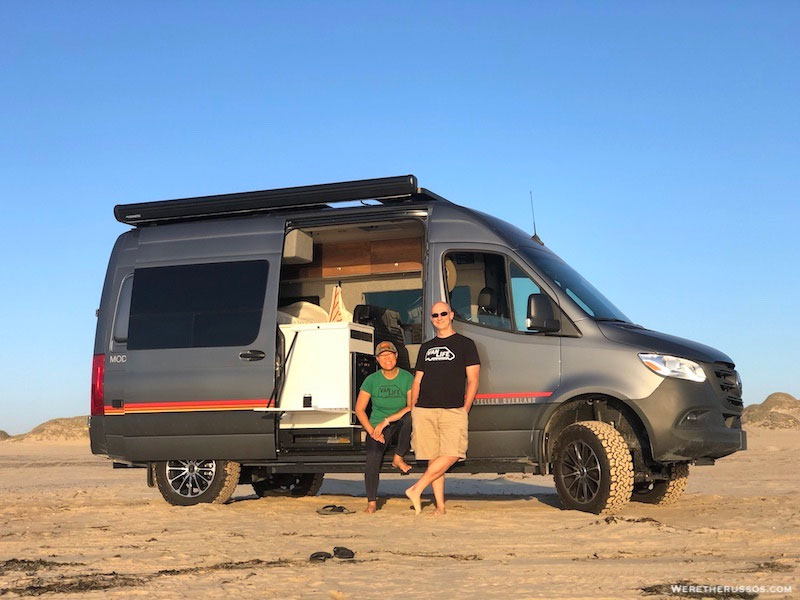
RVING RESOURCES
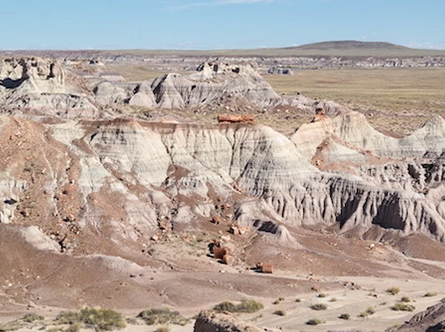
TRAVEL DESTINATIONS
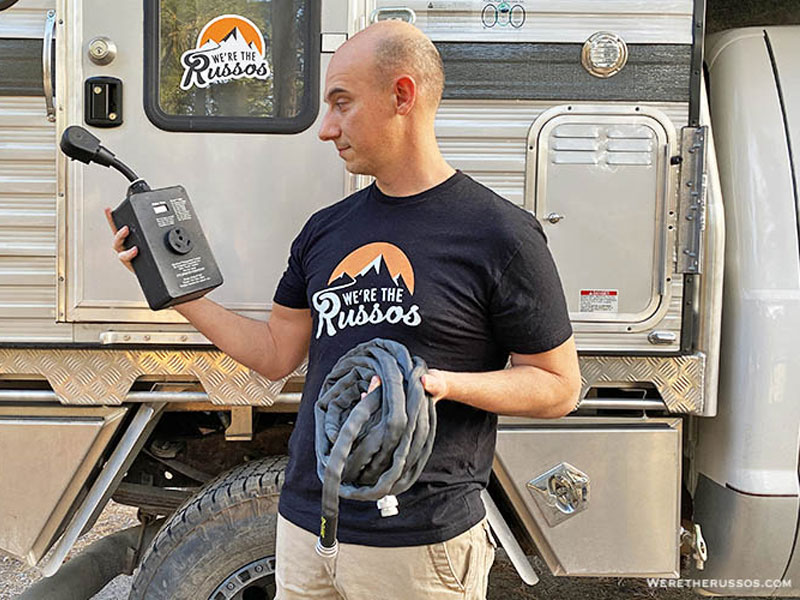
GEAR WE USE & LOVE
Subscribe to our newsletter, what’s new.
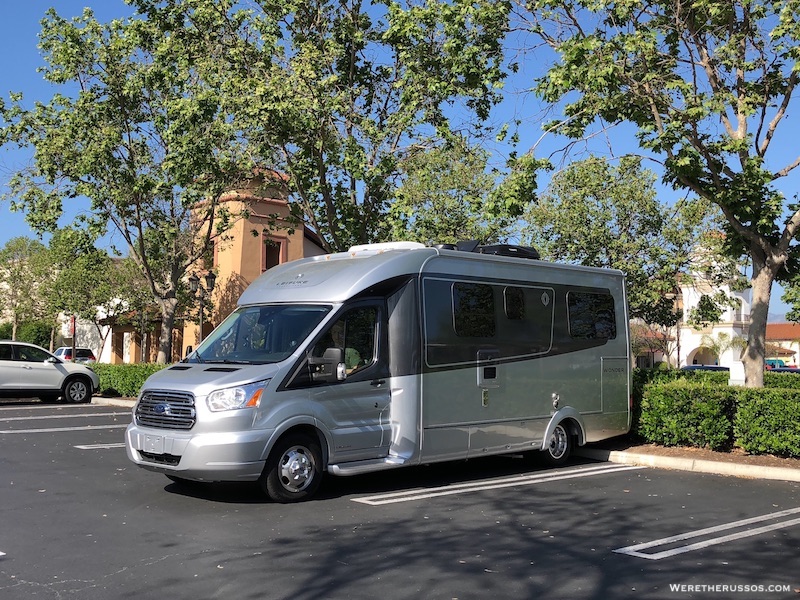
Small Class C RVs – List of Best Class C RV Manufacturers
When we were shopping for our first motorhome, I remember saying to Kait “let’s go look at some Class C RVs.” She immediately responded with a firm “no” and that was the end of that discussion. When we look back…

10 Fun Things to Do in Bend Oregon + RV Living Tips
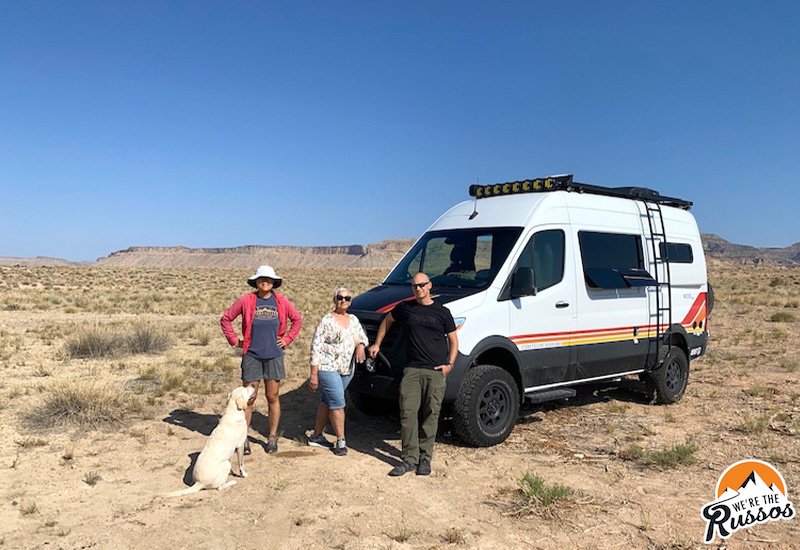
Summer with Mom Family Road Trip – Episode 16: RVing with Joe & Kait
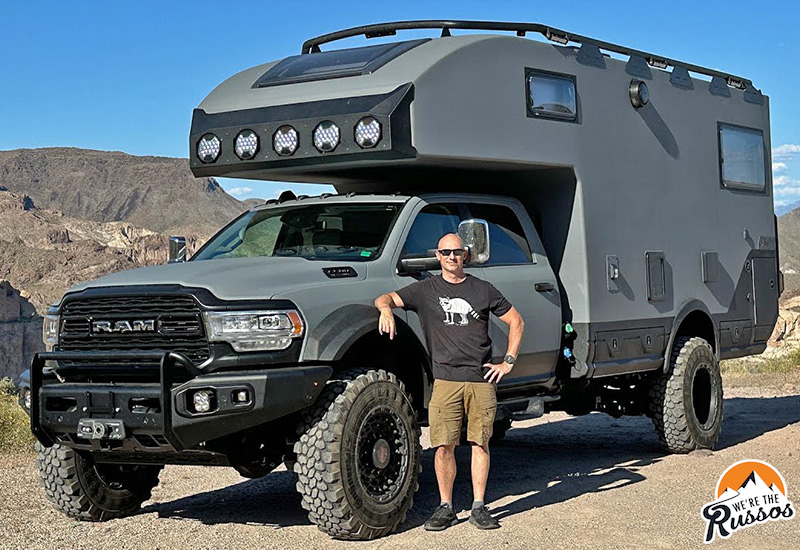
Exploring the GXV HILT by Storyteller Overland – Episode 15: RVing with Joe & Kait

7 Fun Things to Do in Sedona Arizona
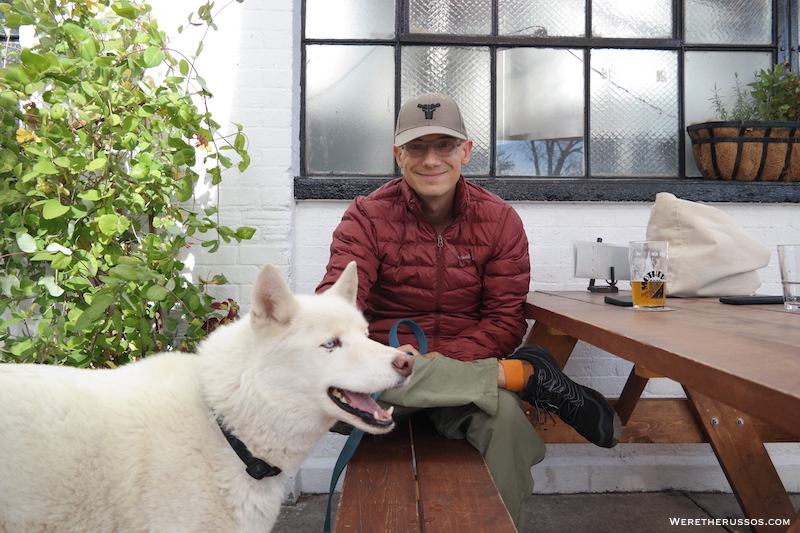
7 Fun Things to Do in Flagstaff + RV Living Tips
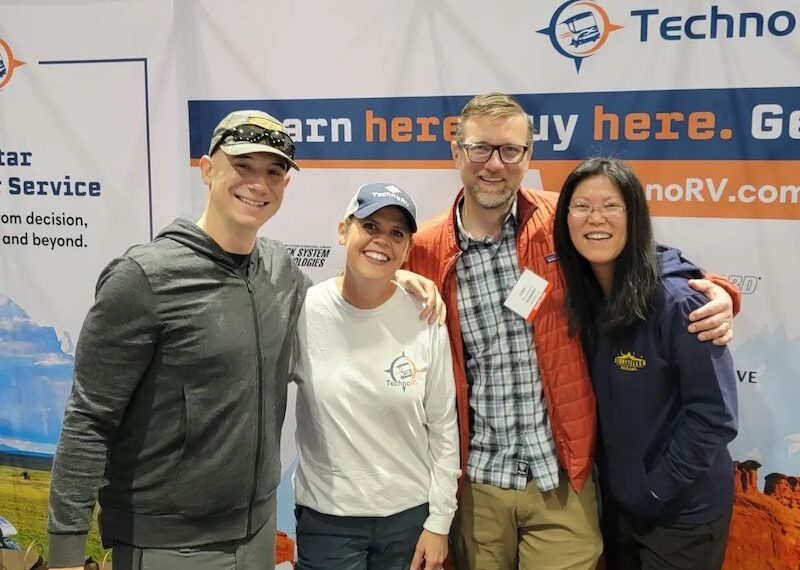
Shifting Gears: From 9-to-5 to RV Entrepreneur with Eric Johnson of TechnoRV – Episode 14: RVing with Joe & Kait
Featured videos.
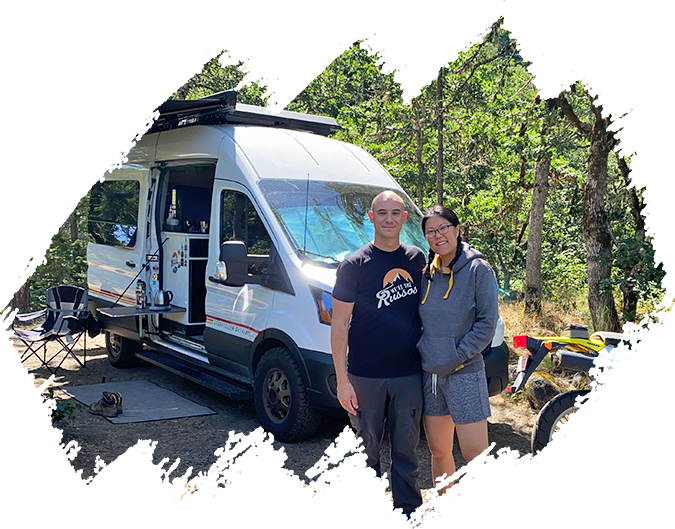
About Joe & Kait
Traveling together since 2005 and RVing since 2015, we share tips and tales from the road on this blog, aiming to inspire your unforgettable journey.

- New RVers Guide
- Travel Guide
- Campgrounds
- Boondocking
- National Parks
- Free Camping
- Essential Gear
- Cost of RVing
- One-on-One Coaching

Full Time RV Living: A Beginner’s Guide to Everything You Need to Know
This post may contain affiliate links. Read our disclosure page for full details.
Full time RV living: have you ever considered it?
In the last few years, we Two Drifters have started thinking about our future. While we want to feel settled and have a home, we also know how much we love to travel, to drift…to not stay in one place. We want to have the comforts of a home base but also have the freedom to explore other places. To us, this is the best of both worlds. So instead of buying a stationary, conventional home, it seems that living the RV lifestyle might suit us just fine.
But we’re not ready to jump in just yet. First, there will be some other steps we have to take, but in the name of research, we figured we’d start at least some of the planning and dreaming right now.
Fortunately, there are tons of awesome couples and families already living the RV life that we can learn from. These folks are doing this unique lifestyle in a variety of ways: some are living in a camper van, others are living in a motorhome, some have kids, some have pets, but all are pretty much living on the road full time. In other words, they’re living the dream! (PS: Check out some great gifts for RV lovers here !)
So, we’ve gathered a handful of them together to ask some pressing full time RVing questions. We’re total beginners (and we’re assuming if you’re reading this you likely are, too), so we started at the basics.
Where does a person even start when thinking about living in an RV? Is this an affordable lifestyle? What type of vehicle and RV do I need?
We bring to you our findings: the wisdom of some full time RVers who have been doing this from a couple months to a couple years.
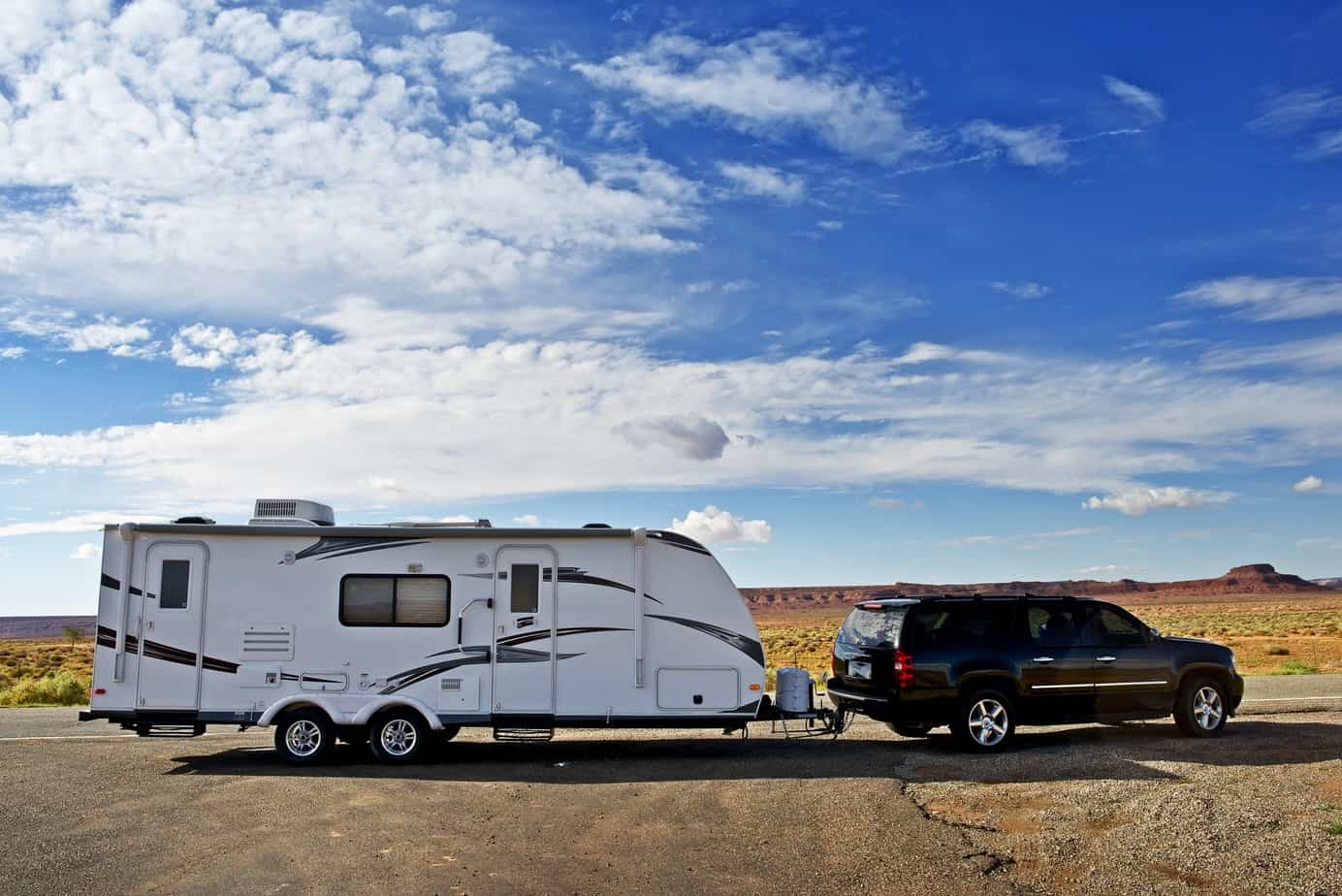
Table of Contents
Full-Time RV Living 101: A Guide
Thanks to all the current RVers who helped us put together this post!
Nathalie and Louis ( We are Cedar Stream ) – on Instagram @cedar.stream
April & family – on Instagram @twinning_in_our_5thwheel
Gwen & C.J. ( Our Little Green Adventure ) – on Instagram @littlegreenadventure
Mandy ( Wilson Grand Adventures ) – on Instagram @wilsongrandadventures
Lindsay ( Follow Your Detour )- on Instagram @follow_your_detour
Mars, Ash, & Everly ( Fite Travels ) – on Instagram @fitetravels
Brittany – on Instagram @brittsimps
Hailey & John ( Wander Winnie ) – on Instagram @wander_winnie
Megan & Brandon ( Our Wild Road ) – on Instagram @ourwildroad
Courtney ( Out of Office Family ) – on Instagram @outofofficefamily
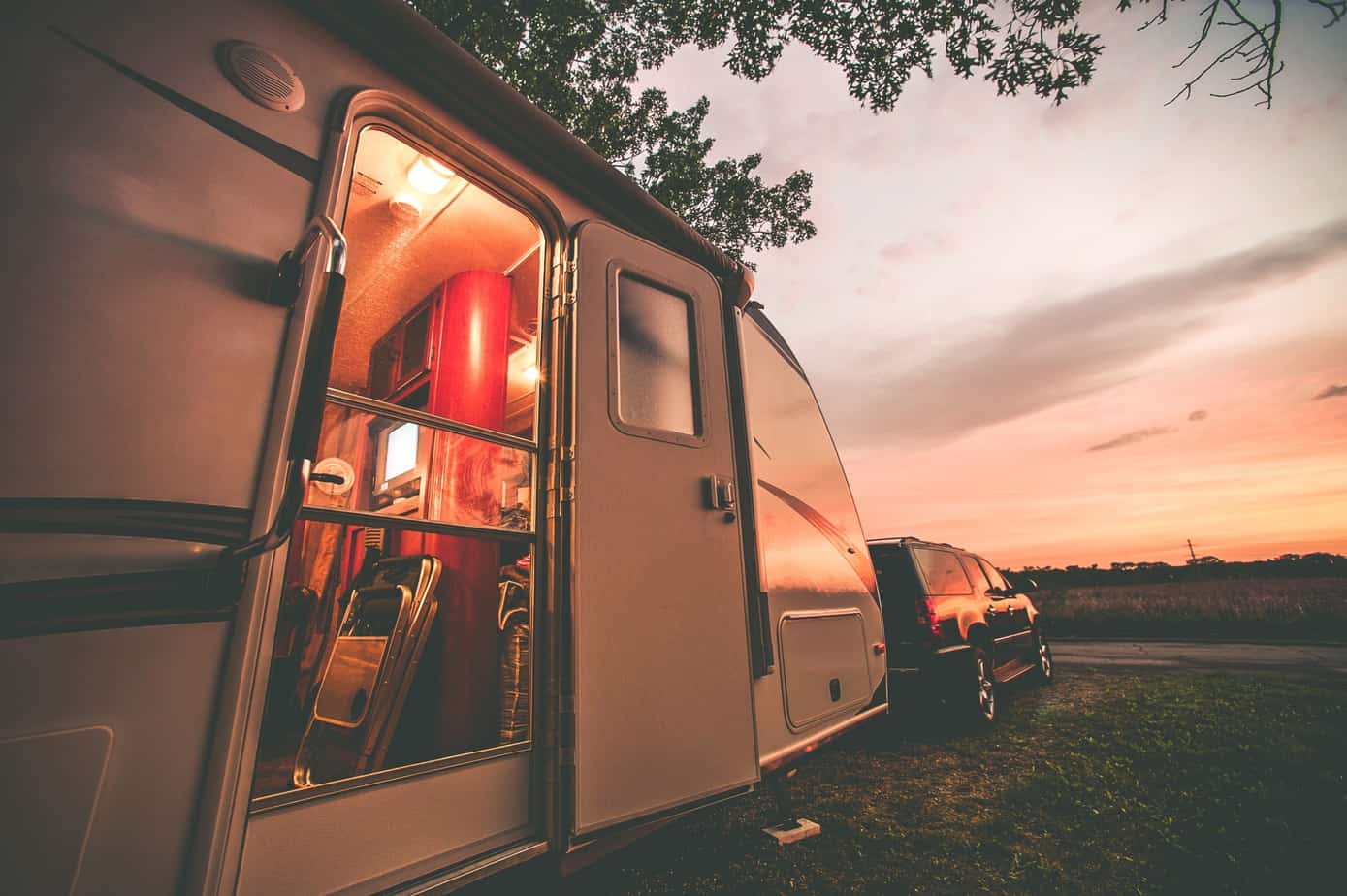
Where Do You Even Start When it Comes to RV Living?
At the start, you may have lots of questions.
Can you live in an RV legally? Can you live in a travel trailer year round? Can I live in an RV full time?
The answer to all these questions is YES.
The Initial Research – Getting Inspired
As you begin your research, you’ll probably spend a lot of time getting inspired by other RVers. Instagram is a great place like this (check out the accounts of our contributors above) as there are thousands of accounts all about that #RVLife. You’ll start to get excited browsing these images and it will give you lots of ideas as a starting point for embarking on your own full time camping life.
There is so much to learn, so start slowly and figure out your goals. Money will be an important factor of course, and may help you limit your day-dreaming and start realistically planning.
Lindsay says: We recommend first getting an idea of how much it will cost you to RV based on your goals for choosing the lifestyle. You can really make it as expensive or inexpensive as you’d like. But once you get an idea of your goals (traveling vs downsizing and saving money vs) and you get a budget together, you can then determine what RV is a good fit for those goals and the travel style that’s a good fit as well. For example, boondocking (dry camping on free land) is a great way to save money if that’s one of your goals. If you’re wanting to travel and see as many places as you can, you’ll spend more money and you’ll need an RV that accommodates that well. Basically, deciding your goals and getting a financial plan will help guide you along the decisions. Then, list off your biggest obstacles or questions and tackle them one at a time. Our greatest source of learning is just asking other RVers and searching blogs, Pinterest, and YouTube!
Check out their resource: The Most Commonly Asked Questions About Full-Time Rving
Other RVers had similar tips about research, which will help you figure out not only how to get started and which rig to choose from, but also will provide general useful RVing tips.
Ashley H. says: Honestly, I am a researcher so I spent many early mornings and late nights researching EVERYTHING. I wanted to know all of the must-haves, ways to save space and maximize that space too. I haven’t found anything just yet that I wish I knew but that may change one day. Researching everything was life-saving!
Mars, Ash, and Everly say : The best advice we could give to anyone would be to really take time to ask yourself what you want in every area of your life. Take the time to get specific and ask yourself the questions that might make you feel uneasy. We took about six weeks to focus on creating a vision for our lives, and it has paid off in so many ways. It’s helped us to know when to say yes and when to say no. It’s given us motivation and purpose and passion. Whether you want to live in a RV full time or just experience more freedom or control over your life, creating a super clear vision is imperative to living out your dream life.
Hailey and John say: Choose a rig and go from there. For us being easily navigable was our first priority, second priority was a good amount of space. (so small….but not too small…haha) Think about your NEEDS, what does your life require you to bring? Do you want to tow a car? Do you want to invest in a large vehicle capable of towing? Etc! Second thing is to think about BUDGET. We did NOT want to finance a vehicle…we were trying to escape being tied down to debt by living on the road! For us saving a little money and paying cash on a fixer-upper was the way to go.
Getting Rid of Debt & Downsizing
As you’re dreaming and planning, you can start taking other steps to prepare yourself for the full-time RV lifestyle.
Megan and Brandon say: The first recommendation is not to overthink it, and just do it! But it’s definitely a process to transition into the lifestyle. Our first step was paying off all our debt and lowering our monthly bills to next to nothing. Like most people, we had car payments, medical bills, student loans, etc. We got rid of it all before we went on the road. Then, start getting rid of all your stuff. We put some things in storage but we’re going to end up selling it all. It’s SO NICE to not have stuff holding you back.
How to Pick the Best RV to Live in Full Time
What is the best travel trailer for full time living? Which is the best RV for full time family living? What’s the best fifth wheel for full time living? What is the best motorhome to live in full time?
So many questions! Perhaps the most crucial step in the process is selecting your rig. Obviously, this decision is going to vary greatly depending on your lifestyle, your family size, your budget, your desires/needs, and much more. Plus, you’ll be deciding between the various vehicle options and setups and even investigating brands of RV and motorhome.
This article can serve as a starting point for your RV vehicle research. To lay out some of the pros and cons of the various options, check out the responses below. The end results for each family are very diverse.
What Kind of Setup Do You Need for RV Living?
What’s the best setup for RVing full time or even part-time? Is it better to have a motorhome or a vehicle-tow situation? Why?
Nathalie and Louis say: We have a 1969 Airstream Globetrotter. The Globetrotter model was created for traveling the world, even in places with rough road conditions. It’s only 20 ft. long and has high ground clearance. We love this because we get to camp in the coolest places, our little house fits places other trailers don’t. What type of home on wheels you have is personal preference, so I can only speak for us and our opinions. In a full time situation, we will always choose having a truck and trailer. Our biggest reason is vehicle maintenance. If our truck has a problem we can drop our trailer somewhere and keep living in it, while the truck is getting fixed. If it’s unrepairable, we get a new one and we didn’t lose our home. That’s not the case with a van or motorhome. We don’t ever want to be in a situation where we are living in a shop parking lot (best case scenario), paying for an extended hotel stay, or losing our home due to expensive mechanical issues. We would consider other options, if we weren’t full time. There are some awesome camper vans out there that inspire us.
Jen and Dustin say: We have a Cherokee Arctic Wolf 295 QSL8 5th Wheel. We invested in a 5th wheel for one major reason: it feels more like a home than any other model. Ours has a full kitchen, bathroom, bedroom, etc. and the main living areas have high ceilings. I would never have been on board with a van, class A/B/C etc. because they feel so cramped, and it just wouldn’t work for our lifestyle.
Hailey and John say: We have a 1991 Winnebago Micro warrior. It has a v6 Toyota Engine that is super fuel efficient and reliable! Being only 21’ long we are just a little bigger than a normal parking space, PLUS we won’t miss out on any beautiful roads because of ‘length restrictions.’ Our little rig also has a full bathroom, kitchen, dining area, sofa, and full size bed!
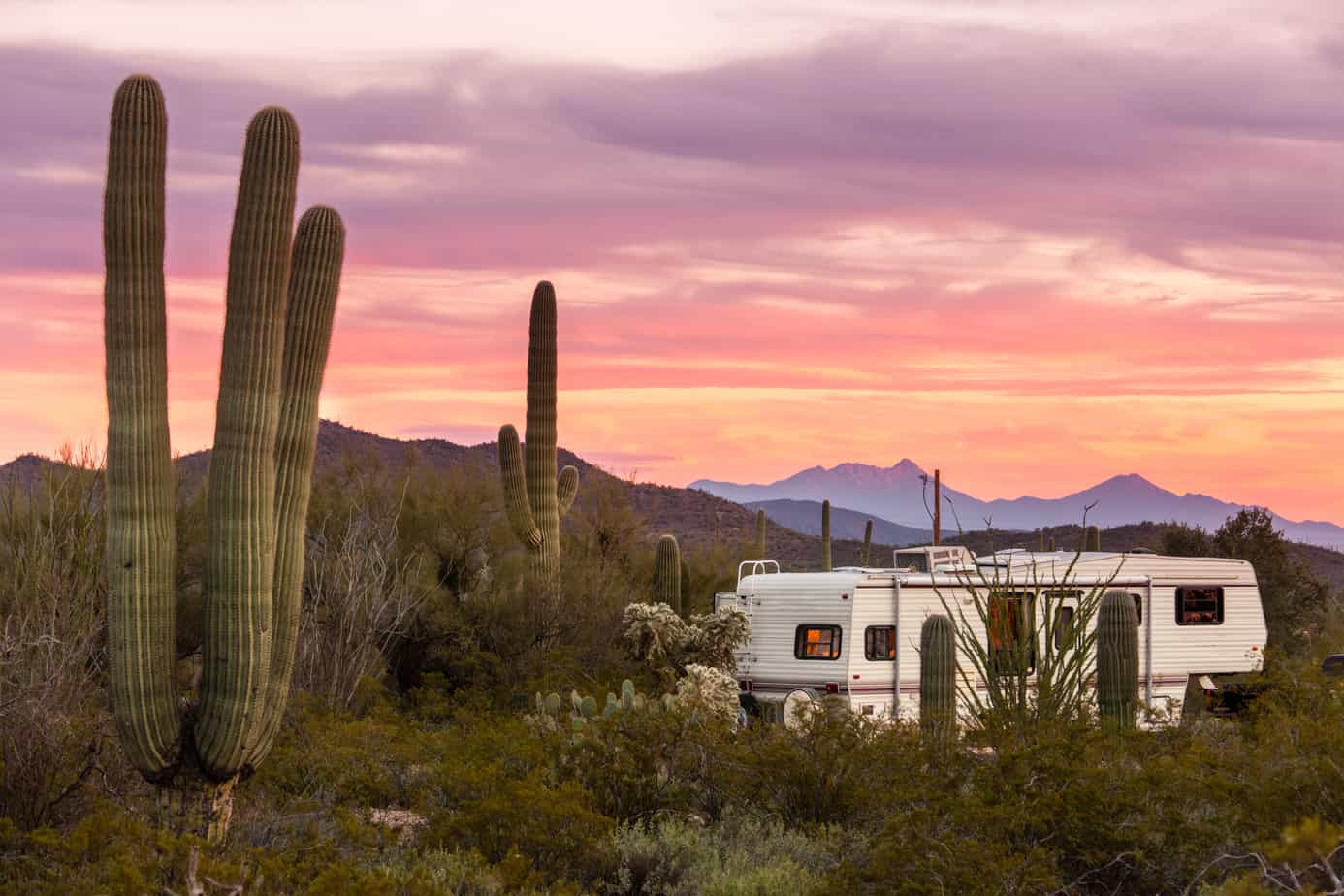
Lindsay says: We have a 2018 Winnebago Navion 24 D class C motorhome and we tow a Jeep Wrangler behind it. Benefits are that it’s only 25 feet long, making it super easy to navigate and park. We can fit almost anywhere, including parking downtown in busy cities! Weused to tow a 30 foot fifth-wheel and the motorhome is also much easier to just “hop in and go”. We don’t have to worry about hitching up! We also love that on travel days, we have access to our kitchen and bathroom…actually, our whole house. We don’t have to stop for lunch or to use the restroom. In fact, we take turns driving and working since the passenger can sit at our dinette and work and even have a seatbelt. Efficiency I tell you!
April says: I have a Keystone Montana 3295RK (2005) I love this type because Keystone makes quality RV’s. Ours is a 5th wheel so the ceiling height makes the rig feel larger. Ours is also equipped with an aluminum frame so it’s all weather which is nice as well.
Brittany says: We have a 2004 Fleetwood Terry 320BDHS. It’s light and it only has one slide out. We chose a travel trailer over a fifth wheel because we already had everything we needed to pull vs finding a new vehicle (or renting a vehicle) with the fifth wheel hitch. We also have three small children that are all in car seats so we opted out of buying a motor home because we didn’t want to have to figure out the car seat situation while traveling.
Gwen & CJ say: We drive our 32’ Class C RV and tow a Jeep Wrangler behind. In our opinion, either having a motorhome with a tow vehicle, or a truck pulling a camper is ideal. Reason being, if you get to a spot you’re intending to stay at for a long period of time, its nice to be able to set up more of a home base in your trailer- Putting out your camping chairs, being able to have a vase of flowers out, etc, etc, and not having to pack everything up the moment you want to go anywhere. Having another vehicle to explore the area in can be incredibly helpful. The second reason is if you’re looking at a bigger rig, driving it down to a coffee shop and maneuvering it through smaller parking lots can be a challenge. Once again, having another vehicle can be very helpful.
Mandy says: We have a 2000 Class A – Damon Challenger 305. It’s 35 foot with one super slide. This model had the criteria we were looking for in buying a motorhome; lots of storage, layout that we could convert an area into bunks for our two kids, engine strong enough to tow a Chevy Traverse weighing 4,900 pounds, a layout we could renovate and call home. This is our first motorhome and we have been very pleased with the model, layout, power and layout for our renovated house of wheels. We also love the fact that we don’t have to pull over to grab snacks!
Do you need a truck to tow an RV? What kind?
Jen and Dustin say: YES. Without getting super technical, you need a truck with a towing capacity so that you can safely tow whatever you purchase. Do your research, and don’t trust what the dealerships tell you. Our rig is advertised as “half-ton towable”. However, if you’re living in it full-time your trailer you’re going to have a LOT of extra weight. We purchased a RAM 2500 that came with a tow package for our 5th wheel (it’s considered a ¾ ton). We feel that it handles our 34 foot trailer well, and never worry about losing control.
Ashley H says: It really depends on what type of RV you have to figure out what vehicle you need. My husband has a F-150 that hauls ours completely fine and could probably go a little larger in size too but if we ever switched to a 40+ FT he would need an F-250 for sure! Even though we have yet to test it out my Toyota Sienna minivan is actually fully equipped to haul travel trailers smaller in size!
Where Can You Stay in Your RV?
Where can I park my RV long term? Where can I park my RV to live?
Maybe one of the biggest mysteries about living on the road in an RV is where families park their rig. Well, just as there are many options to choose from when it comes to travel trailers and setups, there are also plenty of alternatives for where you’ll stay. But, no matter where you go, as they say, “home is where you park it.”
Many RVers prefer a more off-the-grid lifestyle.
Nathalie and Louis say: We are full time boondockers. This means our trailer is self-contained and we live off grid 365 days a year. We love finding rural spots and feeling so small and alone in this big, beautiful world.
Gwen & CJ say: We outfitted our RV to boondock most of the time, meaning we find government owned land (often BLM land) and camp there without hookups. You can camp for free on BLM land for up to 14 days. We love to stay out in wide open spaces, surrounded by nature rather than side by side other RV’s in an RV park.
Megan and Brandon say : We boondock exclusively, so we do not pay for camping. We utilize Campendium and freecampsites.net , and even Google Maps, to find public lands to camp on. We mainly camp in Utah, Arizona, and New Mexico. So far we have stayed on some gorgeous land.
Others living full time on the road prefer more organized amenities and civilization:
Jen & Dustin say: RV Parks or “resorts” with at least a 4 star rating, a dog park and full hookups. I, Jen, do extensive research and read Google reviews, and utilize other websites to make sure we are going to a safe area. We only do monthly stays (way more affordable than daily or weekly rates) so obviously the park has to offer those as well.
Ashley H says: We choose to stay at RV parks that have several amenities for our kids. Swimming pools that are heated, outdoor fishing lakes, laundromats, clubhouses with games or conference centers and monthly activities.
And other families do a bit of both:
Lindsay says: Anywhere and everywhere. We’ve gone from busy cities like Washington D.C. and San Francisco to wide open spaces in national parks. There’s honestly nowhere you can’t drive an RV…well except overseas! We’ve street parked discretely in the city, we’ve boondocked on BLM and forest land and even right on the beach. We’ve also treated ourselves to luxury RVs. There’s something for everyone, even the glampers! We like to mix it up and it really depends on the destination and what it offers.
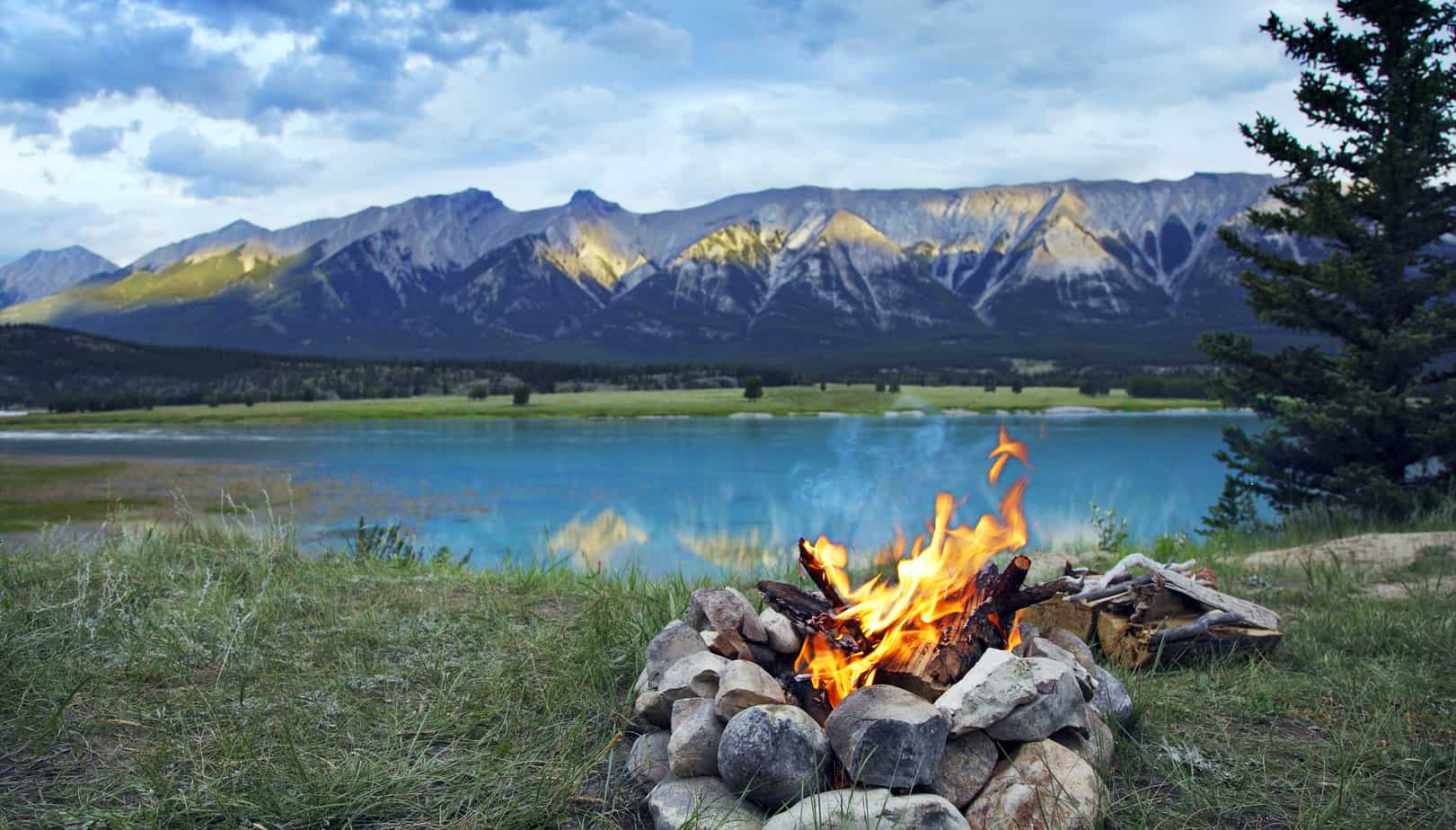
Visiting Family and Friends
One of the benefits of having a truly mobile home is that you can more easily visit family and friends. What we’ve always wondered is how feasible it is to just park in a family member’s driveway in your RV. Is this possible? It seems it’s not as simple as rolling up and putting down stakes wherever you’d like. There may be more research needed.
Gwen & CJ say: If you are looking to visit family or friends in a city or suburb, you should check the local laws and with the local Home Owners Association(HOA). Different neighborhoods across the US will have different HOA zoning rules that dictate if/where you can park your RV and for how long. C.J.’s family lives in a suburban area outside of Dallas and we are only allowed to street park there between Thanksgiving and New Years Day. Gwen’s family lives out in the country so parking there is always an option for us.
Mandy says : Yes! We have done this several times. If you fit and there’s no restrictions, you can park on their property. You will need to know if they have RV hookups or not. If not, you won’t be able to plug in. If family or friends do not have either a 30amp/50amp plug you can always purchase a converter to plug in your RV. Just keep in mind that when converting to a house 15 amp plug, I would only recommend using it for charging your house batteries or refrigerator but not recommended for running your AC or microwave as it will be too much power.
Lindsay says: We park in Dan’s parents’ driveway all the time and my mom’s neighborhood allows it on the street for a few days as well. It’s nice to have your own home and space with you rather than staying in guest bedrooms. So we “moochdock” (park on family and friends property) as often as possible. Otherwise, you can find RV parks and campgrounds that will allow you to park overnight for a small fee. Or, there’s always Walmart and if you feel comfortable you can leave your RV in their parking lot overnight if you’d rather stay with family. But that’s only for one night. If we’re staying for longer periods, we just pay to store the RV somewhere and it’s not usually over $100 a month.
Ashley H says: We haven’t crossed this bridge just yet but I think this is going to depend on the length of the stay and who you are visiting. My in-laws live on unrestricted acreage so we can park it there and have no issues. My parents and sister/brother in law live in the suburbs with HOA enforced. If it is just a quick visit I think parking it in the driveway may be doable but for longer visits we will most likely leave it parked at the RV campground and drive our vehicle to physically stay in their home.
What is the Cost of Full Time RV Living?
One of the biggest considerations when it comes to motorhome living for beginners has to be budget. Does living in an RV full time cost as much as living in a traditional home? How much does it cost to RV full time? Are there ways to save money on the cost of full time RVing ?
Overall, it seems that this lifestyle offers the opportunity to live more affordably.
Nathalie and Louis say: This lifestyle is absolutely affordable! Our total monthly expenses are equivalent to the rent of a two bedroom apartment, in both of the places we are from. We are fully off grid and that keeps our cost of living minimal. The cash up front is an investment, but it has paid for itself multiple times over.
April says: I definitely feel that this is more affordable and more empowering because you own your own home, and that feels great. A lot of times park rent is much cheaper than rent In our case, we were paying over $2,000 a month on rent and utilities and now we dont even pay $1,000.
Ashley H says: I think this question is going to honestly vary for everyone. I know living in an RV will present its challenges and expenses but in our case it’s substantially less and does save us quite a bit of money. We lost the mortgage expense, HOA fees, lawncare, cable, security, internet and so many other frivolous things we were used to paying living in a suburbs home of almost 3000 sq ft.
Mars, Ash, and Everly say: I definitely think it can be [affordable]. We travel A LOT, so we spend a lot on gas, which often brings our monthly vehicle/gas payment up to the cost of what it was living in a house with bills. However, we no longer have our two car payments. Also, we often opt out of staying in a hotel on the road. Our jobs put us on the road, so before having our van, we often spent money staying in hotels. Living in a van has made life a lot simpler. I have limited space to collect things. I don’t go on shopping sprees. It makes it easier to say no when I see cute things I want to decorate with because where would I put it? It’s made me recognize that I have more than enough, and I don’t need to buy anything else.
Kirs & Dev say: Yes! Nashville rent is around $1,500-2,500 for one bedroom. I pay $600 monthly with electric included.
Lindsay says: Absolutely! It can be super affordable if you’re willing to make some sacrifices. There are tons of ways to save money on the road like free parking, cooking in, utilizing RV memberships, traveling less often to save on gas, etc. But overall, you buy less since you have less space and avoid monthly bills like cable, trash, utilities, and the costs of maintaining a house.
Hailey and John say: SO FAR YES! We are parking for free as much as possible and budgeting $1,000 a month on average.
But sometimes, the costs do add up, too.
Dustin & Jen say : I wish I had known what the expenses were going to be. So many people were like “just boondock everywhere! The RV lifestyle is so cheap and affordable!”. However, my job depends on phone reception and internet connection. Oh, and we NEEDED electricity without depending on generators every day. Boondocking just wasn’t going to work for us. We did research on the cost of RV parks—but only for certain regions. We’ve been primarily in the Southwest since living full- time, and had no idea that we were looking at $700+ a month on the low end PLUS the payment for our 5th wheel. It’s just as expensive as apartment living sometimes! We stayed in Vegas for the month of January and it was SO COLD! We spent over $300 on propane just to heat our rig, shower, cook, etc.—and that was also having an electric fireplace!
Courtney says: It all depends entirely on how you travel and what types of places you are comfortable staying. If you want a giant new rig, only want to stay at RV resorts with all the amenities and move around once a week, it may not be less expensive than your life in a sticks & bricks. However, if you end up with a more budget-conscious rig, move less often and are open to boondocking, it can definitely be less expensive.
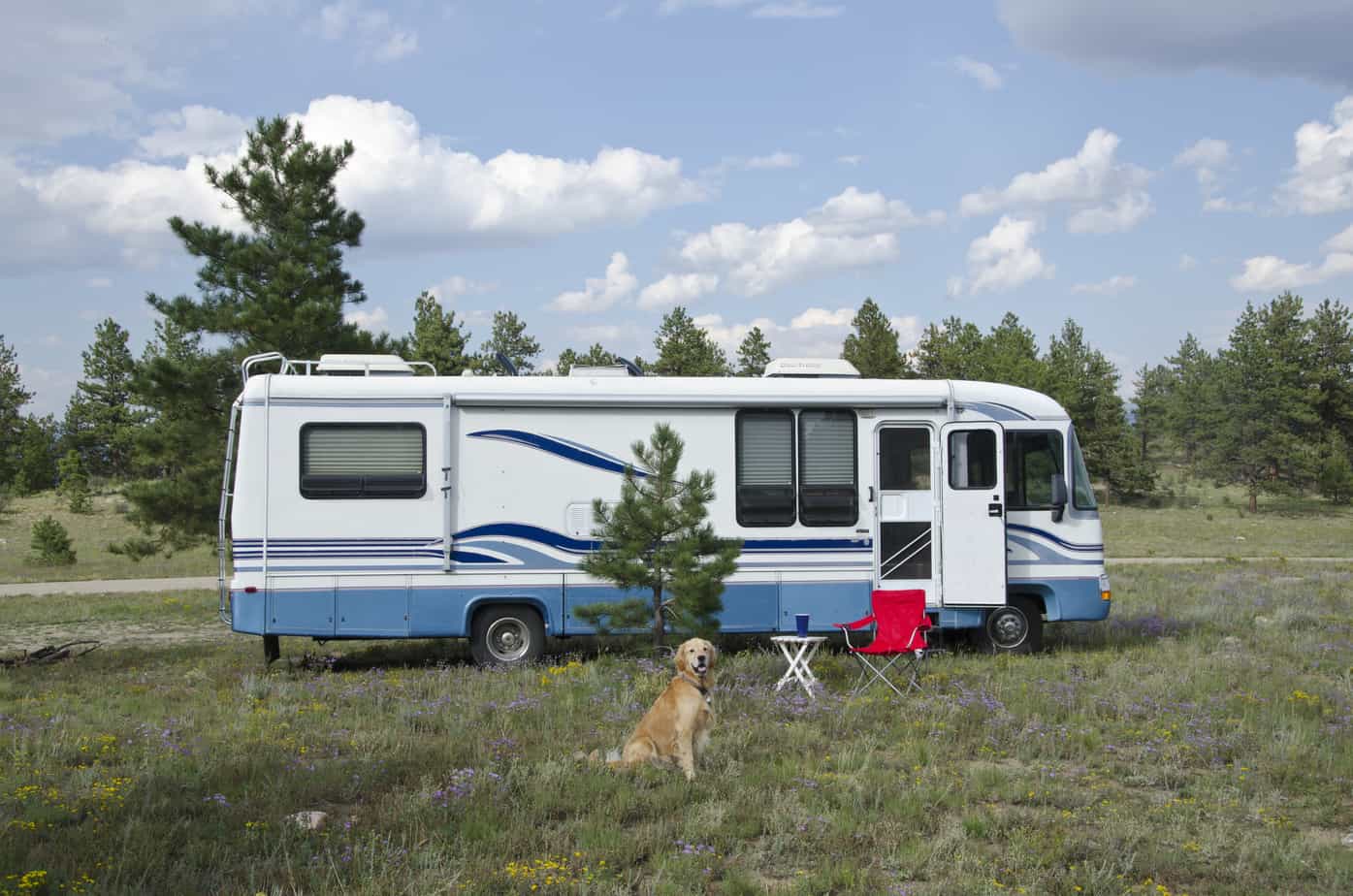
RVing with Pets
Many people who embrace living in a camper full time seem to also be animal lovers, like us. With plans to get a dog of our own this summer (yay!) we wanted to know for the future what the challenges of full time RV living with pets might be. RVing with dogs seems to be a great thing, but certainly must present its fair share of obstacles.
Nathalie and Louis say: We love having our dog with us everywhere we go, but it does have a few challenges. Most national parks don’t allow pets, so we end up skipping the lengthy hikes and just spend a couple hours driving around the park, checking out easily accessible spots, while the dog waits in the car. This may sound very limiting to some, but since we can’t go to the popular places, we find other trails just outside the parks. We have found incredible hidden gems, ones we never would have sought out, had our dog not made us think outside the box. Our dog gives us more opportunities than limitations, I love traveling with our pup.
Jen & Dustin say: We have a golden retriever, so we do whatever we can to stay at places that have dog parks in them or are close to dog parks. If it doesn’t have a dog park, we try and find out if there are grassy areas dogs are allowed on. Our dog is VERY social, and meeting new dogs and people everywhere we go has been a huge plus of fulltime RV living.
Ashley H. says: We have two dogs and making sure they had their own space was important. We invested in a large metal dog crate to put on our RV pad with faux turf giving them a feel of a yard to be outside during the day and coming it to sleep at night. This is how the set up was when we were home, therefore nothing really changed for living in the RV. We take them anytime we go to a food truck as well to get them out and allow them to have that time with us. We also find RV parks that have dog parks or dog walking stations which helps too!
Gwen & C J say: We travel with our two dogs and our cat. Temperature control in hot weather is the biggest challenge we face. Because we boondock 99% of the time, we don’t have an external power source to plug our RV into to be able to run our air conditioning unit, (which doesn’t work too well anyway.) So we rely on our solar to power fans throughout the house. On super hot days, we don’t leave the pets in the RV alone. The other challenge we face is that most National Parks have very strict rules on where you can bring your dogs. Because of this, we are unable to camp inside of some national parks.
Lindsay says: Our dogs have adjusted really well. We try to get them out of the RV as much as possible so they don’t feel too cooped up. They get more exercise than they did when we lived in a house or apartment. We can usually bring them along on our adventures since we love to hike and walk around downtown and sit on patios. Lots of cities are very dog-friendly , which is great. National parks, however, aren’t and most do not allow dogs on trails. This presents a challenge when we want to explore and the weather is hot during the summer. We have to ensure we are hooked up to electricity to leave the air conditioning on. Even then, we always worry about losing power or the A/C going out and us not knowing and being gone. We put a sign on our door that says “Dogs on board, call ____ in the case of an emergency”. Having a fire or something happening to us while we are out and the dogs being stuck inside is my biggest fear so I take every precaution. There are pet monitors that are super helpful and allow you to watch your dog from a camera in the RV and your cell phone. But overall, we’ve never had any issues! They make the travel even more fun for us and we love having them tag along.
Full Time RV Living with Kids
What about living in a camper with kids?
This is something Nathan and I definitely wonder about. Since we’re not yet parents, we are curious about how families with kids and babies do life on the road. There are many questions, such as how a whole family can fit in an RV, how do the kids attend school when living in an RV, and more.
Well, it turns out there are, as usual, options. Many parents choose to homeschool or “road school” their school-aged children, which is really amazing. Others live in RVs that are more stationary, so the kids are able to attend a traditional school. Let’s look closer at the challenges from our RVing families:
Brittany says: When it comes to RV living & schooling I see a lot of homeschool families, which is so incredible! Because we are stationary we chose to keep our kids in public school & do most of our traveling on weekends and during the summer. Although I will admit, the perks of homeschooling are becoming more & more appealing.
Ash and Mars say: We have a four-year-old daughter, Everly. Currently, we are homeschooling her. Life on the road has made homeschooling really fun. We are always in new places, discovering new things! We apply real-life situations to her learning. We have to work as a team when we are on the road, and she is a part of our decisions and day-to-day living.
As for considerations of living in a smaller space with children:
Ashley F. says: I did a ton of research so I wanted to create a space for the kids that allowed my husband and I to still have our privacy and be able to keep them content in their own room as well. We renovated our RV and make a custom “kids suite” with 4 bunk beds, pull out storage drawers, a play/desk area, their own TV, black out blinds AND a thick “sound proof” door as well.
And of course there are challenges:
Ash, Mars, and Everly say: In particular, finding other families on the road is difficult. Social media has been incredibly helpful actually, we’ve met and made some pretty great friends thanks to finding like-minded people on social platforms. Our daughter is an extrovert through and through and loves being around other kids. We make it a priority to find friends for her to play with. It’s allowed us to help her gain the confidence to walk up to kids she doesn’t know and tell them her name and ask them to play. She’s become really amazing at making instant friends with people from all over
Courtney says: Lack of regular socialization. Sometimes we can go weeks without there being other kids for them to play with. That can be really tough on our four-year old, whose #1 priority in life is having friends to play with. Saying good-bye to friends we make on the road is really tough as well. Sometimes we know we might not ever see them again and that can be difficult to explain to small kids.
Renovating Your RV
While you can certainly buy a motorhome or camper that is brand new and outfitted with all the bells and whistles you desire, that is a costly endeavor. Instead, you might opt for an older model of travel trailer and do a bit of DIY RV renovation like many of our contributors did.
And even a new RV might require some remodeling and updates.
Jen & Dustin say: People thought we were crazy when we purchased a brand new 5th wheel and decided to remodel it…but we couldn’t live with all-brown-everything! I grew up working on construction projects with my Dad, so everything we did I had some experience in. The biggest difference in our RV was made by removing the valances and just painting nearly everything white. It’s something anyone can do! I also follow @RVFixerUpper @prvbsthirtyonegirl on Instagram and they are always posting DIY’s to help! We also reached out to friends and family to help with something they had experience with (we either paid them or fed them for their services haha). Also, Heathandalyssa.com were instrumental in our decision to do this in the first place!
Ashley H. says: We renovated the RV entirely. Our RV was old and everything was original. We painted, did peel and stick wallpaper, faux shiplap, new appliances, custom built the kids “suite” and popped in an incredible sleeper sofa with memory gel foam mattress from affirm. I wanted to give our RV a fresh look while making it cozy the way our homes always feel.
Gwen & CJ say: We renovated nearly everything in our RV. The only things still there from the original design are the cabinets (with a fresh coat of paint), the toilet & shower, and the cab. Along with renovating the interior, we painted the exterior and converted our rig to solar power to allow us to dry camp. We learned pretty much everything from Youtube, blogs, and trial and error.
Hailey and John say: YES. ALL OF IT. We GUTTED our RV and spent 8 months repairing and rebuilding. We rebuilt the cabover sleeping bunk and rear wall completely. We gutted the kitchen and bathroom and put in new counters, faucets and backsplashes. The entire thing including all cabinets has been repainted + new vinyl flooring installed. I sewed curtains and seat cushions. We resealed all exterior compartments and corner trims. WE HAVE TOUCHED EVERY INCH OF THIS THING. I like to think we were the perfect team on this project. I researched all RV related repairs (what sealants to use, what to buy) and John helped bring it all to life with the tools and muscle. Then when we got to the interior after the building portion was complete, I took over with the paint, fixtures, electrical, decor and textiles. Youtube and the Toyota Motorhome facebook groups have been our main sources of info.
Nathalie and Louis say : We fully gutted our Airstream and did a frame up renovation. Louis is a carpenter, so we were fortunate to have the tools and knowledge to build our tiny home. Everything was custom built to maximize our space and have storage in every spot possible. Our house is perfect for us and I’m thrilled with how it turned out.
April says: Yes we renovated everything ourself. We painted everything, ripped out a lot of cabinets and carpet and linoleum and replaced the floors with vinyl wood planks, and we are in the process of renovating our bathroom too.
Mandy says: Yes. We renovated our entire RV. This was something that was a priority for me as I don’t enjoy the décor of RVs. We have done lots of renovations on our home for over 10 years and that’s really how we got started. This was our first RV so it was a different learning curve. We painted the outside, turned a closet into bunk beds for the kids, removed a dinette and replaced it with bar-style seating, then removed the passenger seat and turned it into a sectional style couch. All new bedding, blankets, pillows, and décor items were added.
Working on the Road – Full Time RV Jobs
It’s one thing to live on the road full time, but how do you manage to earn an income? How do people living this lifestyle work while traveling or living in an RV? And perhaps most important of all, wow does one get WiFi?
CJ & Gwen say: Being web designers, having internet connection is incredibly important. Because of this, we traded our cable and internet bills for an upgraded cell phone data plan and a hotspot. Most day to day tasks can be handled using our hotspots and a cell phone booster. When needed, if our signal isn’t strong enough or we have to upload a large amount of files, we take the jeep out to the nearest establishment with WiFi and work from there for a few hours.
Mandy says: We have a JetPack from Verizon. We chose the MiFi 8800L model because it has the most up to date technology and allows up to 15 devices to be connected at once with a prepaid unlimited data plan. We have been able to use the internet on the road, at the beach, at friend’s homes, anywhere. You just need Verizon 4G service.
Ashley H. says: So far the RV parks are all equipped with wifi but if we ever choose to boondock we will want to invest in something to help us with internet. They have plenty of options out there that cost roughly $500-$700 for something really good and I have heard they work wonders!
Dustin and Jen say: We use Verizon Above Unlimited & a cell booster. Each of our cell phones gets 75GB of streaming data (think watching Hulu or Netflix) and 20GB of Hotspot data (we use for work computers). We also have a MiFi device with 20GB of Hotspot data. All in all, if we are in areas with cell phone reception, our internet is covered!
Lindsay says: We have a dedicated hotspot with unlimited data from AT&T, and use our cell phones from Verizon as a backup. This works great for us because we find that between these two carriers, we can normally get a decent signal. We typically don’t have problems staying connecting, but there have definitely been times where we were unable to stay at a certain spot because of the lack of signal – we find this to be common in National Parks. Many RV parks and campgrounds offer free WiFi when you stay with them. However, the WiFi can be pretty spotty at most parks, especially when the park is full. If worse comes to worse, you can always find coffee shops, libraries, and other businesses who offer WiFi. We recently got a WeBoost to improve the strength and speed of our cellular data and we couldn’t be more happy with it. At one particular campground, we had zero service and couldn’t even check our email from our phones, but after connecting the WeBoost, we were able to stream a movie!! The basic idea with the WeBoost is that you install a special, high power antenna which allows your devices to connect to a stronger, more reliable signal.
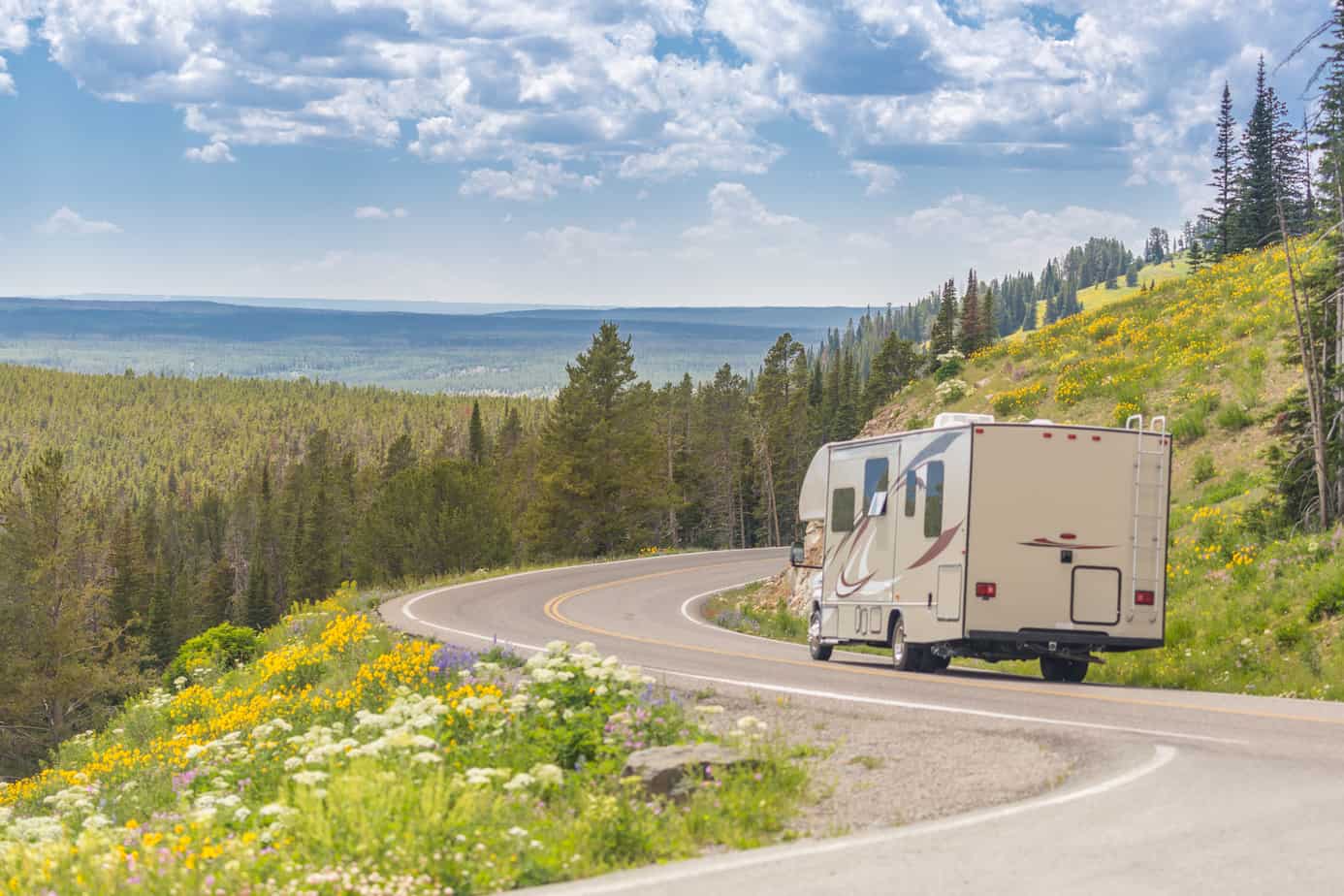
Challenges of RV Living
Finally, let’s break it down with some helpful full time RV living tips. There are going to be difficulties with this unconventional way of living, but that’s ok.
Brittany says: Expect to always be in someone’s way! As a family of five, we’ve had to learn to communicate better when it comes to moving & navigating through the camper (something you rarely ever do in a stocks & bricks home). Although this has been a huge obstacle for us, it’s also brought us so much closer as a family.
Courtney says: We wish there was a hands-on, crash course on RV maintenance we could have taken prior to getting on the road. We had never even camped as a family–let alone ever done anything in a RV– before we purchased one and hit the road. We definitely didn’t know as much as we wish we would have about maintaining our home on wheels and that has resulted in some issues during the year that could have possibly been prevented.
Lindsay says: We miss being plugged into and involved in a community. We can’t volunteer at church anymore or do certain hobbies, such as Brazilian Jui Jitsu in Dan’s case. It can also be challenging to balance feeling like you’re on vacation and reality. We’re constantly having to be aware of our budget and being careful not to overspend while in new and exciting locations. Also, when you work from the road, it’s tough to find a routine and schedule that keeps you productive. We’re always tempted to go explore the destination we’re in and procrastinate on work. And of course, we always miss our friends and family from home!
Kirs & Dev say: Everything breaks all the time. There is always something that needs to be fixed. New or old, comes with the RV life.
Driving your rig, especially for the first time can be one of those challenges, too.
Mandy says: Anything you do for the first time is a little nerve racking. Especially when you are used to driving a 4-door sedan or small SUV. The first time I drove a motorhome was the day we left the lot after paying for it. Honestly, after the initial shock of being so high off the ground, how wide and long a 35′ motorhome is and how to operate it, it really isn’t difficult to drive. I now prefer driving the motorhome because of the amazing view from behind the wheel.
Dustin and Jen say: Dustin would say yes! Mostly because you can’t just drive on auto—you have to be aware of everything going on around you, make sure your tires are at the correct pressure, your trailer is hitched correctly, and constantly be watching the weather. You don’t want to be driving when it’s too windy or you could tip your rig and crash. It helps if you have a truck you are confident in.
Advice for Future Full Time RVers
Gwen & CJ say: This lifestyle isn’t necessarily easy, but it is incredibly rewarding. There will be times in the first few months of your adventure that you may take a step back and wonder what the heck you were thinking. Know that no two full-timers have the same journey. You will encounter your own obstacles, your own mistakes, and your own wondrous surprises. Even if you don’t know how to do something right now, trust in yourself, that you will figure it out, that your life experiences have prepared you for this journey. And know that the challenges you overcome will bring you a sense of great accomplishment and gratitude that you were brave enough to take it on in the first place.
Dustin and Jen say: RV living can be exactly what you need it to be, with options ranging from a small camper-van to luxury motorcoaches—it’s customizable to your lifestyle. Just know what you want up-front, do your research, and know what you are committing to. We love it for this season of our life!
Ashley H. says: I say if living small, being debt free, traveling the world or any other reason is something someone wants to do then go for it. We get one life to live and I say we live it. The way we choose to and not the way others want us to.
Megan and Brandon say: I don’t think there’s any secret thing you need to know before doing it. I wish we just went ahead and sold all of our stuff. We put a lot of furniture in storage but I just don’t see us going back to that lifestyle anytime soon. We have everything we need in our camper.
What do you wish you’d known before embarking on the RVing lifestyle?
Lindsay says : How sustainable it is! In a way we felt as though we’d be taking time away from life or pressing the pause button while we went for an adventure. We figured we’d last a year. But, we’ve managed to work from the road just fine while living out our travel dreams. In fact, we’ve found that the road has opened up so many opportunities for us that we may have never found otherwise. We’ve expanded our skill sets, network, and overall feel more inspired and live with more intention. There are so many other benefits to the lifestyle other than just the adventure.
Could YOU live the long-term RV lifestyle? Why or why not?

Amy Hartle is the author of Do You Love Me? How To Stop Seeking Reassurance in Relationships , a book on reassurance seeking and relationship anxiety. Both her book and this blog are born of personal experience; Amy shares expert relationship advice from the lessons learned during her own 10+ years with her husband, as well as couples travel tips and romantic getaway recommendations, all gleaned while traveling the world together.
Welcome To Called to Wander!
Helping you pursue abundant life on the road.
Start Here!
Hi! We’re Chris & Lindsay + Everest + Huckleberry!
And we want to help you pursue the abundant life on the road.
Since 2018 we have lived full-time in our RV following our dreams of creating a lasting impact through living a nomadic lifestyle.
Our site is intended to provide you with inspirational storytelling and great information to equip you to experience Abundant Life out on the road!.
We constantly overcome adversity – from traveling with Crohn’s Disease to minimal budgets and breakdowns – and we want to help you overcome your own challenges, doubts and fears to pursue your best life!
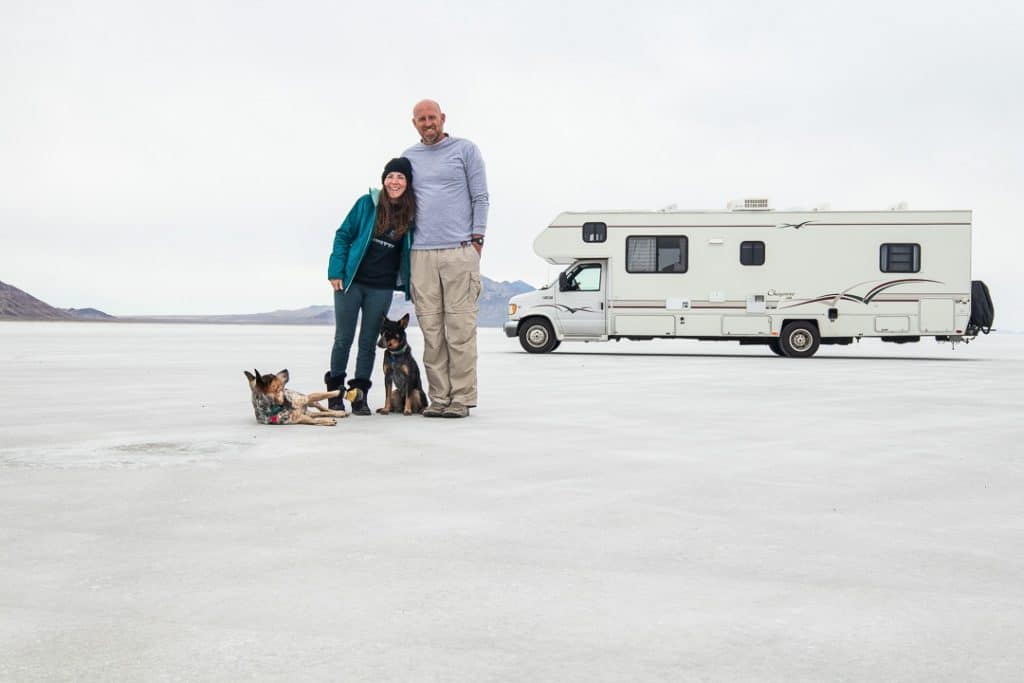
JOIN US ON OUR LATEST ADVENTURE – “FISHING ALL FIFTY”
Get started with our most popular posts.
![blog travel camping living Your Guide To Finding Awesome Camping In Baja, Mexico [2023 Update]](https://cdn-0.calledtowander.com/wp-content/uploads/2020/01/Camping-El-Coyote-Beach-Baja-0050-410x275.jpg)
Your Guide To Finding Awesome Camping In Baja, Mexico [2023 Update]
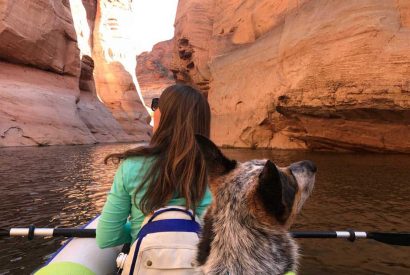
Everything You Need to Know About Kayaking to Antelope Canyon
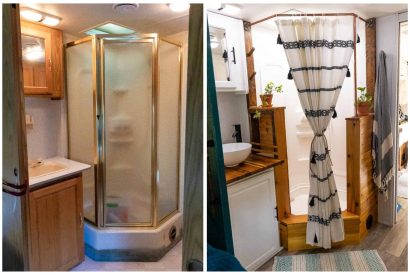
Everything You Need to Know about Remodeling a Class C RV (For under $8,000)
DESTINATIONS
Learn about how to travel to some of the most incredible places in North America!
Ultimate Guide to Camping In Thermopolis – RV Campgrounds & Other Camping Options

Dalton Highway Road Conditions And Driving Safety Tips (2022 Updated Edition)
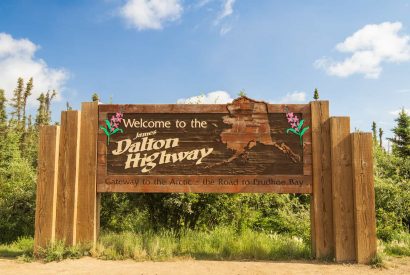
14 Fun Things To Do In Hot Springs State Park, Wyoming (Thermopolis)
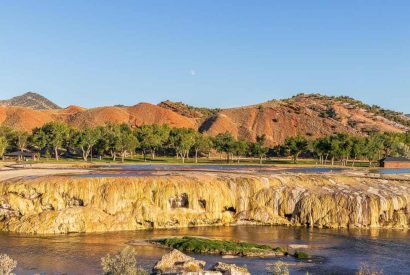
Everything you need to know to get started RVing from our 4+ years of life on the road!
How To Level An RV The Right Way- Why Leveling An RV Is Important!
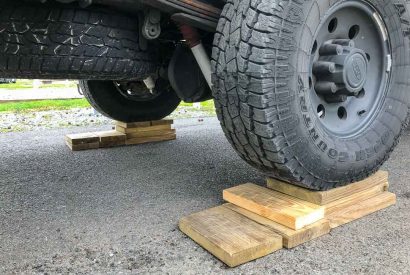
21 RVing Tips for Beginners | Everything We Wish We Knew
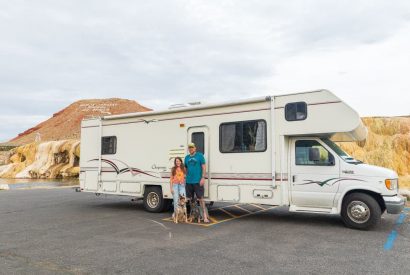
15 Best Practices of RV Camping at Wal Mart – Ultimate Guide to Overnight Parking at Walmart (2022)
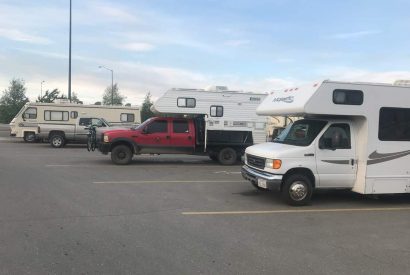
Find inspiration and information to complete your own RV remodel or renovation!
20 RV Bedroom Remodel Ideas and How To Do Them All for Under $1,000
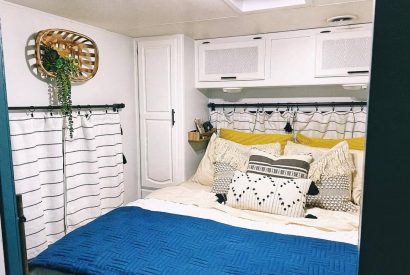
Complete DIY RV Shower Remodel for Under $300

How to do a Camper Remodel on A Budget of 8K – Full RV Remodel Cost Broken Down
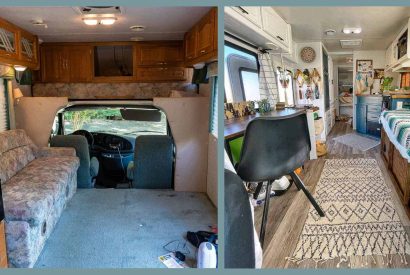
MONEY AND RVING
Learn how to budget, make and save money while living on the road!
How To Make Money On The Road – Running An Online Business From Our RV

15 Financial Tips Before RVing Full-Time – Set Yourself Up For Success on the Road

March 2022 RV Travel Budget
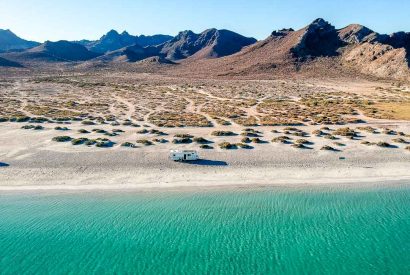
BUYING GUIDES
Get the best deals shopping for all the RVing essentials!
13 Reasons to Buy the Roadmaster Nighthawk Tow Bar | Roadmaster Tow Bar Review
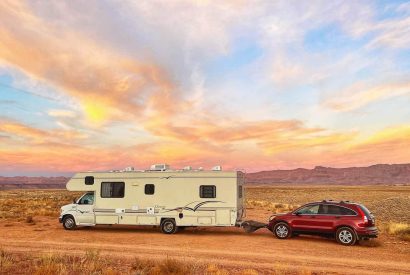
BougeRV Fridge Review 2023 | Affordable Portable Fridge For RV And Van Life
The 8 Best Solar Panels for RV – 2022 Buyer’s Guide
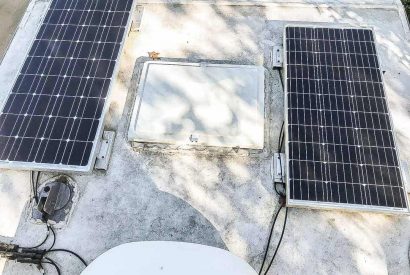
TRUCK CAMPER LIVING
Everything you need to know about living in a truck camper!
RV Mods That Made Our Camper Feel Like Home!
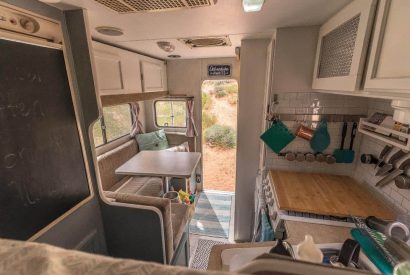
18 Simple Modifications for Your Truck Camper in 2021
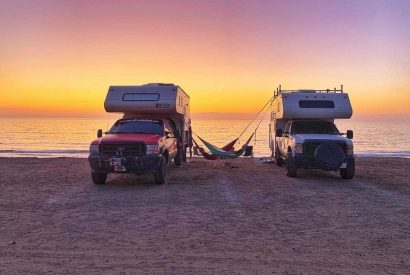
Our Best Advice for Truck Camper Camping
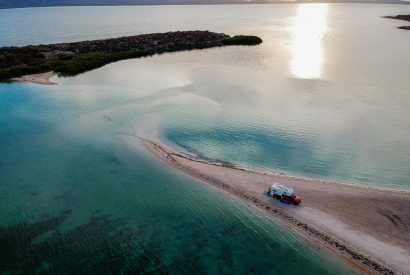
Living In An RV Full Time: 66 Tips From A Pro
By: Author Robyn Robledo
Posted on Last updated: January 9, 2024
We have been living in an RV full time for 8 years (yep, eight), and really have become experts at what it takes to make living in an RV full time an enjoyable and fulfilling way to raise a family.
My friends at Let’s Travel Family have some very practical tips for living in an RV full time but my entire purpose in life is not to teach you how to be practical because tbh , practical is boring for me . I’m an idealist who believes that life is a blank canvas and that there is more to life than what your bank account balance reads.
My purpose is broaden your awareness, change your perception, and maybe give you that paradigm shift that your soul is calling for.
First, here are 11 unconventional and idealistic tips for living in an RV full time…
1. We Are Living In An RV Full Time Because It Makes Us Happy
My motto : If it makes sense to you, that’s all that matters.
My idealism is what allowed me to Defy the Norm back in 2015 and say, “Hey babe, can we live in our RV for 5 months?”
I totally tried to convince him that it was the “practical” thing to do. At the time, we had been renting a huge house on the beach for 2 years. I’d spend my mornings surfing with my oldest daughter then my days homeschooling the kids while playing in the sand, watching dolphins swim by.
When the landlord wanted to sell the house I said, “We’d save so much money if we just spent the rest of spring and summer living full time in the RV and then we can find a new rental and settle down.”
By the end of that August, as we were driving home from a 6-week road trip from San Diego to North Cascades National Park, my wonderful enneagram 2 husband looked at me and said, “You are too happy. I can’t ask you to move back into a house.”
So we kept living my dream.
But it wasn’t easy.
2. We Didn’t Have A Way To Make Money On The Road
We had a brick and mortar in Coronado, California when we decided to launch into full time RV living in 2015. We’d camp in different campgrounds around San Diego, which wasn’t cheap but was way less than a house at the time.
We’d sit still for a few months to save up and then we’d travel.
Those first few years we alternated between long road trips all over the US and even up to Alaska with flying to Europe, New Zealand, Bali, Hawaii, Costa Rica.
In 2016, we traveled through Europe for 6 months living in a tent for 6 weeks and then in a 22′ RV the rest of the time. We covered 15 countries and about 10,000 miles. It was epic.
We did a lot more after that you can read about here .
We zeroed out our bank account almost every month . But I wasn’t worried. I believed in my ability to generate more when needed and to be honest, all that mattered to me was not letting a single day of getting to enjoy my kids slip through my fingers .
Don’t have time to read all 66 tips now? Pin this for later

3. Motherhood Was My Mission
I love being a mom and playing with my kids. It’s wonderful that we’re good friends, and it was my aim to raise children who were enjoyable companions while granting them the freedom to be themselves and explore their true identity. My goal was to nurture good people who would make a difference in the world, yet also cherish and desire my presence in their lives long beyond their 18th year.
So far so good.
4. The Socialization Stigma
“But what about friends? How will your children develop social skills?” (Insert extreme eye roll).
This is a hard truth that people don’t want to hear but have you talked to most people, especially younger people, today? Do they have social skills?
My kids, 3 of which are now adults, constantly complain to me that people their age have no social skills. They can’t hold a conversation, they don’t make eye contact, and if they do talk, it’s robotic. “This is where I work, go to school, eat out for dinner.”
There is no exchange of ideas, personal thoughts, or sense of individuality outside of trying to prove their self worth through external validation.
If you are worried that your kids will miss out on becoming robots by not going to school, then living in an RV full time is not a good idea.
But if you think it would be awesome if your kids had the time and space to be creative, explore ideas, discover what they are capable of in hard situations, and maybe start their own business when they are in high school, then living in an RV full time (& traveling- you can’t just sit still in an RV park for this to happen) might make all the difference in your and their happiness, and in turn, their health (because health is just a byproduct of happiness).
Side note: I ran a business in one of the most affluent cites in America. Kids had all the opportunities & all the stuff. Most would go on to prestigious colleges only to go out into the real world and have a rude awakening about what life is often like. I saw many students (not all) suffer from anxiety and depression.
I never really cared that our travel was frugal. Many times we had to sleep on airport floors, skipped showers, we rarely ate out and often we just lived off of eggs and rice when we traveled abroad, but we were happy and had so much fun every day.
If I had let my fear of my kids not having a high school sweetheart, go to prom, or play competitive sports (which was actually one of the reasons I wanted to move into an RV so I didn’t have to waste my weekends on the sidelines), then my kids would not be as grounded and confident as they are now.
Can you create this without RV living full-time? Absolutely.
Is it even a guarantee that they will develop this type of grit and self awareness if they do live in an RV full time? Not necessarily.
But I do think the odds are more in your favor through this lifestyle.
My motto: Be who you want your kids to be.
5. Kids Are Easy, Relationships Not So Much
The whole worrying about my kids socialization part was easy. I had been homeschooling them before we decided to become full time RVers so it was easy to transition to road schooling .
But within a few years of travel, we shifted completely to unschooling and am now a firm believer in raising young entrepreneurs .
But my husband, that was a totally different story.
He was raised to play it safe, never take risks, and to believe that whatever he did have, he should be grateful for and never ask for more.
That blank canvas of possibility that I was seeing in the world looked more like a black canvas with a red heart in the center.
The black was “We Can’t” – We can’t live in an RV forever! We can’t fly to Europe and live out of backpacks! We can’t drive from the Mexico border to Alaska.
But that red heart was love. My husband loved me so much that he just kept saying “sure” (which is now a banned word in our family btw).
While this shows how compassionate he is, the truth of the matter is that he is so conflict avoidant that it was easier to endure the physical discomfort and persist, then to have to say no to be or worse, spend time apart while I traveled.
The point of this for you and your partner is to know your enneagram. If we had had the understanding of ourselves back then like we do now, it would’ve been a game changer.
We did argue often but I’m certain that if we hadn’t chosen to live in an RV full time and travel as much as we did, our relationship wouldn’t have lasted. There is no way my soul would’ve ever been happy.
But, we would’ve saved ourselves so much bickering and Victor would’ve got to enjoy even more all of our adventures if there had been someone with our knowledge and experience at the time saying, “Hey, let’s look deeper at your programming , your trauma, and your wounds, so that you can experience the world through healed eyes.”
And the thing is, Victor loves that we live our lifestyle. He says it over and over again. “Just because it was hard, doesn’t mean I wouldn’t repeat it.”
6. Face Your Fears
When people ask me, “How do you live in an RV full time?” they are asking from a place of fear.
Victor and I have been life coaches for a long time . Whether someone wants to lose weight, get fit, heal their trauma, the only thing ever standing in the way is fear.
When we were poor and traveling, it was our fear keeping us poor. When I’d argue with Victor about our travels, it was fear keeping me angry.
Fear is everything but most of the time, it’s an illogical fear conjured up by the subconscious mind based on self limiting beliefs that were instilled in childhood.
But when you actively shift the fear from the unconscious to the conscious brain, then the thoughts lose their power and then you can choose freedom and fun.
I don’t expect everyone to want to spend every day of their life hiking, rock climbing, skiing, surfing, and mountain biking, but wouldn’t it be nice to have the inner freedom, to not be plagued by self-doubt and unworthiness, to choose more things that bring you joy and calmness each day?
Ready to launch into RV Living but haven’t pulled the trigger yet? Watch This Video
7. Intentionally Choose Your Sh*t Sandwich
Life is hard no matter where you live so why not see new places while struggling?
Brene Brown talks about this in her book, Rising Strong .
Living in an RV full time definitely has it’s challenges, which is probably why you are searching this keyword to begin with. You want to know what exactly is in that sh*t sandwich so let’s get those out of the way before telling you why I go to bed every night with so much gratitude for getting to live all of my dreams and also waking up every morning with excitement because I know it’s going to be the BEST DAY EVER AGAIN!
Some of the crappy parts of RV living for us have been:
- My husband hates change
- Not being able to find a wifi signal when it’s time to work
- My kids generally have way fewer friends
- There’s always a lot to juggle and think about
9. Is Living In An RV Full Time The Good Life ?
We started living in full time in our RV, back before it was “a thing.”
I knew no one who lived this type of lifestyle, however, I had watched the movie documentary Surfwise in 2012 and instantly knew when I watched it that one day I would try living like the Paskowitz Family.
I remember idolizing the fact that they woke up to the sunrise, did some exercises, ate great food, went surfing, played on the beach, and regardless of how Hollywood dramatized it in the documentary, they had an overall sense of connection and feeling loved.
That to me was happiness. That was the “good life” I wanted to live.
Your brain is 5x more likely to remember the hardships in life but I don’t really remember that many. When I think back over the last 8 years fo living in an RV all I really feel is a warmth radiating from my heart chakra.
We talked and laughed, sharing so much because we had an abundance of time.
Living with various options, we could either jump out of bed and paddle out at sunrise or linger until ten, engrossed in a book, before slipping on our tennis shoes for a hike.
It always made sense to me. It’s like the fisherman story , where the investment banker is so busy chasing success so that one day he could sleep late, fish a little, play with his kids, take siestas with his wife, stroll to the village in the evenings where you could sip wine and play your guitar with your amigos. Shit, we do that almost every day.
10. We Panicked In 2020
This is getting long and there is no way I can cover all my advice of full time RV living here so I’m going to sum it up with this.
In 2020, we got scared. I let fear sneak it’s way in.
I didn’t want to deal with mandates or restrictions and so, we rented a house from a family member in Montana thinking we could just transition to homesteaders.
After 2 months I looked at Victor and said, “If I stay here, the system wins.”
So we traveled in the RVs again. We kept the house as a back up until last April when I looked at Victor again and said, “I hate having to run back to Montana to check on our stuff (it really weighs you down). I just want to be nomadic again. Please.”
His red heart in the middle of a now gray canvas said, “Yes” (not “sure”…banned word remember!)
Currently, we are in an Airbnb for a month in a small Wyoming town called Lander.
We love rock climbing here and didn’t want to be in the RV in the snow and tbh again, we can afford it now.
I love that we can afford both.
My motto : Both is good.
11. Believe In Magic & Lead With Your Heart
I don’t believe in scarcity; rather, I believe in abundance. Living on this earth, I sense its boundless magic enveloping us. Our purpose is to embrace life without fear and to pursue wanderlust unrestrained.
If your heart tells you to live in an RV full-time, trust it.
You can always change your mind, lots of people do.
If you believe your heart but can’t get yourself to make the jump, that’s one of the many things Victor and I coach people on.
If you find my tone rude or offensive, then you too might be a byproduct of the education system. It’s pumping out robots faster than Elon
But like David Icke says, “Just open your heart and you will be free.”
Living in an RV Full Time FAQs
55 practical (& a little blunt) tips from 8 years of living in an rv full time:.
- How do you handle small spaces? By spending a lot of time outdoors & trying to outrun the rain.
- How did you handle 7 people and 1 bathroom? We’d start getting ready for bed an hour beforehand (not kidding)
- How do you handle privacy in small spaces? Get creative.
- How do you organize all your stuff? We’d just get rid of more.
- How little did you keep? At first, everyone just had just one box (22″ by 15″ by 10″) of clothes that fit under the couch.
- Did you keep some stuff in storage? Yes.
- H ow do you fit all your surfboards, climbing gear, bikes, skis, etc? We always had either an extra vehicle or extra RV and we’d store stuff in them and put the RV/car in storage so that we can switch gear depending on the season.
- How could you travel so fast? Often we’d do an activity— say, hiking, then drive for a few hours, then stop in a rest area to make dinner, then drive, then stop again to brush teeth, then the kids would go to sleep and I’d drive until midnight and I’d stop at a truck stop or rest area and sleep until 6 am and then drive again.
- Are you insane? Possibly.
- How are you adapting to slow travel now? I like it but it’s only because I feel like I’ve checked off a good portion of my bucket list.
- Why do you prefer fast travel? Because one of my core values is newness.
- Why should someone choose slow travel? Saves money and may fit their personality type better.
- You’ve referred to your husband. If he doesn’t like travel, why do you keep doing it? He loves travel. It’s just hard for him. He had a lot of programming to overcome but loves our lifestyle now.
- Any tips for helping one spouse learn to travel when the other doesn’t? Yep… listen to this .
- How do you not get on each other’s nerves? Through requests. By learning how to over-communicate your needs in a kind, yet clear way you avoid a lot of conflicts.
- How do you choose where to travel to? Through our love of sports. Initially, we searched The Outbound for epic adventures or we would search, “Best _____ (mtb, surf, hiking) destinations.”
- What’s your favorite apps to plan your travels? I keep an Apple note with my next 12 years of planning on it. Every night before bed I look at it and fine tune it based on new desires. This is how through obsession, I’ve manifested all my travel goals.
- Any other apps? I pretty much only use Recreation.gov , Campendium , Allstays app, Google Maps, and Gas Buddy
- Favorite destination? The Rockies. We tend to just stay on a continuous loop through Utah , Colorado , Wyoming , Montana , and Idaho now.
- Recommended destinations? Check off the best national parks sooner rather than later. Access restrictions are making them harder and harder to visit.
- Which National Park do you recommend first? Glacier National Park . Plan on at least 2 weeks here though to really get to enjoy all the surrounding area including Whitefish, Flathead Lake, and Seeley Lake.
- Which National Park do you NOT recommend? Yellowstone . I don’t like crowds so Yellowstone feels like Disneyland to me.
- Anywhere else you recommend not visiting? China and Disneyland.
- Do you have a home base? We used to be out of San Diego before 2020. We tried Montana but there wasn’t enough sun. We considered Spearfish, SD, but not enough big ski resorts close by. We tend to visit Lander, WY twice a year and stay for a month at a time.
- Where do you winter? We love to ski so we find creative ways to either drive the RV to resorts or we stay in Airbnbs. We do spend a little time in St George & Lander in the winter too.
- How do you get your mail in RV? Choosesd.com (btw, we rarely have mail so this wasn’t even a concern for me)
- Where do you have residency? South Dakota
- How do you get internet? We carry 3 wifi hotspots for the 3 main carriers- AT&T, Verizon, T-mobile. Overall, Verizon is the most consistent in the US, and T-Mobile everywhere else in the world.
- How much does it cost you to live in an RV ? We could’ve gotten by on $3500/month. Our RVs were paid off so we only had food expenses. We could always boondock & not drive if we had to. That only left a few small expenses like cell phones & auto insurance. We made more than this so we ended up getting to choose how to spend an extra $3000 every month.
- So you budget for $6500? We used to. We lived very comfortably and did a lot of epic things on that size of budget.
- What do you budget for now? One million dollars 🤣
- Do you stay at RV parks? Only if we are staying somewhere for an entire month. Otherwise, we tend to stay at state parks and forest service campgrounds. Occasionally we stay at national parks or boondock .
- What is the typical monthly rate at an RV park? There is such a huge range here. In San Diego it was $1550 plus extra vehicle parking costs. In Lander, Wy it is $550 plus electricity. I see $700-900 in a lot of states. Pro Tip: Finding monthly RV spots is getting harder and harder with inflation and recession. So many people have been squeezed out of the housing market and pushed into RV living that RV parks are in really high demand.
- Do you boondock often? Not really. We did those first two summers to save money but I like having hookups now. I manage enough in my life, I don’t want to manage water and 💩.
- Are maintenance costs high in an RV? Compared to a house, no, but things do break. All of our slide motors have broken at one time (we are really good at replacing them now lol) and we’ve blow way more flat tires than I can count. Other than that, we haven’t had much maintenance costs but we may have lower standards and I think older RVs were just made better.
- What did you like most about living in a Class C? It made it easy to fast travel and it was easy to drive.
- What did you dislike about it? We didn’t have another tow vehicle so we were limited in where we could go and what adventures (trailheads) we could access.
- What do you like about living in a 5th wheel ? It’s huge. Seriously, it feels like a 2 bedroom condo. We can fit 2 deep freezers in it and still sleep 7 comfortably.
- What do you not like about it? It’s massive to lug around, however, I’ve done it. I’ve towed it all over the US and even one time accidentally towed it across a steep, narrow, windy, 30-mile DIRT road north of Steamboat Springs, Colorado. (I should start using Truckers Path)
- What type of gas mileage do you get with your RV? The class C gets 10mpg. When I’m towing the big boy, Appa, I get about 9mph.
- What is the most important thing in choosing an RV ? Making sure everyone sleeps comfortably.
- If you believe in dreaming big, why don’t you have a fancy new Instagram-worthy RV? I’m tempted often but it’s more important for me to be on the move and chasing adventures so I like that I don’t have to worry so much if I want to take our older RVs on bumpy dirt roads. (We actually still have the class C and another travel trailer and bounce between them through out the year depending on the adventure).
- How do you make money on the road? Online coaching for all of the following: injury rehab, strength, fitness, health coaching, mindset, mindfulness, trauma healing, and life empowerment .
- What about from blogging? Yes, but it is a business I do with my kids for their future so I don’t count it in the income we live on.
- What is the WHY behind living in an RV full time? For me, to be able to live each day fully present in my self, to laugh and make great memories with my family, and to feel connected to the divine through nature and flow state.
- What do you recommend for RV insurance? Roamly
- And for health insurance? Exercise daily, eat well sourced food, live a low stress life, be mindful of your thoughts, communicate your expectations, and meditate.
- A re camping member shops worth it? We only have Thousand Trails and don’t use it but are stuck with it for one more year. Most of their campgrounds are just trailer parks and the nicer ones are hard to book.
- How do you manage to keep enough food in your RV for 7 people ? You should look under my bed and in my under storage…I might be part squirrel.
- What’s your go-to recipe when living in an RV? Chili. We eat a lot of homemade chili with grass fed beef and sweet potatoes (it’s our secret to staying ripped).
- Do you like those all in one RV washer/dryer combos? Yes, because I hate going to laundromats (too many crack heads) but I love clean clothes. The only thing is that you can’t fit much in it and if you do, your clothes come out very wrinkly.
- How do you homeschool? Unschooling now but I used to road school
- What’s the difference? When we road school, I actually used textbooks or workbooks. With unschooling, it is self-directed education meaning the kids find something they are interested in and I encourage them to obsess over learning all the can about it.
- How did you teach your children to have such great social skills? I’d have them communicate to adults through our travels. I stopped answering for them. I limited their screen time. And I didn’t let them have IG or TT until they were running their own business (which for the older 3 was about 16 and the younger 2 still don’t get social media).
- How did/do you keep the kids entertained? Reading, writing, art, and music. We do adventure a lot but it’s not the majority of our day. The kids always wake up and read and write for 1-2 hours. During long drives, they love listening to music. They draw and paint. Currently, on this trip, we are lugging around a full drum set and a sewing machine since we are bouncing between our class C and Airbnbs.
- Danny isn’t a fan of RV living as he prefers routine. Gabi and Isabelle, now adults with their own RV, often join us but like to stay longer in one place to build connections. Jiraiya and Tati enjoy our fast-paced travel style.
- My must-haves in the RV? Sports gear for outdoor fun and my trusty Berkey Water Filter. It’s a constant in my travels, be it in the RV or on car camping trips.
- Any other RV gadgets that are really helpful? Yes, outdoor rugs , storage bins, keyless door entry , and these 40 more RV essentials .
- Best sports gear? La Sportiva Bushidos . Everyone in our family owns them. We use them for everything- hiking, running, mountain biking, and approach shoes for climbing. I wish I was a #LaSportivaSponsor
- Have you found anywhere you might want to settle down someday? Maybe St George, but I doubt it.
- I aim to be nomadic until Tatiana is 18 and my older kids settle down. After that, I might follow them wherever they go. I could also expand my RV fleet and keep alternating between RV and Airbnb travel indefinitely. Flexibility is key!
- Any final advice? I think people worry too much or worry about the wrong things. Where your attention goes your energy flows so take charge of your mind before you miss out on life.
Related Blogs:
- Why RV Living Is Freaking Awesome
- 11 Reasons We LOVE Living In An RV (from 2016)
- 24 Surprising Truths About RV Living

Hey! We're glad you found us! You may want to also join us on Instagram and follow our travels. .
Notify me of follow-up comments by email.
Notify me of new posts by email.
This site uses Akismet to reduce spam. Learn how your comment data is processed .
Your guide to full-time RV living
Thinking about living full-time in an RV? Here’s everything you need to know before embarking on this journey
By Jesse & Rachael Lyons & Roadtrippers
We‘ve been full-time RV living, working, and traveling since 2018. Through this lifestyle, we’ve visited 23 states and 25 national parks. Touring the U.S. by RV has opened our eyes to new perspectives, uncovered new interests, and altered our lives. Even this far into full-time RV living, we still enjoy living everywhere more than living anywhere.
Living on the road isn’t all adventure and fun though. We spend most of our time working in our RV as full-time remote marketers. We’ve also had our share of setbacks and breakdowns. RV life requires grit, flexibility, and strong problem-solving skills. Ultimately, overcoming the obstacles is worth it for the freedom and joy of RV travel.
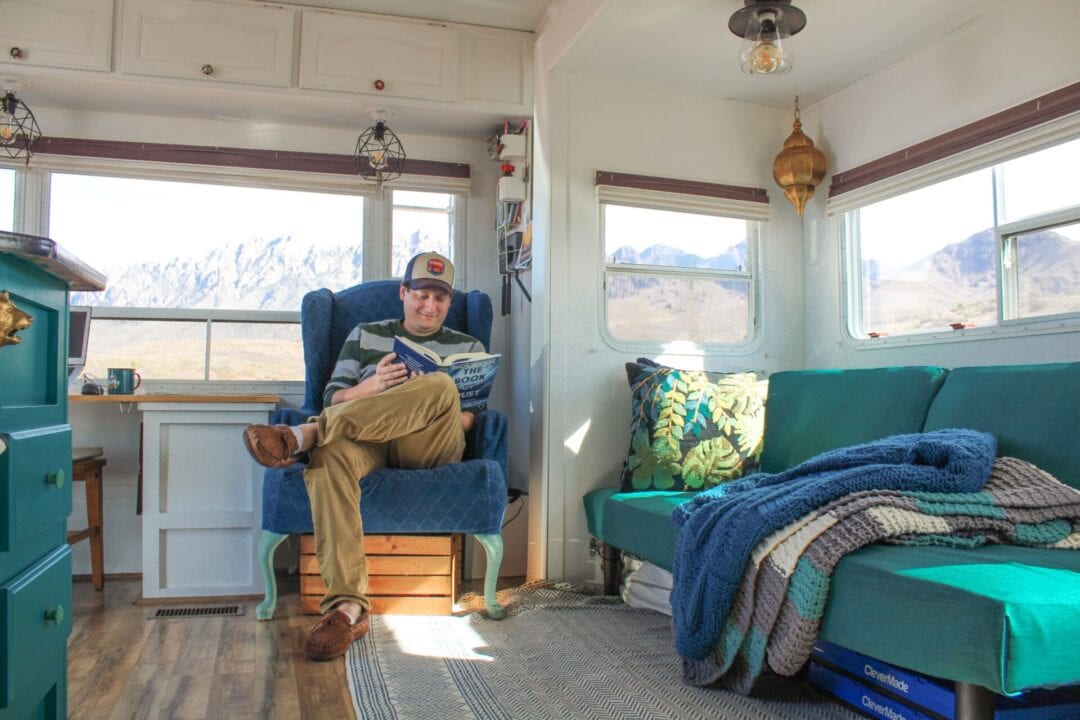
Considerations for full-time RV living
Moving into an RV isn’t as simple as hopping behind the wheel and hitting the road. Some aspects of everyday life are different when your home has wheels. You’ll need a game plan for these considerations:
Related 10 mistakes beginner RVers should avoid
The ability to scale your cost of living is a massive benefit of RV life. You can live in an RV luxuriously or on a budget. The major expenses of full-time RV life are campsite fees, fuel, RV and vehicle payments, and activities as you travel. Don’t forget to account for maintenance, repairs, groceries, mobile phones, WiFi , insurance, and other daily costs like food and supplies. You can make decisions to control most of these costs by choosing the kind of RV lifestyle you want, planning, and sticking to your budget .
Work and income
Unless you’re retired or saved to travel for some time, you’ll need an income to live full-time in an RV. Some RVers work online, while others find short-term jobs and work in one location before moving on to the next.
Sell or store
Downsizing and minimalism are part of the RV lifestyle. You can sell your home and belongings to fund the start-up costs or pay to store your belongings until you’re ready to return to a sticks-and-bricks home.
Domicile state
Even if you travel full-time, you still need a legal address. This determines where you pay taxes, vote, register vehicles, and get your mail. You can claim domicile at a property you own or ask a family member if you can legally “move in” to their residence. Alternatively, you can establish a domicile in a state through a service for RVers. Due to low income taxes and laws, the most popular domicile states for full-time RVers are Florida, South Dakota, and Texas.
If your address is with a family member, you can ask them to manage your mail. Alternatively, you can use a service to receive and forward your mail. Budget for about $100 per year for these services.
Purchase good insurance policies for your vehicle and RV, and ensure your policy covers full-time RV travel. Joining a roadside assistance program specifically for RVs comes in handy too. Ensure continuation of health insurance through your employer or in your domicile state. If you’re traveling with a pet, make sure your insurance is established in your domicile state and carry updated vaccine records.
If you’re roadschooling your children, make sure you’re familiar with and comply with the homeschool laws in your domicile state.
Full-time RVers rarely depend on campgrounds for WiFi access. If you require an internet connection for work or school, research cellular data hotspots or satellite internet options. Be aware that no mobile internet solution works everywhere, so you’ll likely need to plan your campsites accordingly or purchase multiple connection options.
Related What RVers and vanlifers need to know about Starlink
Maintenance
If you live full-time in your RV, it’s not a question of if something breaks, but when. There are excellent RV service centers and mobile mechanics, but the ability to diagnose and fix some issues on your own will make full-time RV living easier. So, bring a toolbox and travel with small replacement parts.
What to look for in a rig for full-timing
There’s no one right RV for full-time RVers. The right RV for you depends on your family size, travel style, budget, and work. Here are some factors for choosing the best RV to call home.
How much space do you need to accommodate your family? The more family members, the more beds and square footage you’ll require. Don’t forget, while bigger RVs are more comfortable, they’re more cumbersome for travel and finding campsites.
Choose an RV layout that fits your family’s daily life. Do you need an office with a closed door to focus? Are there enough workspaces for everyone’s work and school? Is there enough storage for everyone’s belongings? Are your kitchen and fridge big enough for your cooking requirements?
Related How to plan a safe and fun RV route with a big rig
The size of your fresh, gray, and black tanks can dictate your RV lifestyle. If you prefer boondocking and public campgrounds, you may want to purchase an RV with larger tanks, especially if you have a family. Tank size is not as crucial if you mainly stay in full-hookup RV parks.
Other features to consider
RVs don’t have as many appliances and comforts as a house. What other features do you need for daily life? Is an in-RV washer and dryer vital to you, or are you fine using campground and public laundromats? Do you want to invest in solar and battery upgrades for a more off-grid lifestyle? Do you require a full bathroom, or will a wet bath or campground showers suffice?
Booking campgrounds while full-time traveling
Parking your home around the country is fun but requires planning to book campgrounds. There is a vast campground style and pricing range, from nature and solitude to urban RV parks.
Types of campgrounds
There are three main types of campgrounds: private RV parks, public campgrounds, and public lands. Private RV parks usually offer more amenities and the option for extended stays but can be more expensive. Public campgrounds like national and state parks have fewer conveniences and require RVers to move frequently, but cost less and offer more rustic settings. Parking on public land is free but has shorter stay limits and no resources. Some full-time RVers stick to one type of campground, while others dabble in all three as they travel.
Stay length
How often do you want to move? Some full-time RVers enjoy going somewhere new every few days. Others stay at a campground for 1 to 2 weeks, while some settle into an RV park for one or several months. The longer you want to stay in one place, the further ahead you’ll need to book your campsite.
Related The ultimate guide to part-time RV travel
Plan and be flexible
Constantly booking campgrounds is part of full-time RV living. Consider the weather seasons, the sights you want to visit, the high tourist seasons for the destination, and local costs. Peak months in popular campgrounds, such as Florida in the winter or Colorado in the summer, will reach capacity months or even a year in advance.
If you have your heart set on a specific campground, research when its reservation window opens and book immediately. However, be flexible enough to visit destinations in shoulder seasons or stay in less frequented campsites.
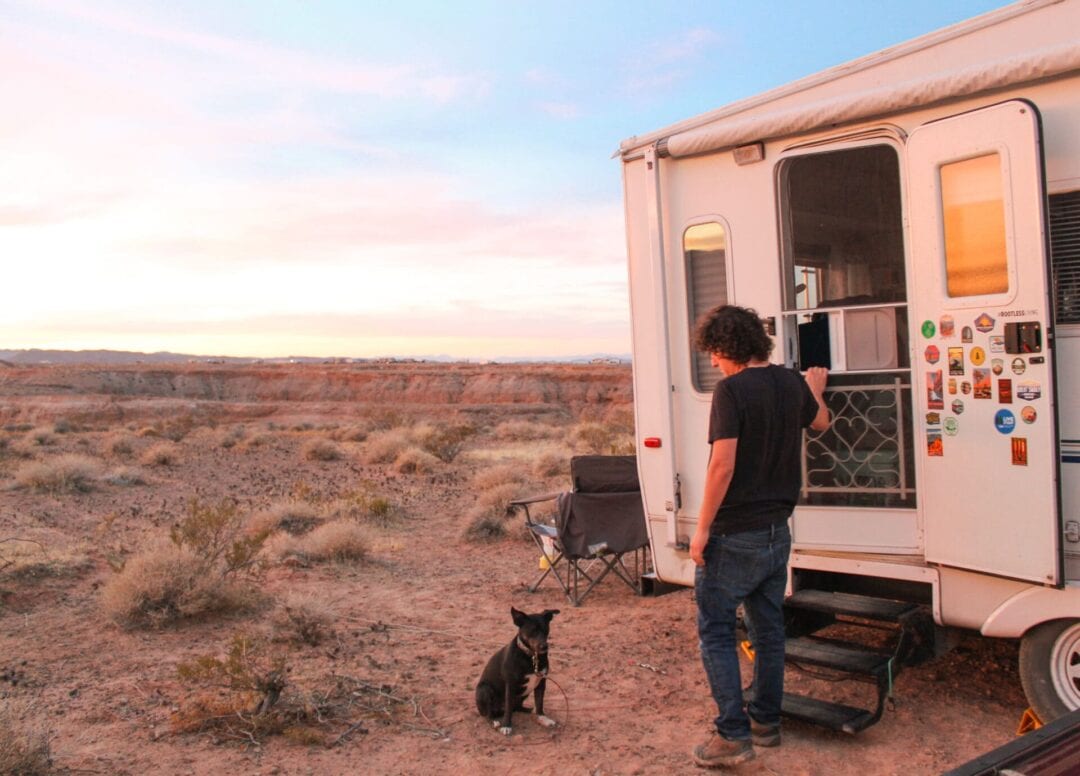
Traveling full-time in your RV
Full-time RVing can live up to the dream, but it’s not a full-time vacation. Long-term RV travel requires practice and management to sustain for months or years to come.
Visiting new places
Traveling to new destinations is the best part of RV travel. Make a bucket list of things you want to see and experience. Do you prefer outdoor activities and national parks, exploring the bustle of new cities, or a little of both? Keep an open mind to new interests and experiences too. Getting out of your comfort zone and getting to know people and places different from you can be the most enriching part of travel. Remember—you’ll never be able to see everything in one or even dozens of RV trips. Try to slow down and soak in the places you visit.
Travel days
Full-time RVers spend a lot of time on the road. Driving with an RV is slower and more unpredictable, so estimate an extra 25 percent for your drive time, and don’t push yourself (or your rig). Check maps carefully to ensure the roads and bridges accommodate your RV length and height. For drives longer than a day, reserve a campground or plan overnight RV parking in a retail location or rest stop that allows 1-night stays.
Maintaining relationships
If you’re traveling full-time, you might miss the sense of community that comes with staying in one place. Make travel plans that include visiting friends or family or invite them to meet up with you on the road. RVers are open to meeting new people, so don’t hesitate to use social media platforms and campground events as opportunities to make new friends. Take time to nurture your own traveling family too. The constant togetherness and small spaces shift dynamics, so practice open communication and plan focused time together.
Manage resources
RV life requires constant resource management. From conserving utilities to finding new grocery stores and juggling travel schedules, daily life isn’t as convenient as living in a house. There’s a learning curve for everyone, so embrace it as much as you can.
Common questions about full-time RVing
The costs of full-time RV living vary greatly depending on your RV lifestyle, but you can quickly scale your budget depending on the type of campgrounds you stay in and how often you travel to the next destination.
You can live permanently in an RV as long as you’ve established and maintained a domicile address with the associated taxes and legal requirements.
Prepare for full-time RV living by researching and planning your RV setup, income, school, domicile address, travel plans, and campground reservations. Read and listen to others’ experiences on blogs, videos, and social media to learn what to expect from daily RV life.
The specifics of how taxes work when you live in an RV vary depending on your income sources, but generally, you pay taxes according to the state you establish a domicile in.
Most RVers move to warmer climates during the winter months, often referred to as “snowbirding.” However, if you live in your RV in cold weather, heat the interior with an electric or propane heater. Use insulation and heated lines to prevent your hookups and plumbing from freezing. Many considerations and decisions need to be made before you embark on full-time RV life. The more research and planning you do, the more prepared you will be. However, you’ll always learn new things as you go, so enjoy the adventure.
Meet the Authors

Jesse & Rachael Lyons
Jesse and Rachael are a married couple from Boston, Massachusetts. In 2018 they ditched their city apartment, became digital nomads, and hit the road to go on an adventure. Now, they travel full-time in their renovated Keystone Cougar fifth wheel, tasting local food and beer everywhere they go.

Roadtrippers
Roadtrippers helps you find the most epic destinations and detours—from roadside attractions to natural wonders and beyond.
- Related Articles
- Latest Articles
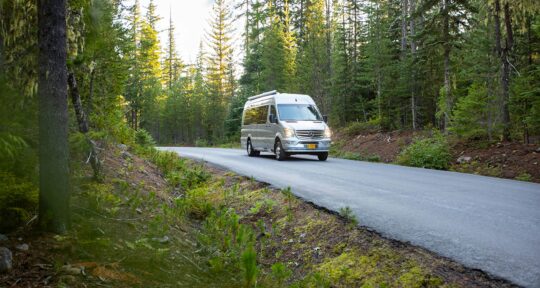
RV GPS App: 10 Essential Features

The best festivals in the U.S.
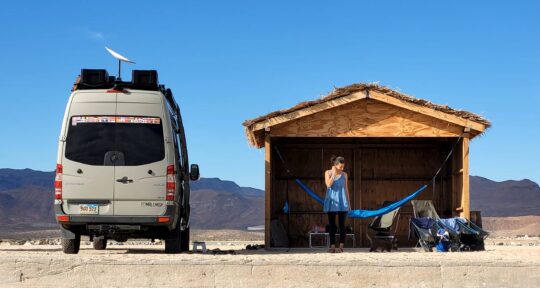
What RVers and vanlifers need to know about Starlink
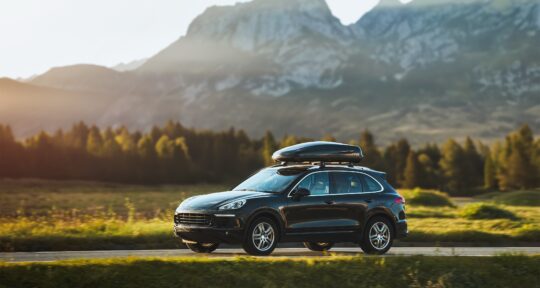
22 U.S. Road trips to take before you die
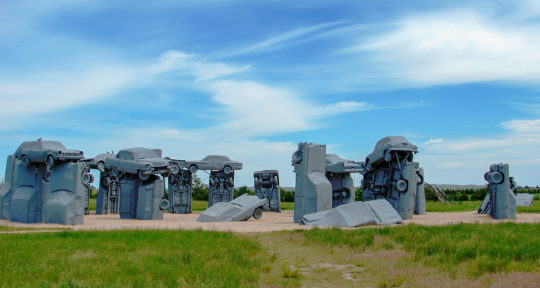
America’s weirdest, wildest, and raddest roadside attractions
Get the most inspiring stories from the road sent directly to your inbox..

- Sign up Log in Sign out
- Log in Sign out
Plan your journey, find amazing places, and take fascinating detours with our app.
If you used to sign in with Roadpass, you should now use the same username and password to log in directly with Roadtrippers above.
We couldn't find an existing Roadtrippers account using that service. Please try signing in with another option.
We need your email address to send you trip itineraries and other updates.
How do you want to plan your trip?
With just a few questions, our newest Premium feature, Autopilot, will plan your next adventure.


A List of Awesome RV Blogs You Should be Following
Awesome blogs by RVers you should be following!
One of the most difficult things about transitioning into the full-time RV lifestyle at 23 years old was the lack of community. We felt like we didn’t have a lot of peers who had chosen a similar lifestyle. At times it made both Alyssa and I feel like a crazy person to have chosen this awkward and unconventional lifestyle.
But then we found a thriving online community of travelers out on the open road and started making friends with them via their RV blogs. The more that we met, the more we felt affirmed that we were doing the right thing.
That being said, I created a list of RV blogs from people who are out on the open road, making a living remote, and genuinely living a cool adventurous life.
Connect with them. Follow them. Make friends. Re-affirm that you aren’t crazy and if you want to live and travel in an RV before you’re retired… you should do it.
Crazy Family Adventure

In 2014, Bryanna and her husband Craig, their four kids (and their dog), sold everything, bought an RV and have been traveling full-time around North America since. If they aren’t climbing mountains, hiking to a waterfall or playing at the beach they are most likely at the local donut shop tasting their way to uncovering the best donuts in the country or the local brewery or cider house finding the best beer/cider in the country!
Follow the family:
We’re the Russo’s

Back in 2015, Joe and Kait Russo were living the American Dream. They owned a home in Los Angeles, had well-paying jobs in the corporate world, and a strong community of family and friends nearby. But something was missing. After a lot of soul searching, they realized the daily grind of long commutes and working for others wasn’t bringing them joy, and they decided to take the risk of a lifetime. They sold their home, quit their jobs, bought an RV and left the safety and comfort of home for a new beginning: life on the road.
What started as a one-year break and a chance to do some traveling turned into an adventure with no end date, new careers, and a new understanding of what it means to truly live the life you want. During their first few months on the road, Joe and Kait began posting blogs to update friends and family about their travel. That led to posting videos on YouTube and slowly, they found that they were reaching far beyond their network of loved ones. They also realized this new reach could be the key to allowing them to extend their nomadic life indefinitely.
Since then, the Russos have built a travel brand (We’re The Russos) consisting of a popular website ( weretherussos.com ), a YouTube channel with millions of total views, two books, and a loyal following of fellow travelers and dreamers. They are passionate about inspiring others to take risks and pave their own road to fulfillment.
Find the Russo’s on:
Keep Your Daydream

Marc and Tricia Leach ditched the suburbs a couple years ago and while still being full-time parents and running their own consulting business, hit the road in an RV. Documenting their journey and what they’ve learned along the way, they’ve built a Youtube channel called Keep Your Daydream with over 130k subscribers.
Making Sense of Cents

Michelle is a super successful personal finance blogger turned full-time RVer and sailor. Her and her husband Wes are now traveling across the country in their Winnebago and she’s sharing what she’s learned thus far about the RV life . Michelle was even cool enough to do an interview with me as part of my make money traveling series. You can read that interview here: How to make $25,000/month blogging .
Find Michelle on:
- Blog: makingsenseofcents.com
Technomadia

Alyssa and I got to meet Cherie and Chris in Austin, Texas at a little get together back in 2015. We all hung out, toured their awesome bus conversion and I got to hear about their epic adventures and how long they’ve been at this RV lifestyle. After meeting them I did more research and read up on more of their blogs and realized just how awesome these two are. They met on the road and have been posting and sharing awesome RV related blog content for years. They even created an online school for mobile internet as well.
Blog : Technomadia.com
Find Technomadia on:

Peter & John are a couple of “Do-It-Ourselves” full-time RVers who offer RV maintenance, repair & travel tips. If you have a question about your rig, they likely know the answers. We love these guys and recently flew to Italy to RV around the country with them! ( See those videos here !)
Find Peter & John on:

James and Steph are fitness junkies who originally made the leap into a class b van so they could have a bathroom for their cycling events. Now they run thefitRV.com and create a bunch of really great content on how to stay fit on the road.
Blog : thefitrv.com
Find The Fit RV on:
LivinLightly

This is the Peterson family! I interviewed Nick for my upcoming podcast on making an income on the road. Nick and Shae, his wife, make the majority of their income by creating and selling digital products on a website called Teachers Pay Teachers . They also travel in a really cool airstream, obviously.
Blog : Livinlightly.com
Find LivinLightly on:
- The LivinLightly Podcast

Kevin and Mandy are two of my favorite people. They hit the road in their renovated fifth wheel a few years ago and we love meeting up when we cross paths. I met Kevin through an app I downloaded called The Moment App (Kevin created the app) and have had him on the show a few times! See: RVE 0010: Why Kevin Holesh Moved Into a 5th Wheel After His iPhone App Was Downloaded 2.5 Million Times
Blog : 188sqft.com
Find Kevin and Mandy on:
The Adventures of Trail & Hitch

Trail and Hitch (Sigfried and Anne) are both software developers who decided to escape the rat race and take their skills out on the road. I met Sigfried in a Google hangout I was hosting with a bunch of fellow RVers. He’s a really cool guy and they travel around in a sweet airstream .
Blog : TrailandHitch.com
Find Trail and Hitch on:
- twitter.com/sigtrent
- twitter.com/annetrent
Want to follow us?
Hi! We’re Heath & Alyssa In 2014, we quit our jobs, bought an RV, and got married. During our first year of marriage, we traveled to all 50 states filming a documentary called Hourly America where Heath worked an hourly job in each state while Alyssa filmed the adventure. Our documentary work has been featured on CNN, CBS, Fox, Forbes and has led to consulting work with brands like Chick-fil-A, UPS, and Winnebago.
Here on our website, we share how to start traveling in an RV full-time—like in our book, A Beginner’s Guide to Living in an RV —and how to run a business on the road. You know, so you don’t end up one of those people living in a van down by the river. We support ourselves while traveling by running five businesses on the road. (We’ve since sold three of them!) For more on making a living on the road, check out our podcast: The RV Entrepreneur . For more helpful free resources, see our Resources page.
Now, we travel full-time around the globe. Our kids have RVed in a dozen countries with us including Japan , New Zealand , Italy , France , and more!
Read Next: All the Countries Where You Can RV: A Complete List

Username or Email Address
Remember Me
- START HERE!
- Work From Anywhere
- How to Start a Blog
- Heath’s Reading List
Privacy Overview

This post may contain affiliate links or mention our own products, please check out our disclosure policy
25 Must-Haves For Full-Time RV Living
- Lucinda Belden
- August 24, 2022
Table of Contents
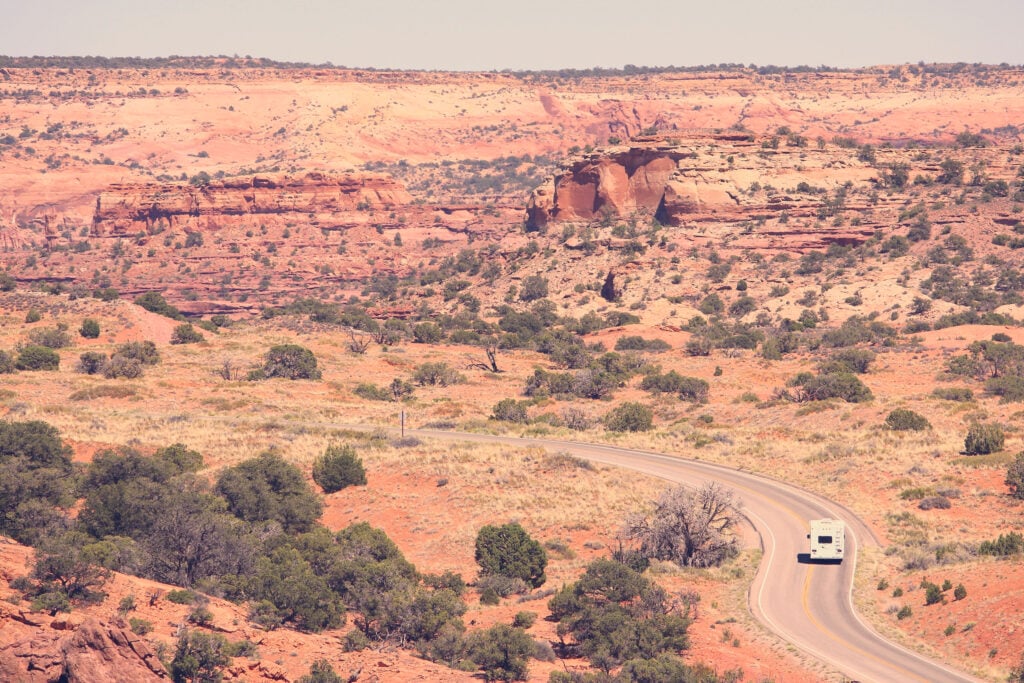
You’ll want to keep these full-time RV living essentials on hand. Photo: Shutterstock
25 Essentials For Full-Time RV Living
Once you decide to hit the road full-time, you’ll want to consider all the items you’ll need for RV living. Having the right tools, home items, and accessories with you can make all the difference between misery and comfort. Especially if you like to boondock or are in the middle of nowhere.
Everyone’s RV camping style is different. But most people will find this list of full-time RV living accessories helpful for both short and long road trip adventures.
1. Spare parts
Driving your RV down the road is the same thing as experiencing an earthquake inside your home. Expect parts to degrade or break over time and keep those spare parts available—especially for things you use the most. If you are looking for parts at the last minute, you may find them hard to get or on back order.
Focus on the parts that would be most important to you should something go wrong, as well as items that are harder to source locally. Also aim for small and lightweight replacement parts that are easy to store and transport.
Take time to examine your rig and consider the things that might break down or are more susceptible to road damage, and determine if carrying extras might save you a lot of time. Some must-have parts for full-time RV living include furnace parts, assorted nuts, bolts, screws, washers, varied sizes of hose clamps, and extra lug nuts for both your rig and tow/towed vehicle.
If you carry a generator or outdoor toys like motorcycles or ATVs, plan to carry additional fuel. A five-gallon gas can may be very useful. An extra propane filled tank is good if you RV with outdoor grills and griddles or expect cold weather!
At a minimum, you will want a multi-bit screwdriver (be sure to have a square bit, too!), pliers, a Crescent wrench , and a hammer. Being able to fix something yourself quickly can keep your schedule on target. If you are comfortable diagnosing electrical problems, be sure to carry an AC/DC voltmeter .
4. Maintenance products
All RVs have seals and something that squeaks. Seal lube, slide lubes, and various kinds of tape for maintenance are great to have on hand in the RV.
When possible, use silicone-based lubrication instead of petroleum-based lubricants. These products tend to gather and collect far less dust and dirt. Consider carrying additional water filters and sewage treatment packs.
Make sure you keep track of all your RV maintenance and repairs with an online tool such as RV LIFE Maintenance . Not only can you keep all of your documents in one place, but you’ll also receive timely reminders when maintenance is due to help you avoid costly repairs and potentially serious accidents.
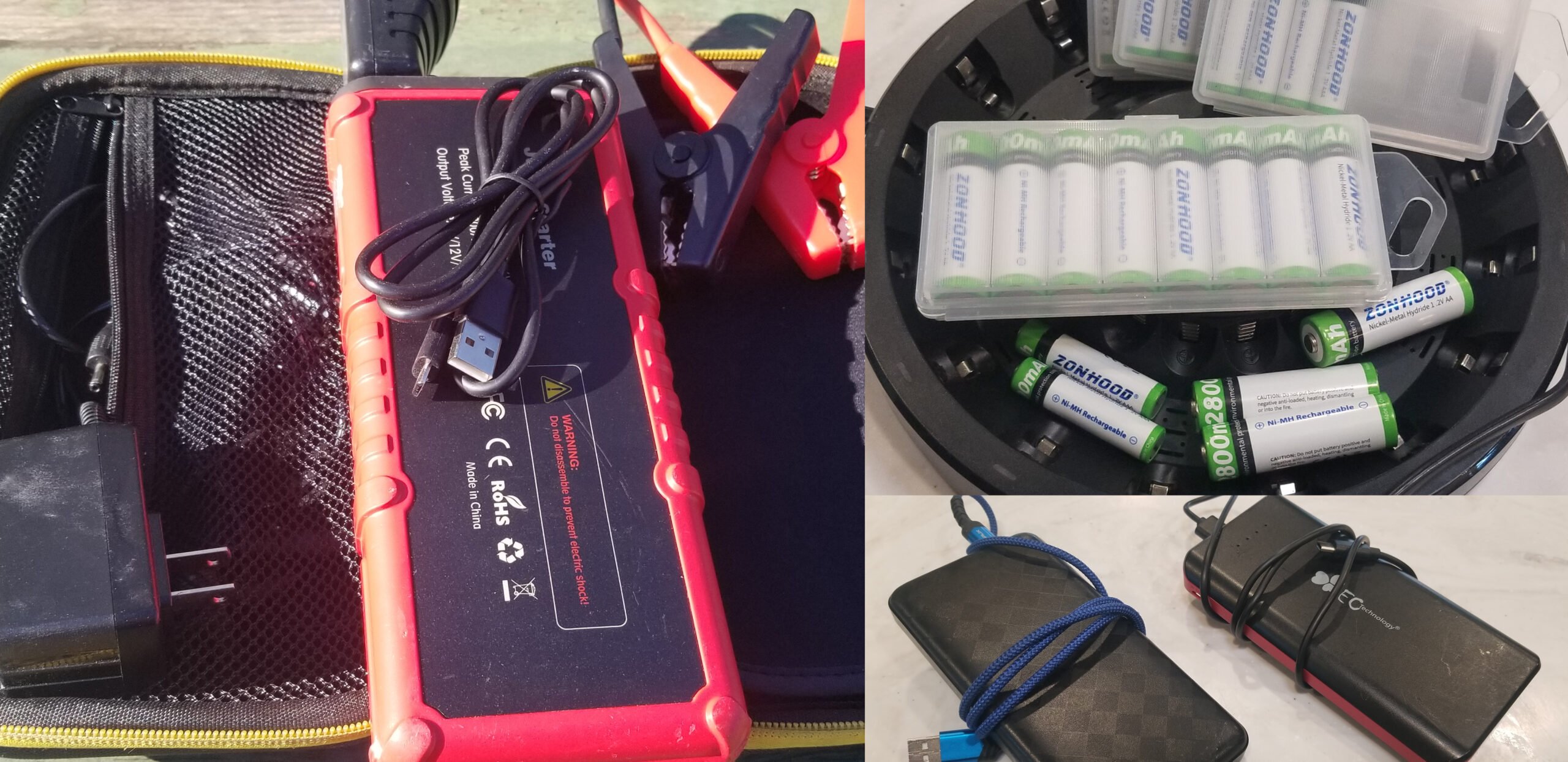
Basic tools we like to keep on hand: USB battery packs, a battery jump kit, rechargeable batteries, and charging station.
5. Batteries
Having USB battery packs on hand can be mighty useful when you need to keep devices charged or even to jump start a vehicle! Older rigs do not have DC-powered USB plugs sprinkled throughout. You will need AC to power that charger plug, which might not be available while boondocking or during a power outage.
Consider using rechargeable AA and AAA batteries too. There are also USB battery packs that hold a much larger charge. They can even be used to jump the largest of automotive batteries.
6. Fresh water and food
When parked, you can just run out to a local grocery store to fetch these items. But what happens if you are stuck beside the road overnight? Fresh bottles of water and some ready-made foods are good to keep on hand if you RV full-time.
7. Water and sewer hoses
Whether you prefer campgrounds or boondocking, you’ll need to empty those holding tanks at some point. Have the appropriate sewer hoses to drain your wastewater properly and legally.
Having a sufficient water hose is also important for refilling your freshwater tank. Plus, being able to expand the hose length in some parks will be important.
8. Shore power cable and adapters
Unless you are a 100% boondocker , you’ll want to connect to shore power at some point. Obtaining a high-quality power cable ensures that can happen.
Remember: the available connection could be a 15-, 20-, 30- or 50-amp source. Ensure you have the appropriate adapters (or “dog bones”) to enable a connection between your rig and the power source available.
9. Pedestal surge protector
There are misconfigured power pedestals at campgrounds. Protecting all your appliances and laptops is important! Different RV surge protectors vary in cost, protection rating, and other features.
Never plug up to shore power without a surge protector to protect your RV. The cost is far less expensive than replacing your microwave, TVs, air conditioners , etc.
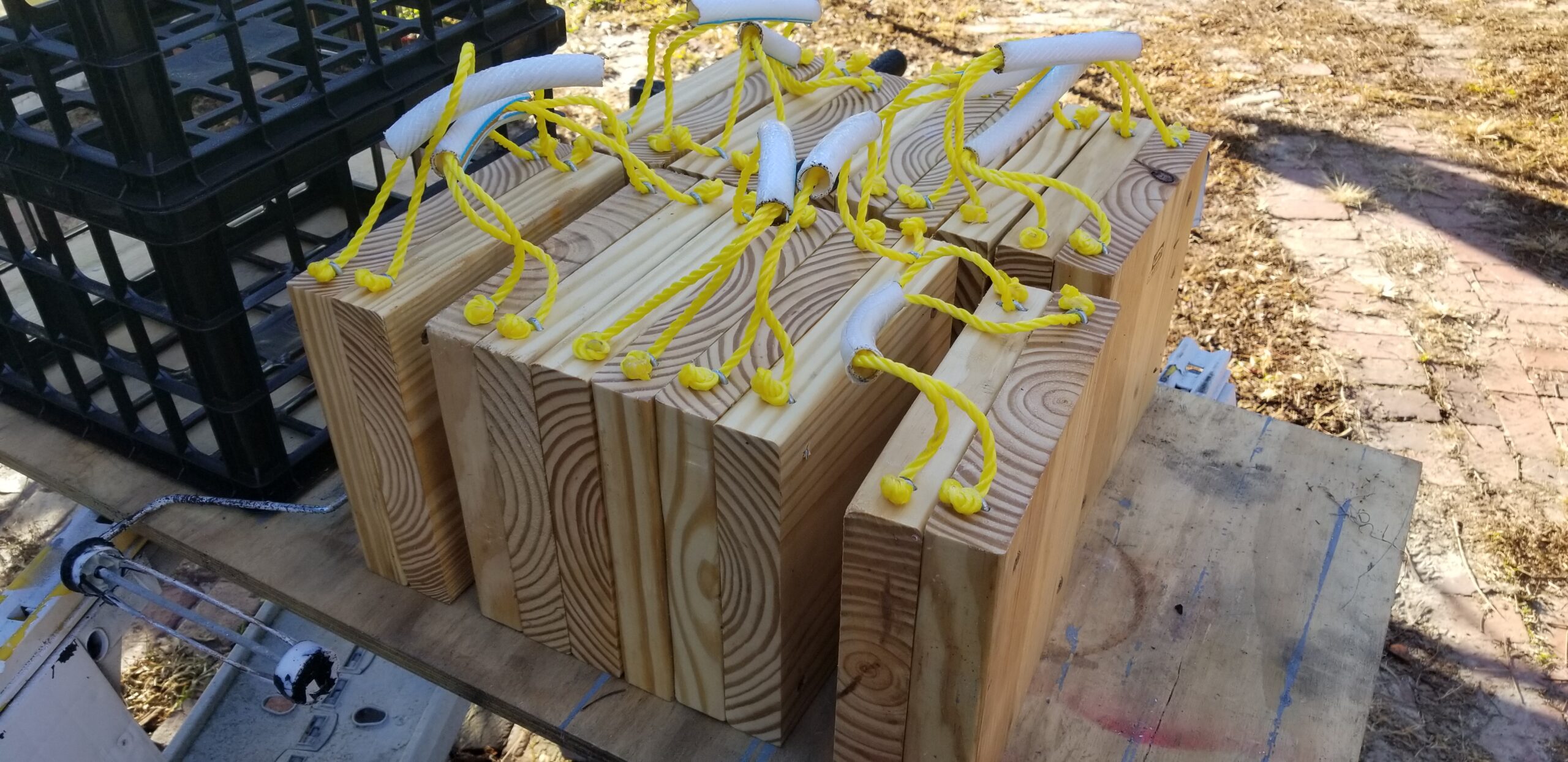
We made our own homemade leveling jack pads with all-weather handles—easy to pull up from the mud!
10. Jack pads and wheel chocks
Not all camping spots are created equally—or level! Whether you have automatic or manual leveling jacks on your rig, being able to reduce the amount of required lift for your jack legs can change a wobbly rig into one that’s more stable.
In addition, sometimes the ground is soft or soggy, and increasing the size of the footprint can prevent your rig from sinking during a long stay. You can purchase premade pads or make your own! Having wheel chocks will also minimize movement and potential rolling of your rig.
11. Maps and apps
Using apps and websites can help get you to your destination safely. You’ll want to find the right campground for you and your traveling partners, and you may need to find dump stations along your route. And the heavier and taller your rig is, the more you will need to plan your path. Not all bridges are rated for a 20,000 pound or 13’6” high rig!
For all of your camping and trip planning needs, look no further than RV LIFE Campground Reviews and RV LIFE Trip Wizard . Campground Reviews is a trusted source of campground and RV park reviews offered by camping and RV enthusiasts just like you. With its accompanying RV LIFE App , RV Trip Wizard gets you to your camping destinations utilizing RV-friendly routes specific to your RV and travel preferences.
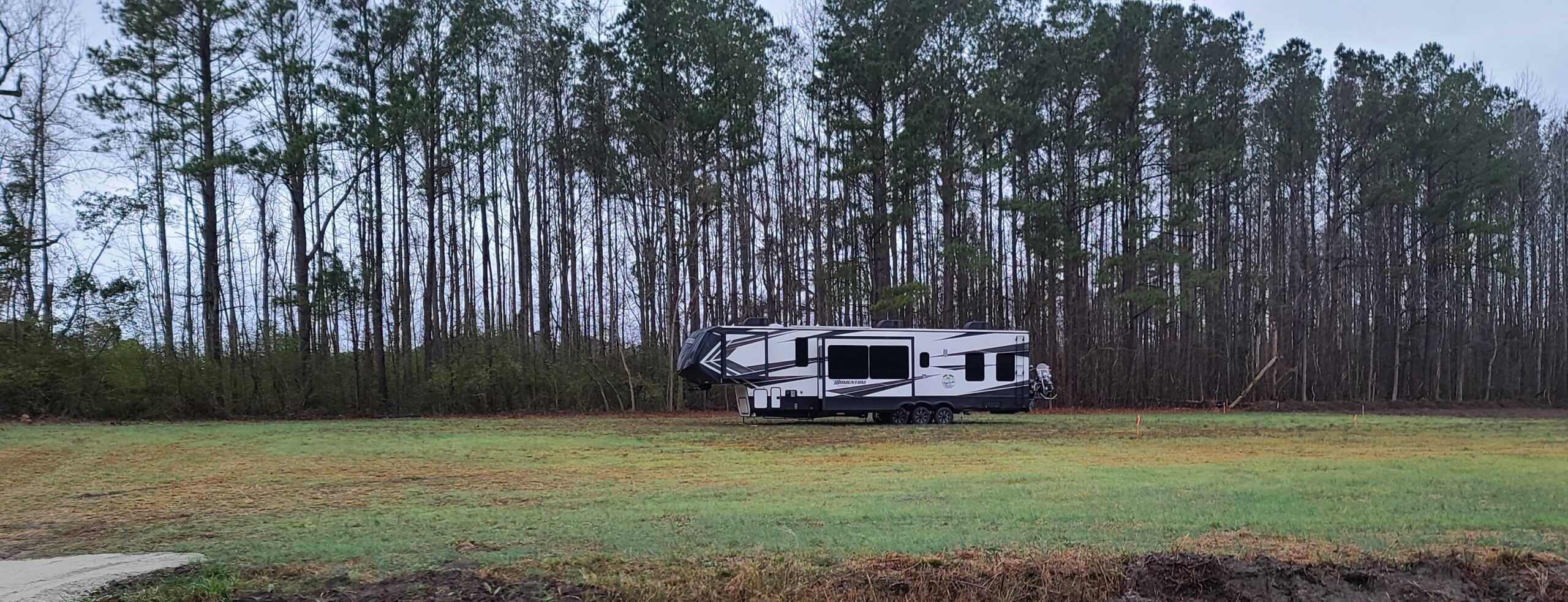
Your needs will vary. Image by L. Belden.
12. All-weather clothing
Unless you’re parking permanently in the Florida Keys , traveling to different parts of the country means encountering a variety of weather. Having ample clothing means being prudent about layering, as RV space is limited.
13. Dishes and cookware
Hopefully you don’t plan to live on TV dinners and takeout! Part of the benefit of full-time RVing is the ability to save money and cook at home. Look for durable but lightweight dishware like Corelle .
14. Comfortable bedding and linens
The main benefit of full-time RVing is having your home with you. Having good fitting sheets, comfortable pillows, and warm blankets is an important part of being in your rig. A good RV mattress should be a part of your must-haves, just like in your brick-and-mortar home.
15. Water pressure regulator
RV water lines are susceptible to pressure overloads that can cause leaks long term, if not immediately. Purchase a pressure regulator to put between all water spigots and your rig.
Contact your manufacturer for the maximum pressure your lines are rated for, and ensure that the regulator, if adjustable, is set below that threshold. No one wants a leak in the underbelly of their rig!
16. Camping memberships
Do your research. There are many organizations you can join as a full-time RVer. We suggest selecting only a handful. Too many and you can’t fully utilize the services offered, and it can be heavy on the pocketbook.
Passport America offers up to 50% off camping rates at participating locations. Harvest Hosts is another great resource for one-night stays across the US at wineries, breweries, farms, museums, and more.
17. Emergency supplies
Never travel without one or more easily accessible fire extinguishers . Know where to keep them and how to use them in case of an emergency. Accidents happen! Be sure to keep an emergency medical kit in your rig and make sure it is accessible.
18. Vehicle insurance
For drivable vehicles, all states in the US require liability insurance at a minimum. Because you are taking your home with you, talk to your insurance agent about the best policies to fit your lifestyle, budget, and financial situation. Note that not all insurers will cover full-time RV living. Make sure your policy does or find one that will.
19. Medical insurance
If you aren’t yet retired and have government-provided assistance, talk with your financial planner to ensure you have good medical coverage in case of catastrophic needs while on the road. Not all plans cover you in all states, but most have out-of-network exceptions.
You can start with policy shopping from an online provider like RVerInsurance.com . RVer Insurance Exchange offers free quotes for RV insurance , health insurance, even extended warranties .
20. Internet access
Whether you are retired or planning to work from the road, most RVers need internet access. There are cell phone plans, satellite offerings, and more to keep you connected. You can have a simple connection or several mobile hotspot plans , depending on your particular needs.
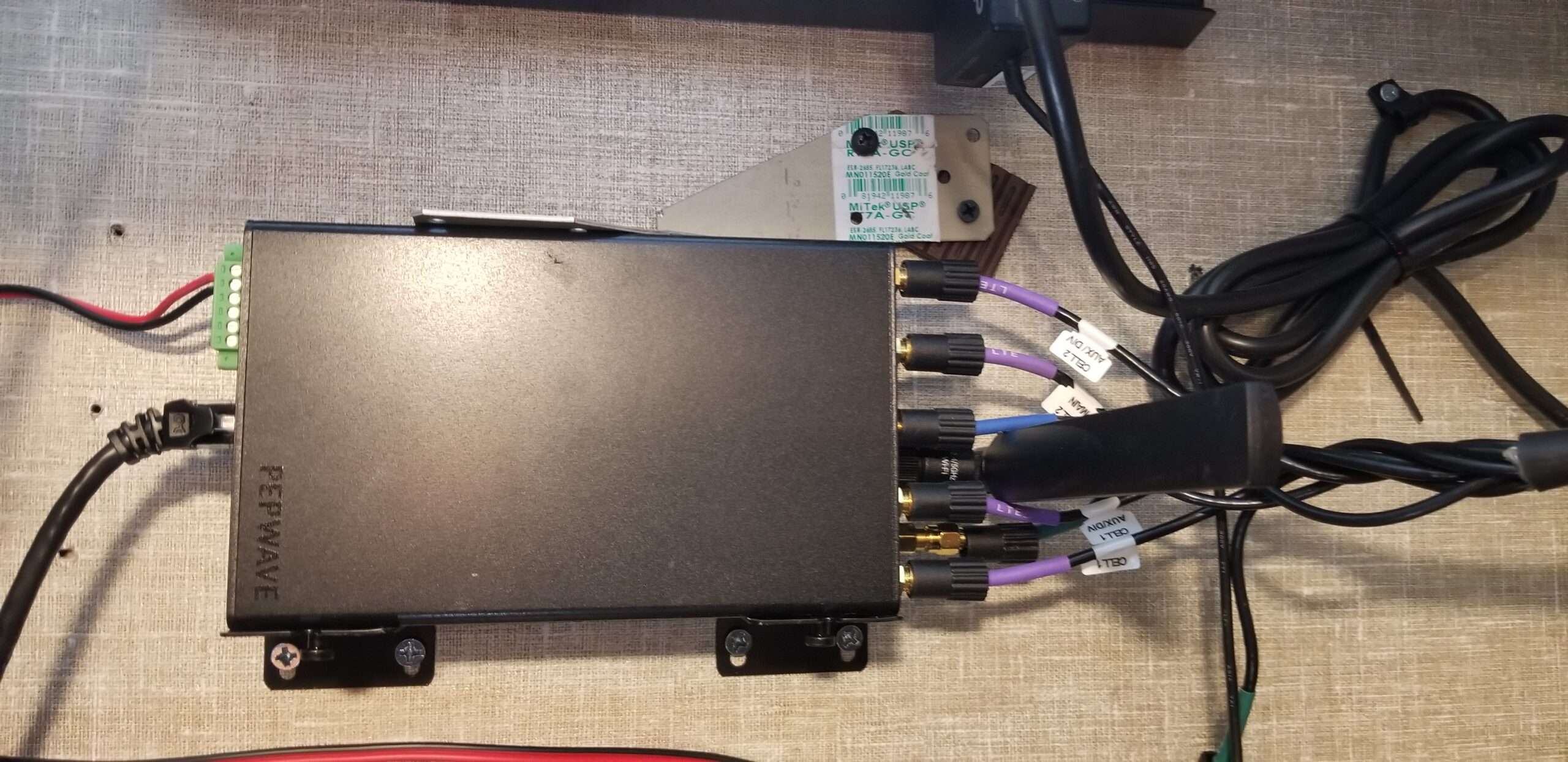
We used this advanced cell-based Internet router installation.
21. Medical records
You should be able to digitally access all your medical records and lists of medications. Don’t forget about your pets too. Most campgrounds require that pets have their shots up-to-date and may require proof of vaccinations.
22. Resilience and a positive attitude
When you are full-time RVing, your everyday activities, your work requirements (even being retired has appointments), your home, and your vehicle are now all tied together. When one goes down, the others are stalled. Once you realize this, you can approach any issues head-on and be better prepared.
23. Domicile and mail service
You will be required to establish a domicile and a permanent address where you can receive mail . There are lots of services out there, but you need to select one. The top states for establishing your domicile are Texas, Florida, and South Dakota due to taxes. Get all this set up before you start on your journey.
24. Spare tires
While it’s great to have a roadside service contract, they will very rarely have the replacement tire you need or be able to deliver it in a timely fashion. Most RVs have a designated space to keep a spare tire, so use it!
At least you will have the spare tire on hand for a mobile service if you can’t or do not want to change it. Also ensure you have a jack, tire tool, and a way to air up your tires.
25. Community
You can access many RV forum communities online. These sites are some of the greatest resources for full-time RV living. You can quickly join any of the forums and talk to all types of RVers. They can provide all kinds of support from fixing your rig to just getting together and making new friends.
Related articles:
- The Dirty Truth Of Full Time RVing
- Do You Have What It Takes To RV Full-Time?
You May Also Like:

Full-time RVing Regrets From Nomads Who Know
If you’re considering a leap to nomadic living, you’ll want to read about full-time RVing regrets by iRV2 members who made the lifestyle choice.

5 Costly RV Appliances To Avoid (And What To Use Instead)
When it comes to RV appliances, everyone is different. Only you know what you can or can’t live without. Check out these great alternatives.

What You Should Know About Composting Toilets
Many who full-time or do a lot of boondocking are turning to composting toilets as a way to save on water usage and to make fewer trips to the dump station.

Lucinda Belden has carved her niche in the travel writing domain since 2010, embracing full-time RV living in 2019. With her work featured in Escapees Magazine and Ride Texas Magazine , and authoring RV-focused books like “RVing with Motorcycles” and “14 Sturgis Rally Rides,” Lucinda’s expertise is widespread. Alongside her husband, she also hosts RV events, sharing their adventures on their Direction Wide Open website , embodying the spirit of traveling as a local and the essence of never-ending learning.
4 thoughts on “ 25 Must-Haves For Full-Time RV Living ”
Thanks this was very helpful and enjoyed reading. Thanks
I love this blog! I’m a full-time RVer and I think this is a great list of must-haves. Thanks for sharing!
Don’t forget to get your banking set up before you lose your permanent street address. You will not be able to open a new bank account with a street address on your driver’s license and perhaps some bills (water, power, etc) sent to that address.
Am I missing something, but don’t you need most of these things regardless of full-time status, e.g., freshwater hose and dishes?
Leave a Reply Cancel reply
Your email address will not be published. Required fields are marked *
Save my name, email, and website in this browser for the next time I comment.
Welcome! Please follow these guidelines:
- Be kind and respectful.
- Keep comments relevant to the article.
- Avoid insults, threats, profanity, and offensive remarks.
- Refrain from discussing gun rights, politics, or religion.
- Do not post misleading information, personal details, or spam.
We may hide or remove comments at our discretion.
I have read and accepted the Comment Guidelines and Privacy Policy *
Recent Posts

Browse By Category

Let us Help YOU
Shift control and escape to rv living.

RV life offers an adventure like no other – a journey we wouldn’t trade. For us, the freedom and thrill are unmatched, regardless of whether we’re navigating the open road or settling in serene spots.
For beginners, stepping into this world can seem daunting. That’s why our RV blog brims with invaluable tips.
From choosing the perfect RV to mastering life on the road, we’ve got you covered. Our firsthand experiences and insider insights from over 5 years of RV life will elevate your RV traveling.
So, buckle up and join us for this exhilarating ride!
Where would you like to start?
Hitch up for an unforgettable adventure! Our blog is your one-stop shop for unlocking the secrets of comfortable and confident RV living. We’ve got tips on everything from snagging the best campsites at discount prices to handy apps that make life on the road a breeze.
Plus, thinking of buying an RV? Check out our helpful RV reviews and ratings. Whether you’re a full-time nomad or a weekend warrior, we’ll help you make the most of your RV travels.
Join the RVBlogger Community and Receive RV Today eMagazine Every Month – For FREE!
And you’ll also get our exclusive Newsletters full of Helpful Info!
Just Fill in your name and email below! Welcome to the RVBlogger Bunch!
Recent Helpful Articles
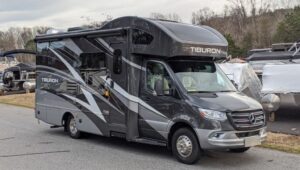
5 Best Small Motorhomes With Slide Outs For 2024
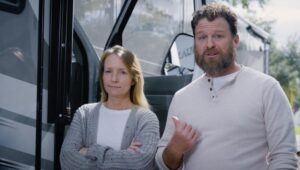
Camping Dysfunction: Symptoms, Causes, and Treatment
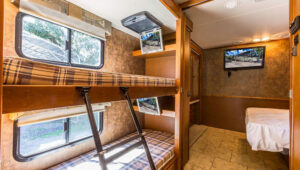
10 Best Used Travel Trailers With 2 Bedrooms
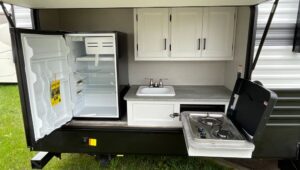
10 Best Used Travel Trailers With Outdoor Kitchens
Join the rvblogger community on facebook.
Join our Private Facebook Group, RV Camping for Newbies . Interact with over 120,000 fellow RVers, ask questions, and get great tips for campgrounds, gear, recipes, and more!

Check Us Out on YouTube!
Click Below to Go To Our YouTube Channel to Find Helpful Videos All About RVing!
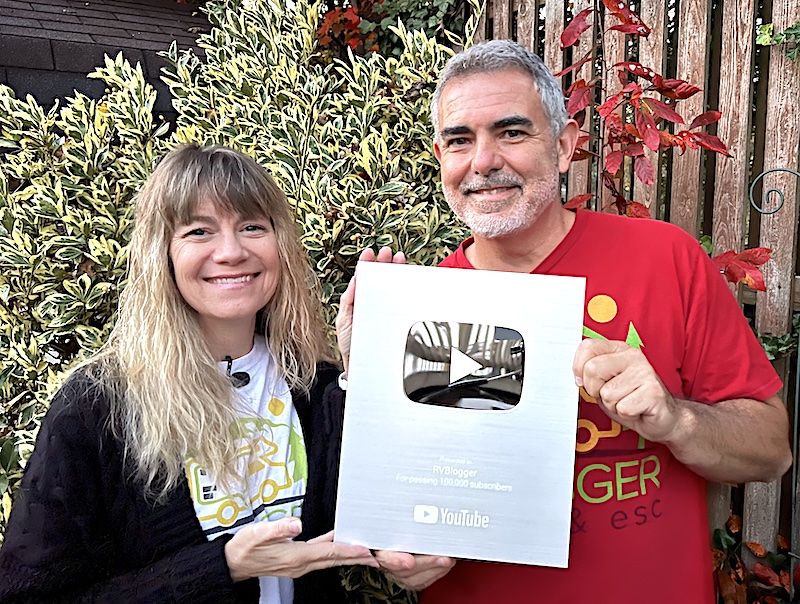
Thanks to all of our Subscribers! Over 176,000 and Counting! Click Below and Subscribe too!

Follow Us On Our Journey!

Ready to embrace the open road’s thrill? Our RV travel blog is your ultimate resource. We’re here to answer questions, share expert RV tips, and fuel your next adventure.
Let’s explore the world of RV living and create lasting memories.
RVing isn’t just travel—it’s a lifestyle. Our blog serves up insights and advice for navigating this unique life. Whether newbie or seasoned, our goal is to make your journey as smooth and enjoyable as possible.
Starting the RV lifestyle might feel overwhelming. But fear not—we’re here to simplify.

Travels with Ted
RV Living Full Time: 100+ Tips to Make it Work
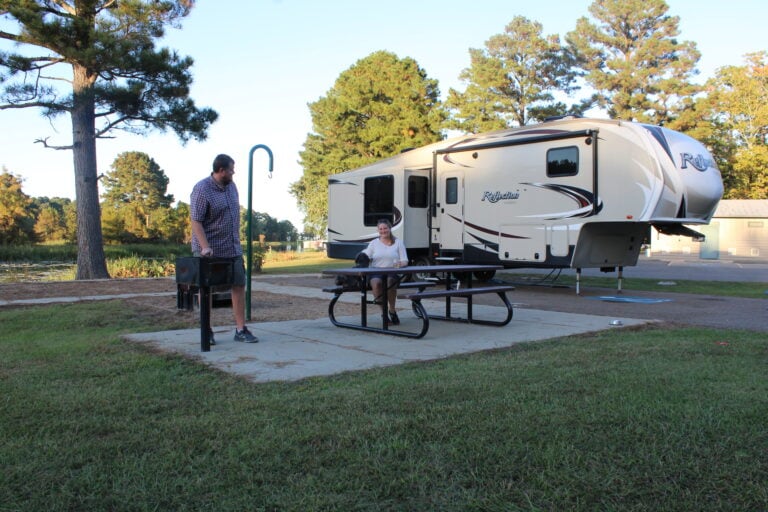
This post may contain affiliate links. See our affiliate disclaimer here.
My husband and I have lived in our fifth wheel RV since 2016. In our years traveling the country, we have learned endless lessons about how to make the RV lifestyle more affordable and less stressful.
In this complete guide to RV living full time, I am sharing 100 important tips for living on the open road.
- 1.1 Bigger Isn’t Always Better
- 1.2 Attend an RV Show
- 1.3 Get an Inspection
- 1.4 Buy the RV before the Tow Vehicle
- 1.5 Stay on Budget
- 1.6 Included Desired Upgrades in your Budget
- 1.7 Compare Prices Online
- 1.8 Remember that RVs Depreciate Quickly
- 1.9 Where You Buy Your RV Matters
- 1.10 Video Tape the Walkthrough
- 2.1 Book a Local Stay for at Least 1 Month
- 2.2 Some Planning is Required
- 2.3 Book Winter Reservations Early
- 2.4 Leave Some Room for Spontaneity
- 2.5 Check Cancellation Policies before Booking
- 2.6 Look at Real Campers’ Photos
- 2.7 Prioritize Practical Amenities
- 2.8 Utilize RV Camping Memberships
- 2.9 Boondocking is Great, Sometimes
- 2.10 Don’t Forget to Apply for a Passport
- 3.1 You Need a Checklist
- 3.2 But Things will Break Anyway
- 3.3 Take it Slow
- 3.4 Pay Attention to Weather Forecasts
- 3.5 Check the RV’s Tire Pressure
- 3.6 Always Keep the Tank Half Full
- 3.7 Plan Fuel Stops
- 3.8 Make your Own Food
- 3.9 Don’t Trust Google Maps
- 3.10 Always Have Some Cash
- 3.11 Travel with an Emergency Kit
- 3.12 Take Advantage of Travel Time
- 4.1 RV Life Isn’t Cheap
- 4.2 Budgets Should be Planned Annually
- 4.3 Traveling Slower Equals Traveling Cheaper
- 4.4 Monthly Rates Can Save You Money
- 4.5 Eating In is Tough, but Key to Saving
- 4.6 Consider the True Value of a Storage Unit
- 4.7 Have a Reasonable Repair Fund
- 4.8 Pause Before Purchasing
- 4.9 Free Adventures can be the Most Memorable
- 4.10 Workamping is a Great Way to Save
- 5.1 Weigh Entrepreneurship vs Telecommuting
- 5.2 Also Weigh Time vs Money
- 5.3 A Flexible Schedule is Ideal
- 5.4 One Internet Option Isn’t Enough
- 5.5 Noise Cancelling Headphones are a Must
- 5.6 A Desk is a Non-Negotiable
- 5.7 Try to Face a Window
- 5.8 But, Know Sometimes your View Will Be Another RV
- 5.9 Working Outside Doesn’t Always Work
- 5.10 Make Sure your Spouse’s Job is Compatible with Yours
- 6.1 Domicile is Complicated
- 6.2 Full Time RVers Still Have to Serve on Juries
- 6.3 Snail Mail Isn’t Dead
- 6.4 You Must Have Full Time RV Insurance
- 6.5 Plan an Annual “Home” Visit
- 6.6 Affordable Health Insurance is Difficult to Find
- 6.7 Always Locate Emergency Services
- 6.8 Downsizing is a Constant Process
- 6.9 Being Organized is Important
- 7.1 Black Tank Maintenance is Simple, but Important
- 7.2 RV Repairs Can Take Months
- 7.3 A Warranty May Be Useless
- 7.4 Full Timers Need a Back-Up Accommodation Plan
- 7.5 DIY RV Maintenance is Key for Full Timers
- 7.6 Track Mileage after Every Trip
- 7.7 When Troubleshooting, Keep it Simple
- 7.8 Call your Manufacturer for Advice
- 7.9 Or Call Lippert
- 7.10 Utilize your Brand’s RV Forum
- 7.11 Always Take Photos before Starting a Repair
- 8.1 Consider Pets when Buying your RV
- 8.2 Keep in Contact with your Home Vet
- 8.3 Ask Vets to Print Records
- 8.4 Use BringFido to Find Local Dog Friendly Establishments
- 8.5 Keep a Stash of your Pets’ Regular Food
- 8.6 Grooming Appointments Need to Be Planned
- 8.7 Pets Can’t Always Be Left Home Alone
- 8.8 Never Let your Pet Roam Free at the Campground
- 9.1 RV Holding Tank Essentials
- 9.2 Surge Protector
- 9.3 Water Pressure Regulator
- 9.4 Tire Gauge and Air Compressor
- 9.5 Leveling Blocks
- 9.6 Power Adaptors
- 9.7 A Basic RV Tool Kit
- 9.8 Alternate Power Sources
- 9.9 RV Safety Devices
- 9.10 An RV Log Book
- 10.1 Find Out if You Like RVing before Moving Into One
- 10.2 Think Hard before Renovating
- 10.3 Leave No Trace
- 10.4 Magnets are the Best Souvenirs
- 10.5 National Park Stamps are Also a Great Souvenir
- 10.6 Sweeping is a Daily Chore
- 10.7 Wheels Can Save You and Your Home
- 10.8 The Journey is More Important than Checking Off a List
- 10.9 Full Time RVers Don’t Need to Give up Their Hobbies
- 10.10 RV Life Isn’t a Vacation
Buying an RV for RV Living Full Time
The first step of RV life is buying your new home on wheels. Here are 10 lessons we learned about buying a motorhome or trailer for RV living full time, both from our own purchase experience and the hundreds of other full timers we’ve met on the road.
Bigger Isn’t Always Better
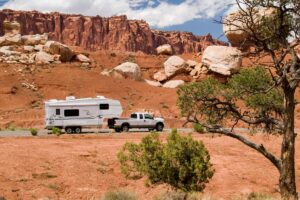
When purchasing an RV for full time living, many families prioritize space. However, bigger is not always better when it comes to RVs. Longer RVs are more difficult to drive, use more fuel and limit where you can stay.
When we initially purchased our 34 foot fifth wheel, we were worried that we would not have enough storage space. After years of living on the road, we know an RV between 25 and 30 feet would have been ideal for us.
Attend an RV Show
With all the RV options available, narrowing down the type and layout you want can be overwhelming. Attending an RV show allows you to tour hundreds of RV in a day or two.
Get an Inspection
When purchasing a used RV, schedule a professional inspection before committing to the purchase. We have heard so many horror stories of people buying an RV only to find out that it had thousands of dollars in water damage or other costly issues.
A professional inspection is also a good idea when purchasing a new RV. Just because the RV is new, doesn’t mean it is perfect. An inspection will allow you to identify issues, and request repairs before the sale is final.
Buy the RV before the Tow Vehicle
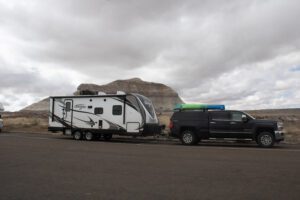
We found a great deal on a dually truck and purchased our tow vehicle a few months before purchasing the RV. However, it is ideal to purchase a travel trailer or fifth wheel first. That way, you know the required towing capacity of your truck.
Stay on Budget
As I detail in a subsequent section of this article, full time RV living is not necessarily an affordable lifestyle. Start your RV life out on the right foot by sticking to your budget.
Our RV life budget calculator can help you estimate the cost of your future RV life, so you can set a reasonable budget for your RV.
Included Desired Upgrades in your Budget
When determining the budget for your RV, don’t forget to account for any upgrades you plan to make. Most RVs will require some upgrades to make them safe and comfortable for full time RV living.
Review our list of 40 essential RV upgrades for ideas on what additions your home on wheels might require.
Compare Prices Online

In today’s world, it is easy to find out if an RV is priced fairly. Whether you are purchasing a new or used RV, browse online marketplaces, such as RV Trader , to see the going rate for the model you are considering.
Remember that RVs Depreciate Quickly
While most homes are considered an investment, it is important to remember that your home on wheels will depreciate. When setting your budget, remember that when it comes time to sell your RV, it will most likely be worth significantly less than you paid.
We purchased a new fifth wheel in 2016 for just under $50,000. Today it is only worth around $30,000. Depreciation will depend on your brand and market conditions, but you can use our RV depreciation calculator to estimate the future value of your RV.
Where You Buy Your RV Matters
When purchasing an RV for full time living, where you purchase your RV can be just as important as which RV you purchase. If you plan to return to the dealership for repairs and warranty work, then you need to trust the dealer.
Repair work can also take time, so it is ideal to work with a service shop that is located near friends or relatives who will let you stay with them while your RV is in the shop.
Video Tape the Walkthrough
When we purchased our fifth wheel, we had never camped in an RV. I paid close attention to the walkthrough and took notes, but I still had so many questions once we were parked at our campsite.
Instead of trying to remember every detail, ask you dealer for permission to video tape your walkthrough, so you can always go back and reference it.
Selecting Campgrounds and RV Parks
Once you have your RV, it is time to start planning your journey. Here are 10 helpful tips for selecting campgrounds and RV parks.
Book a Local Stay for at Least 1 Month
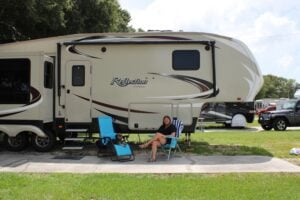
After you purchase your RV, you will be excited to hit the road and start your new life of adventure. However, we strongly recommend staying in the local area for at least one month after purchasing your home on wheels.
Staying locally for a few weeks helped us adjust to living in an RV, get organized and learn the ins and outs of our new rig before dealing with the stress and excitement of travel.
Being close to the dealership where you purchased your RV also gives you the opportunity to get any initial issues repaired before hitting the road.
Some Planning is Required
When we first moved into an RV, we pictured ourselves living spontaneously and moving whenever and wherever we felt like it. However, after trying to make last minute reservations at popular campgrounds, we quickly learned some planning is required.
Many destinations, such as National Parks, book up months in advance. We now try to create a tentative plan a year in advance, so we can always get a reservation at popular locations.
Book Winter Reservations Early
Winter reservations, especially, cannot be left until the last minute. The majority of full-time RVers and RV snowbirds, spend their winters in Florida, Texas or Arizona. Therefore, campgrounds in these states often fill up the day reservations open.
If you want to spend your winter enjoying warm weather, you’ll need to plan in advance.
Leave Some Room for Spontaneity
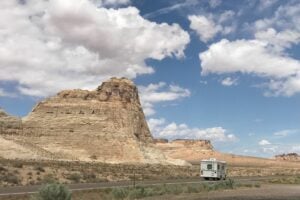
While planning is a necessity for full-time RVers, it is also important to leave room for spontaneity. There is nothing worse that hearing about an awesome hike or campground along your route, but not having enough time to stop and check it out.
After multiple incidents of wishing we had more time to explore, we have started leaving extra, unplanned days between destinations. With this wiggle room built into our schedule, we can extend a stay or stop somewhere cool along our route without messing up all of our plans.
Check Cancellation Policies before Booking
Another way we balance planning and impulsiveness is carefully reading cancellation policies. When booking a campground months in advance, we try to book sites that are fully refundable. That way we can change our plans without losing money.
Look at Real Campers’ Photos
Many RV parks, especially those that are part of large chains, have professional photographers take pictures for their website. To avoid disappointment, always check out photos from other campers on Google or campground review sites, like RV Life , before booking.
Prioritize Practical Amenities
Full-time RVers also need to prioritize practical amenities when booking campsites, especially for extended stays. For example, we love camping in state parks, but we typically stay for a week or less because these campgrounds usually don’t have laundry or full hookups.
Utilize RV Camping Memberships

One way we find campsites and save money is through our campground memberships, such as Thousand Trails and Harvest Hosts. Every full time RV family should have at least one RV membership.
Our complete guide to RV membership programs breaks down all the options available.
Boondocking is Great, Sometimes
If you are looking for free campsites with beautiful views, you should consider boondocking or dry camping on public lands. Boondocking often means staying at more spacious campsites, closer to nature.
However, boondocking also means conserving water and power, worrying about cell service and moving the RV when the tanks need to be emptied. While some full time RVers boondock regularly, we prefer to stay at full service RV parks the majority of the time.
When we find an awesome boondocking spot, we plan to take a few days off work and enjoy nature.
Don’t Forget to Apply for a Passport
Some of our most memorable RV road trips have been outside of the United States. We spent an amazing summer in the Canadian Rockies and a fun winter on the beaches of Baja, Mexico .
Make sure everyone in your family has current passports before you start RV living full time.
Travel Days with the RV
Travel days can be one of the most daunting parts of RV living full time. Follow these tips to ensure you stay safe and happy on the road.
You Need a Checklist
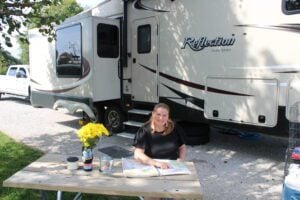
Even if you are an experienced camper, you need a checklist for RV travel days. After we got the hang of setting up and breaking down our campsite, we stopped using a checklist. Then, inevitably, we forget to lock cabinets and stuff got broken.
Having a checklist helps to ensure everything inside and outside the RV is properly secured. Download and print our free RV departure and setup checklists before hitting the road.
But Things will Break Anyway
While we highly recommend using a checklist, we also recommend always being prepared for a small travel day disaster. Driving down bumpy highways can be the equivalent of your home going through an earthquake.
Despite having everything secured properly, we have had light fixtures fall and break and cabinets fly open. Being able to handle a mess is a necessary skill for RV living full time.
Take it Slow
Some of the best advice we’ve ever received about RV living is to take it slow. Click here to see the worst RV advice we’ve heard .
By take it slow, I mean that RVers should literally drive slow. There are many reasons to drive slow. First, many RV tires are only rated for speeds up to 65 miles per hour. Driving slow also conserves fuel and helps prevent accidents.
I also highly recommend taking your time between destinations. Shorter travel days are less stressful and allow for a more enjoyable journey.
Pay Attention to Weather Forecasts
Many of the worst RV accidents we have seen or read about were due in part to weather conditions, such as high winds or heavy rains. Always check the forecast before a travel day and stay off the road if the conditions are not ideal.
Check the RV’s Tire Pressure
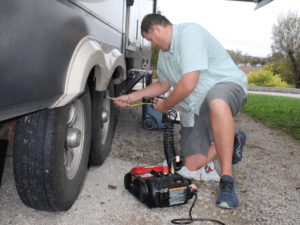
Always check tire pressure before hitting the road in your RV. The recommended tire pressure is noted on the sidewall of your tires. Traveling with an air compressor is ideal, so tire pressure can be adjusted before driving.
For even more peace of mind, install a tire pressure monitoring system (TPMS) that constantly tracks tire pressure and temperature.
Always Keep the Tank Half Full
There is nothing more frustrating or embarrassing than running out of fuel on your road trip. While hitting empty may seem unlikely, it definitely happens to many RVs traveling in remote areas where fuel stations are few and far between.
To avoid ever running out of gas, we never allow our tow truck to get below half-way full.
Plan Fuel Stops
We highly recommending planning your fuel stops, both to prevent running out of gas (or diesel) and to save money. Use RV travel apps to check gas prices and find RV friendly fuel stations along your route.
Make your Own Food
Another way to simplify travel days is to make your own food. Having food already packed means you can stop at any fuel station, instead of needing to find parking at restaurants.
Preparing your own travel day meals and snacks also helps full time RVers stay healthy on the road . Most easily accessible restaurants are unhealthy fast food options, and those get old quickly when you travel frequently.
Don’t Trust Google Maps
To select the best route for RV travel, use a road carrier’s atlas to identify routes appropriate for larger vehicles. Do not rely solely on navigation apps, like Google Maps, which may take you down narrow or winding roads or suggest you take multiple U-turns with your RV.
However, we do leave the Google Maps app open on travel days to alert us to delays, such as traffic jams or crashes.
Always Have Some Cash
Another important lesson we have learned while RV living full time is that we always need to have some cash on hand during travel. We have been through cash-only toll booths and stopped at remote gas stations where the credit card machine was down.
Travel with an Emergency Kit
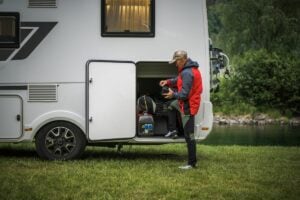
Even the most well prepared full time RVers will likely experience some sort of roadside emergency, like a blown tire. We actually had three blown tires before we upgraded our wheels.
To make these situations easier, purchase a roadside emergency kit. STDY’s roadside emergency kit includes a first aid kit, tow rope, reflective warning triangles, work gloves and more.
Take Advantage of Travel Time
When we first hit the road, travel days were my least favorite days. I would spend my time in the truck counting the minutes until we arrived at our next destination. However, after several years on the road, I have changed my attitude.
Travel days are a great opportunity to enjoy time with your spouse or family and to learn new things. I now look forward to our time in the truck, when we listen to podcasts or audio books, talk to each other and plan future adventures.
The (Literal) Cost of RV Living Full Time
One of the most frequently asked questions we get about RV living full time is “How much does it cost?”. While there is no one-size-fits-all answer, we can share plenty of tips to help you develop your own full time RV living budget.
RV Life Isn’t Cheap
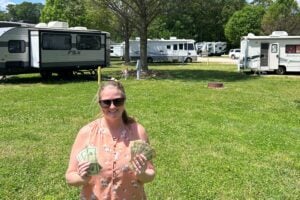
One of the first lessons we learned about RV living is that it isn’t (necessarily) cheap. While we no longer had a house payment, we had many new expenses. Rent for RV parks and fuel for our tow truck cost way more than we had originally expected.
We also spent more on eating out and entertainment, since there were always new places and experiences to enjoy. Over the years, we have reined in our budget by following the rest of the tips in this section.
Budgets Should be Planned Annually
While many families stick to a monthly budget, full time RVers should set a budget annually as monthly expenses can vary widely.
For example, some months we pay $500 for a monthly campsite and have low fuel expenses as we don’t travel far. Other months, we travel frequently and spend over $1500 on fuel.
Setting an annual budget at the beginning of the year allows us to splurge some months without ever spending beyond our means.
Traveling Slower Equals Traveling Cheaper
We have also learned that slower travel is easier on our wallets. Traveling shorter distances means we spend less on fuel. Staying in one place longer also allows us to truly enjoy each place we visit.

Monthly Rates Can Save You Money
Looking for campgrounds with monthly rates is one of the best ways to save on RV expenses. We can save hundreds of dollars each month on rent by booking long-term stays instead of paying nightly rates.
Eating In is Tough, but Key to Saving
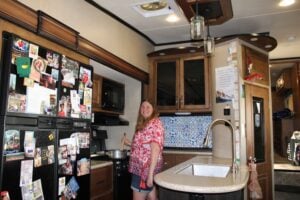
As I noted earlier, we love visiting new restaurants in each location we visit. However, eating out frequently is an easy way to blow your budget.
We do our research and pick a few must-visit dining options in each area, but we cook 90% of our meals in the RV.
Consider the True Value of a Storage Unit
Storage units can be another major expense for full time RV families. When we moved into our RV, there were a few items we couldn’t bring on the road but weren’t ready to give away. So, we ended up renting a small storage unit.
After years on the road, we have not pulled a single item out of storage, and we regret getting the storage unit every month when the $100 bill has to be paid.
If you plan to live on the road for a set period of time, it may be financially sensible to store furniture and other items. However, if you plan for your full time RV living journey to last for years, seriously consider whether the storage unit bill is worth holding onto more stuff.
Have a Reasonable Repair Fund
Before hitting the road, every full time RV family should have an RV maintenance and repair fund. The amount needed in your repair fund will depend on the age of your RV and whether or not you have an extended warranty .
We personally budget $250 per month ($3000 per year) for regular service and unexpected repairs. When not used, our monthly repair budget is put into a savings account.
Since our new RV did not require many repairs in the first few years, we had enough money saved to cover the costs of major repairs, including a new roof.
Pause Before Purchasing
Downsizing your possessions is one of the first steps in the process of RV living full time. However, it can be easy to accumulate more stuff as you travel. Even after years of living on the road, we still purchase unnecessary items that end up being donated in our next purge.
To avoid purchasing things we really don’t need, we try to follow the pause before purchasing rule. If we see a new RV gadget that looks cool, we don’t purchase it right away. Instead we wait a week or two, then decide if the purchase is really sensible.
Free Adventures can be the Most Memorable
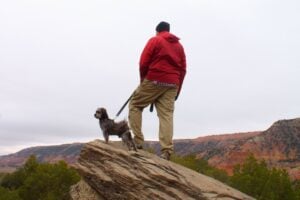
One great way to save money while traveling is to prioritize free adventures. Many of our most memorable experiences are hikes that cost us $0. We also look for free events, such as live music and local fairs.
Workamping is a Great Way to Save
Another great way to save is to find a workamping job . While workamping is a primary income source for some full time RVers, others, like us, use workamping jobs as a side hustle.
Since our work schedule for the blog is flexible, Justin sometimes also takes a workamping gig where he earns extra money and we get free campground rent and other perks.
Working from the Road
Unless you start RV living full time after retirement, you will need to find a way to earn money on the road. If you need travel-friendly job ideas, see our list of the 7 best careers for RV living.
Weigh Entrepreneurship vs Telecommuting
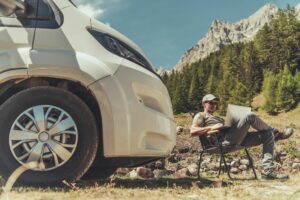
One of the first decisions to make when selecting a career for RV living full time is whether or not to start your own business. Being an entrepreneur with a flexible schedule sounds ideal for RV living, but it isn’t that simple.
Starting your own business can be stressful, especially when you are making another major life change by moving into an RV. Before quitting your 9 to 5, really consider if being a entrepreneur makes sense for you and your family.
During our first three years on the road, I telecommuted to a demanding corporate job. I worked 50+ hours a week and could only explore on weekends.
After starting this blog as a side hustle (and working even more hours each week for a year), I was able to quit my job and make more time for adventure. Running my own business is amazing, but it took a lot of time and effort to make it work.
Also Weigh Time vs Money
When considering how you will earn money on the road, it is also important to weigh time vs money. With remote work becoming more acceptable, RVers have more job opportunities. However, the highest paying job may not always be the best for full time RV living.
If you moved into an RV because you wanted to spend more time living life, then really consider the work-life balance when accepting a new position.
A Flexible Schedule is Ideal
Any job with a flexible schedule is ideal for full time RVers. Setting your own work hours allows you to go out and explore when the weather corporates.
For RVers who are stuck in a 9 to 5, using time zones to your advantage can help create more time for exploration. For example, if you work on eastern time, you can travel to the west coast, wake up early for work and have hours of daylight left when you log off.
One Internet Option Isn’t Enough
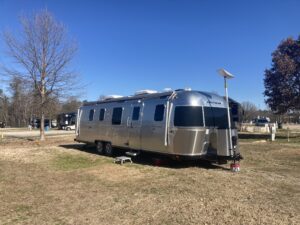
If your job is online, one internet option will not be sufficient. While it is possible to get internet almost anywhere these days, each connection option has limitations.
To make sure they are always connected, many full times have both a mobile hotspot plan and a Starlink dish. We personally have 2 mobile hotspots from different providers. See our complete guide to internet options for RV living for more details.
Noise Cancelling Headphones are a Must
If your job involves virtual meetings, you need a great pair of noise cancelling headphones. Without them, kids playing in the campground, neighbors’ dogs barking and the pounding of rain on the RV roof can all ruin an important meeting.
Even if your job doesn’t involve many meetings, noise cancelling headphones can help block out campground noise and keep you focused.
A Desk is a Non-Negotiable
Our RV did not come with a desk, and I spent my days working from our RV’s recliner for several years. My back, hips and posture all suffered terribly. If you work from a computer, either buy an RV with a desk or include a desk in your RV renovation.
Try to Face a Window
When shopping for RVs or planning your renovation, try to select a floorplan that allows you to place your desk by a window. Being able to look out at the views makes working from the RV a much more pleasurable experience.
But, Know Sometimes your View Will Be Another RV
While I enjoy my window views on most workdays, sometimes the scenery isn’t ideal. Be realistic when dreaming about RV living full time, and understand that some days your view will be stunning and other days you will be looking at your neighbor’s RV.
Working Outside Doesn’t Always Work
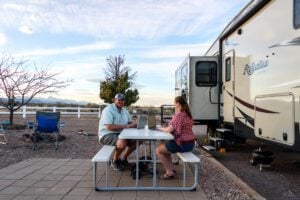
Before moving into the RV, I thought my new life would include many days spent working outside. However, I quickly learned that working outside isn’t all it is cracked up to be.
The glare from the sun can make it impossible to see your laptop screen, and winds often prevent me from putting the awning out to create shade. On perfect, temperate cloudy days I enjoy an outdoor workday, but most of the time my desk inside is a better option.
Make Sure your Spouse’s Job is Compatible with Yours
If you and your spouse both plan to work from your RV, you need to ensure that your jobs are compatible for tiny living. If you both plan to telecommute, you need a plan for what you will do when you both have meetings at the same time.
RV Living Logistics
RV living full time involves a lot of admin! Read our lessons learned about RV living logistics to make your first year on the road easier.
Domicile is Complicated
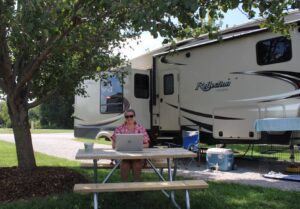
RV domicile refers to the place full time RVers legally define as their home, when they do not have an actual house or property that serves as their permanent and principal home.
Many new full time RVers, plan to move their domicile to a state with low taxes, but establishing domicile in a new state can be complicated. Read our complete guide to RV domicile before making a decision on where to establish residency.
Full Time RVers Still Have to Serve on Juries
Since moving into our RV, we have both been summoned for jury duty multiple times. Even though we don’t really live anywhere, we still have civic responsibilities in our domicile location.
When we are across the country on the date of our summons, we request a deferral as we are on an “extended road trip.” However, if we are within a day’s drive of the court location, we try to modify our plans so we can serve on the jury.
Snail Mail Isn’t Dead
When we moved into our RV, I made sure all of our accounts were set to paperless so we would receive digital bills. However, I quickly learned that many documents, including insurance paperwork and vehicle registrations have to be sent through snail mail.
Before starting RV living full time, you need to find a long-term mail solution . RV mail options include a trusted family member or an RV mail forwarding service.
You Must Have Full Time RV Insurance
Buying RV insurance is not as simple when you plan to live in your RV. When shopping for policies you must disclose that you will live in your RV, and find a policy that covers RV living full time.
We’ve heard horror stories of full timers who purchased standard RV insurance and were denied coverage when the company learned they were living in the vehicle.
Plan an Annual “Home” Visit
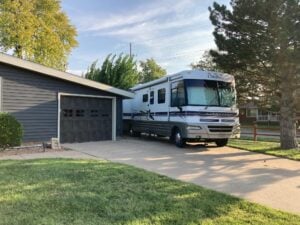
Like all people, full time RVers, still need to have regular check-ups, renew their drivers’ licenses and perform other mundane tasks.
To avoid having to find new providers all over the country, we recommend scheduling an annual “home” visit, where you return to your domicile location and complete all your annual appointments
Affordable Health Insurance is Difficult to Find
If you choose to workamp or start your own business to fund your RV lifestyle, finding affordable and reliable health insurance can be a major challenge. See our complete guide to health insurance options for full time RV living to find the best solution for your situation.
Always Locate Emergency Services
Since we are RV living full time, it is not uncommon for me to have to think about what town or state I am currently in, and I usually don’t know my way around without a GPS.
But, you never want to have to think about where to go in the middle of an emergency. The day you arrive in a new location, always look up the nearest emergency room and emergency vet and save the location in your phone or GPS.
Downsizing is a Constant Process
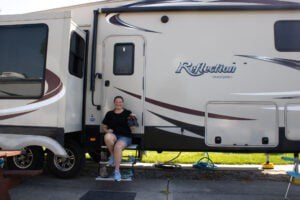
Downsizing is not just something you do before moving into an RV. It is a constant process. As you spend more time on the road, you will learn more about what you really do and don’t need. Be prepared to constantly analyze what stays, what goes and if you really need to buy something new.
Being Organized is Important
Before RV living full time, I was a mess (literally). My office desk was always covered in papers, and my closet was a disaster. However, living tiny makes organization a necessity.
Everything in your RV should have a place and you should clean regularly to prevent any clutter from getting out of hand.
RV Maintenance and Repair Realities
Like any home, an RV requires regular maintenance and repairs. Follow these tips to ensure you RV stays in tip top shape.
Black Tank Maintenance is Simple, but Important
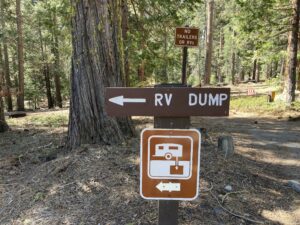
One RVing task most new campers dread is emptying the black tank. The reality? It’s not that bad and you will get use to it within a few months of moving into your RV.
While emptying the black tank is easy, it is super important to do it the right way. Rookie mistakes can lead to big problems down the road. Follow our step by step guide to emptying your tanks and you shouldn’t have any problems.
RV Repairs Can Take Months
One RV life reality we were not prepared for was the amount of time RV repairs can take. When our RV needed a new roof, we called almost a hundred shops and the shortest timeline was 2 months!
A Warranty May Be Useless
Another expensive lesson we learned is that an RV warranty may be useless for RV living full-time. We purchased a new RV, specifically because we wanted a warranty. However, warranty approval often added even more time to the repair process.
The expenses involved in changing plans and finding other accommodations usually made it more affordable to pay cash for repairs instead of waiting for warranty approval. By the time our first RV needed major repairs, our warranty had already ended.
For our next RV purchase, we purchased an extended warranty that covers service calls and has a super quick pre-authorization process.
RV warranties can be worthwhile, but it is important to understand the terms and required approval process to determine the real value. Read our guide to what RV extended warranties cover to learn how to pick the right policy.
Full Timers Need a Back-Up Accommodation Plan
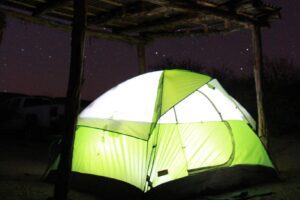
If you live in an RV long enough, eventually a major repair will be required. Therefore, all full time RV families need a back-up accommodation plan. When our RV has to be in the shop for an extended period of time, we are lucky enough to have family we can stay with.
If you don’t feel comfortable staying with friends or family for an extended period, make sure your repair savings fund has enough money to cover the cost of a hotel or AirBnb.
For a cheaper option, we’ve used repairs with shorter timelines as an opportunity to take a tent camping trip.
DIY RV Maintenance is Key for Full Timers
Given the long wait times at most RV repair shops, RV maintenance is an essential skill for full time RVers. While learning how to properly maintain your RV may sound daunting, I promise you it is doable.
When we moved into our RV, we knew NOTHING about RV maintenance. Now, we are experts. Purchase our eBook, The Owner’s Guide to RV Maintenance , to learn how to take care of your RV.
Track Mileage after Every Trip
One key aspect of RV maintenance is knowing how many miles you put on your RV. If you drive a motorhome, you can simply use the odometer. However, full timers with travel trailers and fifth wheels need to log their mileage after every trip.
When Troubleshooting, Keep it Simple

The most important lesson, we have learned about RV repairs is to stay calm and start with the simplest solutions. For example, if your furnace stops working, double-check that the propane tank isn’t empty before moving on to more complicated solutions.
90% of RV issues are easily fixed. When troubleshooting, always start with the easiest solutions.
Call your Manufacturer for Advice
Another RV troubleshooting tip is to call your manufacturer for advice. If your issue is common, they may be able to help you pinpoint the problem quickly.
Or Call Lippert
Lippert, a company that makes tons of RV parts (stairs, jacks, leveling systems, awnings, axles and more), is also a super helpful troubleshooting resource. If you are having issues with a Lippert part, simply call their customer service line.
I have called Lippert multiple times for jack issues and their knowledgeable support staff walked me through the fix step-by-step.
Utilize your Brand’s RV Forum
Another great RV troubleshooting resource is your brand’s online forum. There is an online forum for almost every RV manufacturer. These are a great place to ask questions and get answers from other campers who have the exact same model as you.
Always Take Photos before Starting a Repair
Even if a repair seems simple, always take photos before you start. When putting something back together or installing a new part, it can be super easy to forget where a wire was plugged in. Taking photos will save time and prevent frustration.
RV Living Full Time with Pets
Many full time RVers travel with pets. If you plan on bringing your cat or dog along on the journey, follow these tips for RV living full time with pets.
Consider Pets when Buying your RV
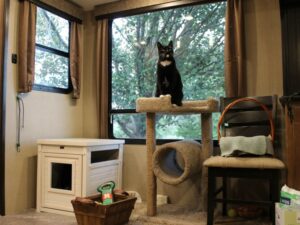
You need to start considering your pets’ needs before you select an RV. If you are traveling with a cat, make sure you think about the litter box and scratch pad placement when selecting floorplans.
Keep in Contact with your Home Vet
Earlier, we recommended having an annual “home” visit for doctor appointments. We recommend doing the same with your vet. That way, you can have all your pets’ annual vaccines and check-ups completed by the same vet.
While you may need to visit new vets for unexpected injuries, having a regular vet you trust is important. If your trusted home vet understands your living situation, they will likely also be willing to answer questions over the phone.
Ask Vets to Print Records
Every time you visit a vet, ask them to print out a copy of your pets’ records. The records are very helpful to new vets you have to visit on the road, and vaccine records are sometimes required at campgrounds.
Use BringFido to Find Local Dog Friendly Establishments
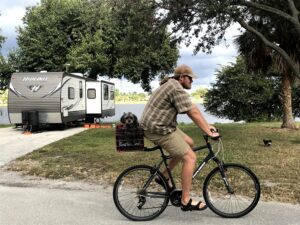
No one brings their dog on the road, just to leave them behind at the camper all the time. Use the website BringFido to find dog-friendly restaurants and activities in any town.
Keep a Stash of your Pets’ Regular Food
Changing your pet’s food suddenly may lead to digestive issues. To prevent having to change food, always keep at least a two week stash of your pet’s regular food, so you have time to order more online if you cannot find it in local stores.
Grooming Appointments Need to Be Planned
Any dog owner knows that most dog groomers are booked up weeks if not months in advance. Getting appointments is even harder when you are going to new groomers all the time. Try to plan your travels, so you can make grooming appointments at least two months in advance.
Pets Can’t Always Be Left Home Alone
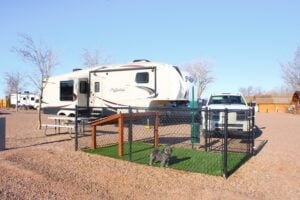
While it is generally safe to leave your pets in your RV, this is not always the case. If you plan on boondocking, you need to check weather to ensure your pet is safe to be left alone without air conditioning.
Even when connected to shore power, it is possible for the A.C. to go out due to a power outage. Installing a temperature sensor allows you to monitor temperature inside your RV from your phone, so you always know your pet is safe.
Never Let your Pet Roam Free at the Campground
While we definitely encourage taking your pets on all the adventures, you should never let your pet roam free at a campsite. Having your pet off leash puts them in danger from cars and other campground pets. It is also against the rules at most campgrounds.
Even if you are camping in the wilderness, it is not advisable to let your pet off leash. They may get hurt by the local wildlife (or they may hurt the wildlife). If you have a cat that loves to be outside, consider leash training or buying an outdoor enclosure.
Essential RV Living Gear
We often talk about downsizing for RV life, but RV living full time also requires a lot of specialty gear. Here are RV living essentials every full time family should own. To save you time, we’ve put links to all of this gear on an Amazon shopping list.
RV Holding Tank Essentials
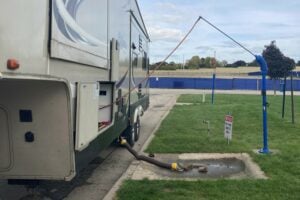
RV holding tank essentials, include at least 20 feet of sturdy sewer hoses, sewer hose supports and a separate garden hose for flushing your black tank. We also recommend a reverse flush valve, which is a handy tool for breaking up black tank clogs .
Surge Protector
Surge protectors are one of the most important pieces of equipment to protect your RV. Surge protectors should be used every time your plug into shore power.
These devices protect your RV from surges due to lightening or other issues. Newer models also protect your RV from incorrect wiring and electrical issues at campgrounds.
Water Pressure Regulator
Another essential piece of equipment for campsites with hookups is a water pressure regulator. High water pressure can bust RV plumbing connections and cause leaks (or full on floods).
Buy an adjustable regulator to make sure you stay between a safe range of 40 to 60 PSI.
Tire Gauge and Air Compressor
A handheld digital gauge allows you to check tire pressure before you travel. We also recommend traveling with a portable air compressor so you can adjust the tire pressure before hitting the road, instead of having to drive to a service station.
Leveling Blocks
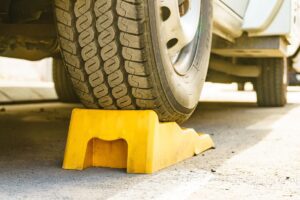
These easy to stack blocks allow you to level your RV on uneven ground. They can also be placed under jacks for added stability.
Power Adaptors
Not all campgrounds have both 30-amp and 50-amp plug-ins . If you have a 50-amp RV, you will need 30 amp and 15 amp power adapters. These adapters will allow you to plug into lower amp connections at campgrounds where 50 amp power is not available.
If you have a 30-amp RV, you need a 30 to 50 amp power adaptor, so you can still connect at RV parks that only have a 50-amp plug.
A Basic RV Tool Kit
Earlier, we talked about the importance of routine RV maintenance. To complete this maintenance and other basic RV repairs, you will need a stocked tool box. See our RV tool kit checklist for all of our recommendations.
Alternate Power Sources
If you plan on dry camping or boondocking for any extended period of time, you will need portable power sources. These include solar panels and generators. See our complete guide to RV boondocking for more information.
RV Safety Devices
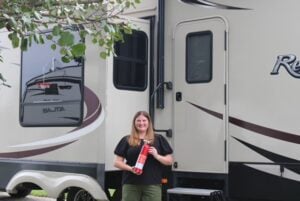
Every RV needs to be equipped with gas alarms (to detect propane and carbon monoxide), fire extinguishers and smoke alarms.
An RV Log Book
Finally, every full time RVer needs a log book to track their mileage, schedule maintenance and to record details about campsites. After several years on the road, it can be difficult to remember where you stayed during your last visit to each area.
Other Full Time RV Living Tips
There is so much to know about RV living full time that we have one more section of random tips for living on the road.
Find Out if You Like RVing before Moving Into One
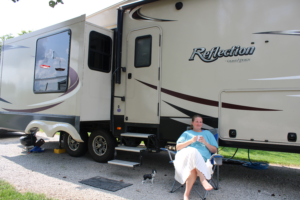
Okay, this one may seem obvious, but it is important to find out if you like RVing before you sell your house and move into an RV. We had never been RVing before moving into one. Fortunately, we love the lifestyle!
However, we have spoken to a few full timers over the years who regret the decision to sell all their stuff. Consider renting an RV and taking an extended road trip before you jump feet first into RV living full time.
Think Hard before Renovating
Fully renovating an RV is a ton of work and can cost a lot of money ! Fortunately, many RVs available today come with beautiful, modern interiors .
If you decide to renovate your RV, we highly recommend living in it for at least a few months before you start. It is important to understand your travel day routine and how you use each space before diving into an expensive renovation.
Leave No Trace
Whether you are camping in the wilderness, at a state park or at a resort campground, you should leave your campsite as clean or cleaner than you found it.
In recent years, many popular boondocking sites have been shut down because RV campers were leaving their trash behind.
Magnets are the Best Souvenirs

When RV living full time, it can be difficult to find souvenirs that don’t take up too much space. We’ve found that magnets are the perfect solution. They are small, available at every destination and can be stored right on your refrigerator.
In our first few years of RVing, we collected stickers, but sadly realized we will lose all of these when we eventually move into a new RV.
National Park Stamps are Also a Great Souvenir
Another great souvenir is a National Park Passport. These passport books are made to collect ink stamps from each National Park site that you visit.
Simply, take your National Park Passport to any visitor center or park store and get a free ink stamp with the date and location of your visit. I really wish, I had purchased one of these books before our first National Park adventure!
Sweeping is a Daily Chore
When downsizing for RV living full time, don’t get rid of your broom. If you are traveling with pets or kids, your RV will constantly be full of dirt and sand. Cleaning an RV is pretty easy, but sweeping is a daily chore.
Wheels Can Save You and Your Home
One of the many great things about full time RV living is that it is easy to move your home. If you are ever in an area where a tropical store, hurricane or other major weather event is predicted, then pack up and move away from the storm.
The Journey is More Important than Checking Off a List
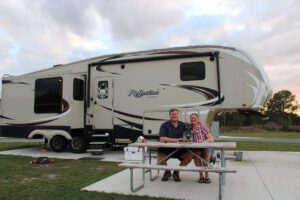
When we first hit the road, we regularly counted the number of states and National Parks we had visited. However, we soon realized that enjoying the journey is more important than checking off a list.
We’ve met many full-time RVers who visited every state within a year or two. These speedy travelers seem exhausted. Focus on enjoying exploring an area, instead of rushing off to the next location to hit some arbitrary goal.
Full Time RVers Don’t Need to Give up Their Hobbies
Downsizing for RV living full time doesn’t mean giving up things you use and love. We have two sets of golf clubs, a sewing machine and a hula hoop in our RV. If there is an activity you love, there is always a way to make room for it in your tiny home on wheels.
RV Life Isn’t a Vacation
Finally, it is important to remember that RV living full time doesn’t mean always being on vacation. Living the RV lifestyle definitely means we are on vacation more than the average family, but we still have to deal with all the realities of life.
Thanks for reading our complete guide to full time RV living. If you’ve made it this far, you should be truly prepared for life on the road.
Now for the fun part! See our list of the 10 best RV road trips , and start planning your first adventure.
Happy Camping!
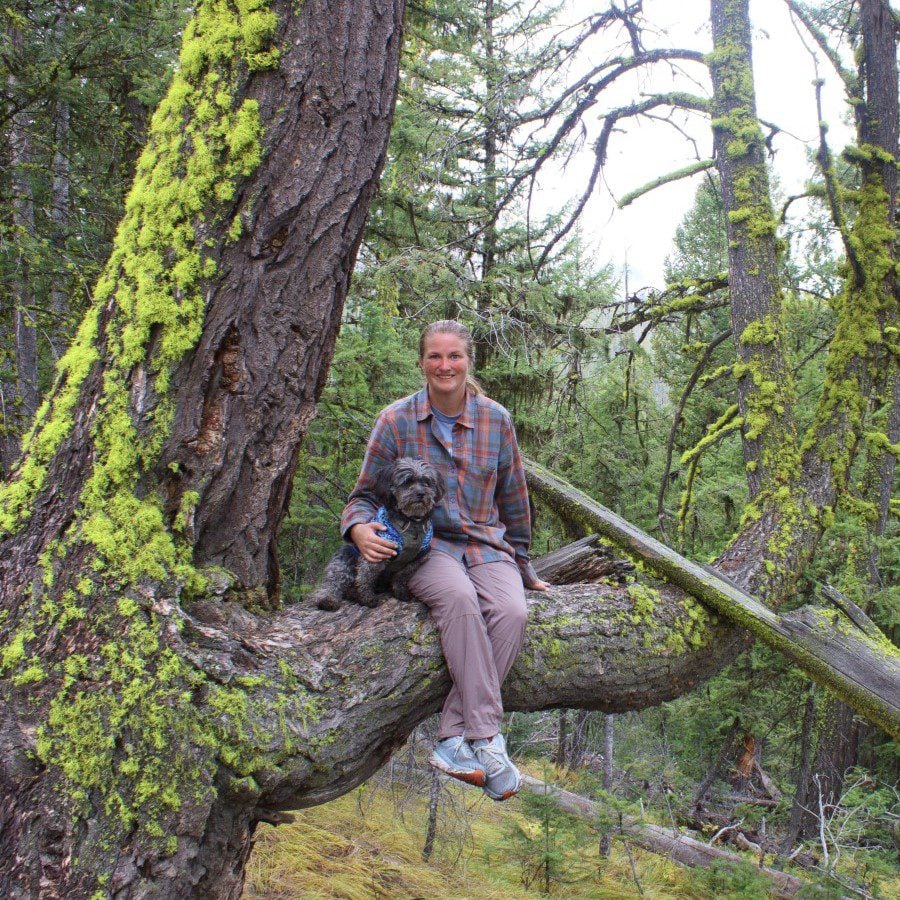
Christina Pate is a seasoned full-time RVer who, along with her husband Justin, has journeyed across the US, Canada, and Mexico. Drawing from her extensive travels, RV repairs and RV renovations, she founded Travels with Ted to guide and inspire fellow RV enthusiasts. Christina is also the co-author of The Owner’s Guide to RV Maintenance and the creator of My RV Log Book .
RV Life: Guide to Full-Time Living on the Road

Get Started Living in Your RV Full-Time
Living in your travel trailer during a road trip or short-term vacation can be an enjoyable experience when everything is done correctly and your plans fall into place. It may even convince you you are cut out for full-time RV living. Contrary to popular opinion, full-time RV living is not as easy as it may seem – especially to those with limited experience or knowledge of everything included in this hefty package. This beginner’s guide will at least help you get started on the right foot by outlining everything you need to know to be successful.
Multiple Test Runs is Essential for Full-Time RV Living Success
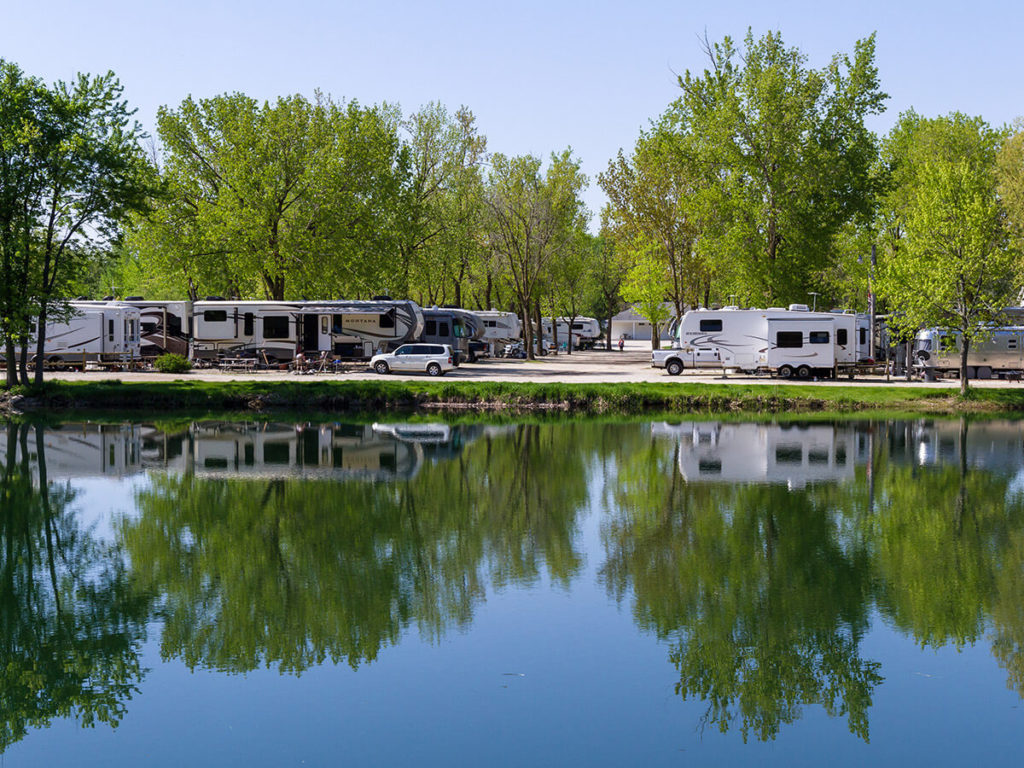
Before you dive into the beautiful world of full-time RV living, you should schedule a series of trial runs. This differs from the lifestyle type, where you can go from 0 to 60 overnight. For instance, if your only experience with RV living is the weekend road trip you took with your family across state lines, that is not enough. You should “test the waters” by planning a series of test runs.
As you embark on your trial runs, consider extending your stays gradually. This will provide a more realistic experience of full-time RV living. Start with shorter stays of 3-5 days, then gradually increase to 3-5 weeks, and eventually 3-5 months. This gradual progression will help you adjust and prepare for the transition from your typical home life to a life on the road.
Space Matters: Finding the Perfect Fit for RV Living
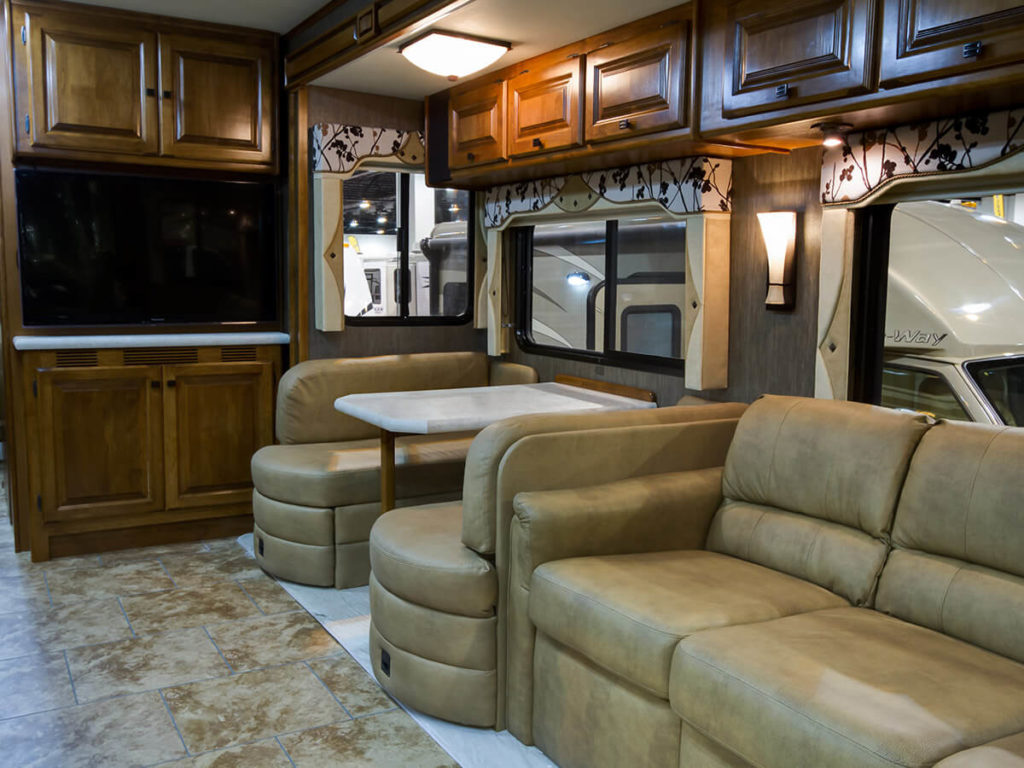
Another important part of preparing you for full-time RV living is to analyze the size of your RV. Size matters when it comes to packing up and taking your life on the road. For instance, you may have rented a more compact RV from Point A to Point B during your last vacation. However, it would help if you remembered that your space requirements will drastically change with full-time RV living.
It is highly recommended that you test different rig sizes when scheduling your trial runs and short-term vacations. This will make you comfortable with the various options available to you and help you accurately determine which option is the most practical fit for your specific needs. See a few travel trailers for sale .
Test Drive Your Future: How to Simulate RV Life Before Making the Leap
Once you identify your specific RV needs for this full-time life change, it is time to go shopping! Remember that this is not the same as shopping for any other vehicle. You are not buying a new car or minivan – you are essentially buying a home. Therefore, you should approach this shopping experience like any real estate transaction. Test Drive Your Future: How to Simulate RV Life Before Making the Leap
- Shop with a few different RV dealerships /agencies to find the best deals.
- Visit and explore the RVs in person. Online listings and photos will only tell you some of what you need about your future home.
- Simulate RV life within each option that you seriously consider. For instance, lay on the bed to test its space limitations and comfort duration. Pretend to use the kitchen as if you were cooking a meal. Use the bathroom, sit in the tub, stand in the shower, etc.
One part of the RV shopping experience that is similar to vehicle shopping is the test drive. In addition to sitting in the driver’s seat, you need to be able to take the RV out on the road for a test drive to ensure it is a solid match.
Get Hands-On with Your RV’s Maintenance and Repairs
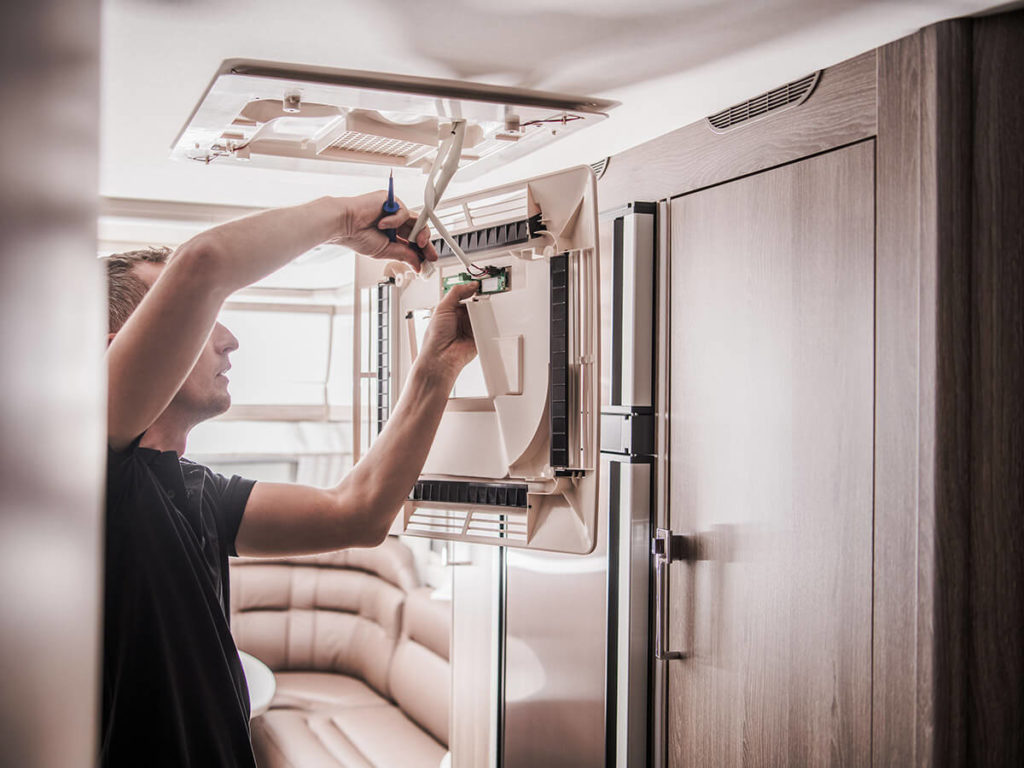
When renting an RV for a short-term vacation, you do not have to worry much about the maintenance side of the equation. Depending on the conditions of your contract, the rental company can bear the bulk of this weighty burden on your behalf. When you live in an RV full-time, that entire burden is placed on your shoulders.
Does this mean that you should be an expert mechanic (or at least have one living with you) to be successful? No! It would help if you spent quality time with the RV – getting to know your future “home on wheels” much more than you currently do. For instance, focus on the fuse box, electrical system, and other critical elements under the hood.
One of the key aspects of RV maintenance is the ability to identify issues early. From poorly sealed windows and roof leaks to wiring issues and engine tune-ups, it’s crucial to spot the telltale signs and warning signals before they escalate into RV life-threatening disasters. This preventative approach to maintenance can save you from costly repairs and ensure the longevity of your RV.
Simplify and Streamline: How to Declutter and Organize Your RV Inventory Like a Pro
You may not realize it, but the old saying that “you can’t take it with you” also applies to full-time RV living. As you walk through your home, you must accept the grim reality that you cannot take everything with you. It would help to change your perspective regarding your expanding collection of “closet clutter” and general belongings. In fact, instead of viewing them as your “personal belongings,” refer to them as part of your inventory. This will help you remove (or at least reduce ) your emotional and mental attachments, allowing you to view it more as a business owner than a homeowner.
Determine the high-priority essential items that will require a space within your RV.
More importantly, prepare to “cut the fat” and sever ties with the nonessential items . Perhaps you can donate those items to charity or give them away to family & friends. You could even sell them in a yard sale or online auction. It would help if you also considered investing in a self-storage option to store the items you cannot get rid of entirely but cannot fit in your RV.
A cornerstone of successful full-time RV living is simplicity. You must simplify your belongings to be ready for this significant lifestyle change.
Dollars and Sense: Mastering the Art of Budgeting
First-time RV travelers and other novices of full-time RV living may need to fully understand the vital role played by their budget. A common misconception is that you will spend a lot less money on the road than when you lived in a home that could not hit the highway. This type of trap will lead you to burn a large hole in your bank account and perhaps kill your dream of full-time RV living.
Create a strict budget before you hit the road . More importantly, calculate the various streams of income that you will still be able to generate behind the wheel.
For instance, you should consider your:
- Current balance of checking & savings accounts
- Income from interest-bearing financial accounts
- Income from remote work that you can do on the road
- Residual income (perhaps from commissioned sales)
- Retirement/disability/Social Security income (if applicable)
You must also focus on the short-term and long-term expenses you must pay at different stages of your life on the road.
It is easy to think about the standard vehicle-related expenses, such as oil changes, engine tune-ups, and gasoline fill-ups. However, the broad scope of full-time RV living includes several additional expenses.
For instance, you must consider the:
- Campground expenses (if you plan to stay in RV parks and campsites each night)
- RV ownership expenses (i.e., monthly payments, insurance premiums)
- Maintenance, repairs, and other unexpected/unscheduled expenses
- Groceries, clothing, and other basic living expenses
- Comforts and recreation (i.e., dining out, entertainment, shopping, etc.)
Family Matters: Meeting the Needs of Every Member for RV Living Success
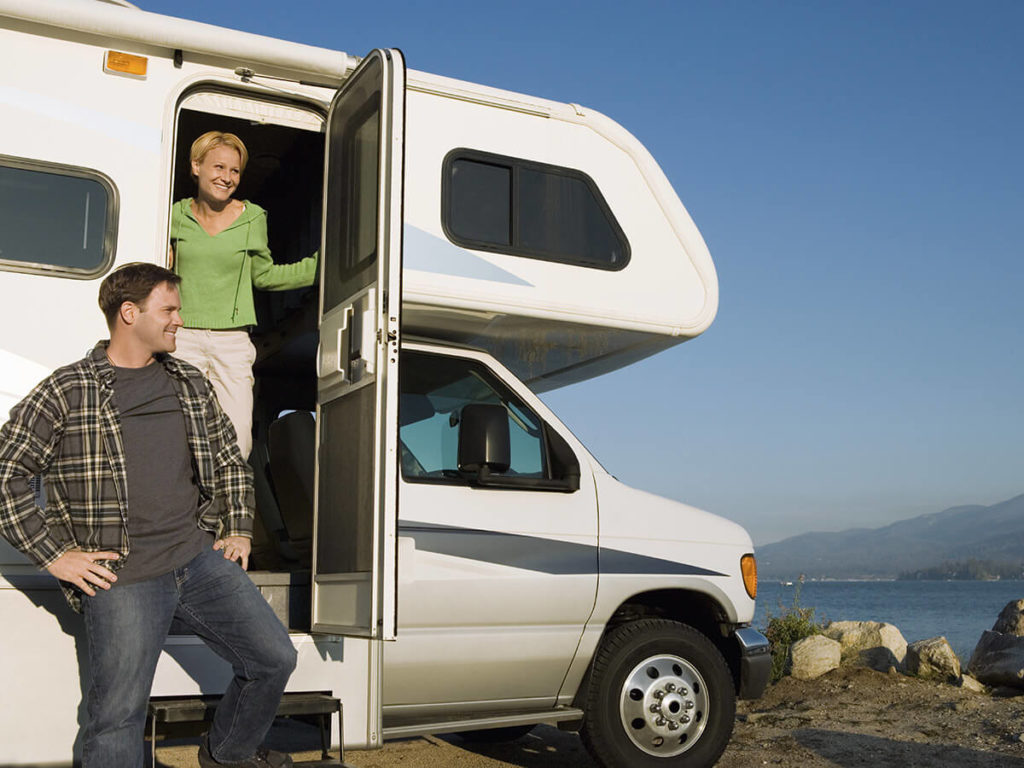
You must carefully consider your family’s short-term and long-term needs before you commit to living in an RV full-time. Once again, it is easy to think, “My family loved the RV lifestyle during our last vacation!” However, spending a weekend, week, or even a couple of summer months in an RV does not automatically mean your family can handle full-time RV living.
Take the time to consider the needs of each family member. For instance, you should think about such areas as:
- Healthcare (i.e., in-network vs out-of-network medical costs, etc.)
- Education (i.e., homeschooling children, online college courses, etc.)
- Social life and personal development
It would help if you also considered the needs of your canine and/or feline family members. This will play a significant role in your campground selections because not all campsites are pet-friendly. In addition, there are additional expenses associated with having pets on the road. Fortunately, there are veterinary providers with branches and locations throughout the country.
However, you will still have to consider factors such as the temperature of your RV, microchips, vaccinations, waste disposal, and the various stops you will need to make just to cater to their needs. Therefore, an even bigger question to ask yourself is, “Will my pet(s) need to find a new home?” You may be able to answer that question with a resounding “NO!” Nonetheless, it is still a question that you must ask and honestly answer.
Off the Grid and Thriving: How to Prepare for Life Off the Beaten Path
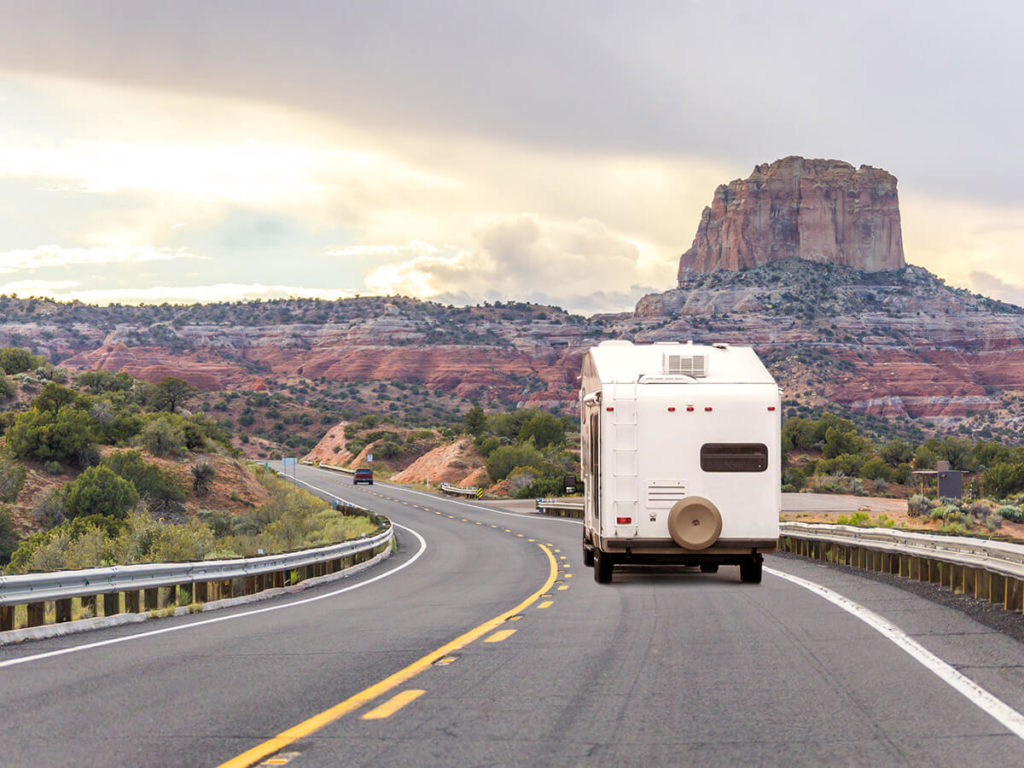
The popularity and prevalence of the Internet make it nearly impossible to imagine living life “off the grid.” Fortunately, even when living in an RV full-time, you can remain connected to the outside world. However, you may need to get creative and make a few wise investments to prevent extended downtime before you hit the road.
For instance, you may need to use your smartphone as a Wi-Fi hotspot on the road. Therefore, you may need to reexamine your existing data plan to see if any upgrades are required. Perhaps you could also benefit from buying a cell signal booster or investing in a satellite option to keep you connected – especially if remote work will play a major role in your monthly income streams. Consider the wide variety of coffee shops, rest stops, libraries, and other public Wi-Fi hotspots you will encounter on the road.
A good tip is to get used to living detached from the Internet and “the grid” now. Regardless of the signal boosters and hotspots you may have, you will inevitably encounter dead zones along the way where you will have no other choice but to live offline for a while.
Explore and Connect: The Value of Research and Networking in the RV Community
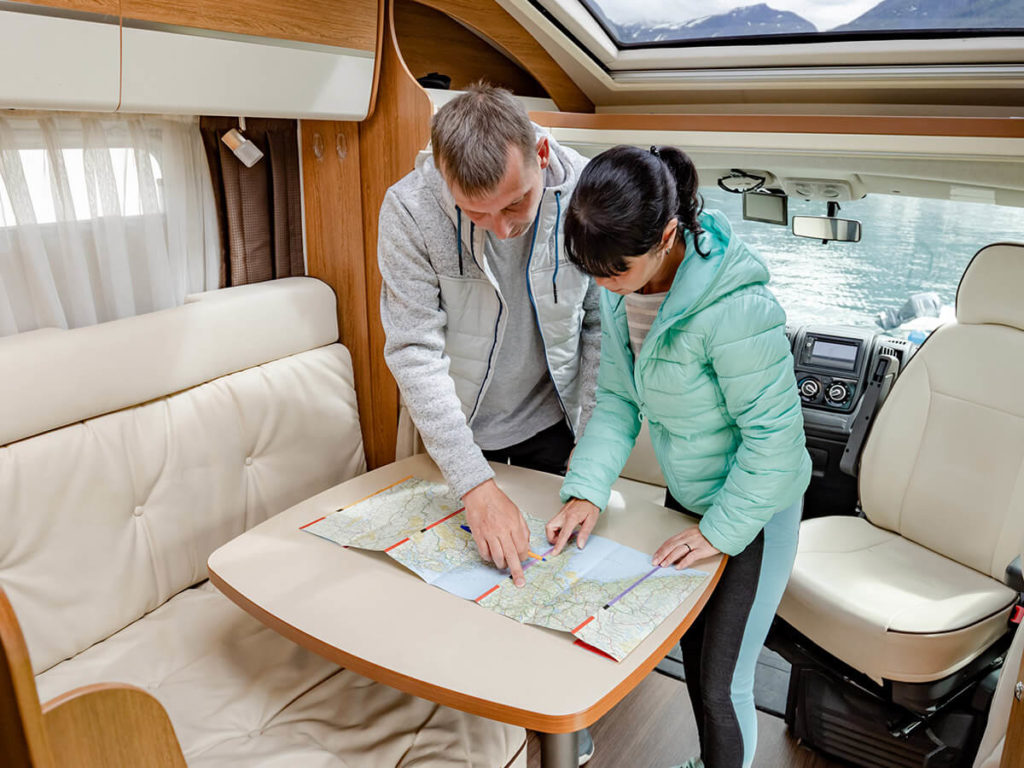
Once you have committed and started to “live the life” of a full-time RV resident, your research and learning opportunities do not have to end. It would help if you continued to research RV life thoroughly because there will always be new aspects of this adventure for you to explore.
The community of RV owners will continue to grow year after year, especially with the increasing numbers of home-based businesses, telecommuting workers, and retirees who want to enjoy life on the road. This means there will always be people who can teach you new tricks & tips or even ask you some questions to learn the rules of the road themselves. Now research and bookmark various online resources, forums, groups, and even social media pages that can help you. The old saying goes, “Many hands will make the load light” when managing a full-time RV lifestyle.
In addition to receiving a lot of help to benefit your family, think about the vast number of families you can help!
Living the RV Dream: Setting and Maintaining Realistic Expectations
It is easy to look at the overall burden associated with full-time RV living and say, “You know what? Never mind!” Realistically, the same could be said about any major life decision – such as buying a car, buying a home, moving to a different state/country, or even having a baby. The key is to take the necessary steps to prepare yourself and your family for the expected (and the unexpected) and maintain realistic expectations along the way.
Most full-time RV residents will tell you that the benefits can far outweigh the overall burden.
You need to be honest with yourself and understand that it is not a decision that should ever be taken lightly or impulsively.
More Articles
Related articles, discovering hidden gem campgrounds for pet-friendly escapes.
Discover hidden gem campgrounds for pet-friendly a...
Road Warriors: Top 10 Adventures for Retired Couples Traveling with a Camper
Discover the top 10 exciting activities for retire...
Rediscovering Adventure: Retirees Embrace the Camping Lifestyle
Embark on a thrilling journey with RV camping for ...
8 Reasons to Hit the Road in 2024: Why RV Vacations Are the Ultimate Adventure
RV vacations offer a unique and unforgettable expe...
The Ultimate Guide to Pet-Friendly Travel Trailers: A Comprehensive Analysis
Discover the key factors that make Olivers pet-fri...
32 Frequently Searched Questions about Travel Trailers
Travel trailers are becoming increasingly popular ...
Ringing in the New Year in an RV: Roam, Revel, and RV Your Way to an Epic Celebration!
Explore the ultimate guide to ringing in the New Y...
Camping for Christmas with a Travel Trailer
As the holiday season approaches, what better way ...
Working Remotely From Your RV: The Ultimate Beginner’s Guide to Productive Travel
Discover the ultimate beginner's guide to working ...
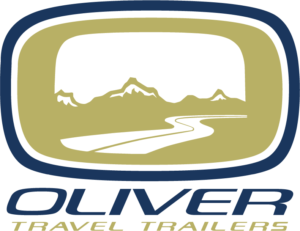
- Privacy Overview
- Strictly Necessary Cookies
- 3rd Party Cookies
We use cookies to provide the best possible experience with our web sites. This includes cookies that are Strictly Necessary for the site to work, help us understand site usage, help manage your preferences, and deliver advertising relevant to your interests. Cookie Policy .
Strictly Necessary Cookie should be enabled at all times so that we can save your preferences for cookie settings.
If you disable this cookie, we will not be able to save your preferences. This means that every time you visit this website you will need to enable or disable cookies again.
This website uses Google Analytics to collect anonymous information such as the number of visitors to the site, and the most popular pages.
Keeping this cookie enabled helps us to improve our website.
Please enable Strictly Necessary Cookies first so that we can save your preferences!

You are here: Home // Living & Lifestyle // Summer RV Camping with Kids Made Easy
This post may contain affiliate links or mention our own products, please check out our disclosure policy .
Summer RV Camping with Kids Made Easy
Published on July 7th, 2024 by Chelsea Gonzales
RV camping with kids is an incredible experience, and it’s the perfect way to make family memories. That said, when our family hit the road in our RV full-time, we quickly discovered how important planning can be. Not only does good, solid planning ensure things go as smoothly as possible, but it also allows you to add some educational experiences to the trip while involving the kids in planning, campsite chores, and more.
In this article, we will discuss the ins and outs of RV camping with kids, including putting together a well-planned getaway. You’ll learn how to find the best campgrounds, how to involve the kids, and how to ensure everyone has fun with exciting activities and outings.
Finding Kid-Friendly Campgrounds
The first thing you’ll need to do is find a campground that suits your needs. For this, we recommend using RV Life Campgrounds to search the area you plan to visit. From there, you’ll be able to see the amenities and average price of each campground and even read reviews written by other campers. This information will help you make the best decision possible.
DON’T MISS OUT ON DO IT YOURSELF UPDATES
Sign up for the newsletter today.
Please enter a valid email address.
An error occurred. Please try again later.

Thank you for subscribing to the Do It Yourself RV newsletter, keep your eye on your inbox for updates.
Key features to look for in an rv park or campground.
Not sure what to look for in a campground when RV camping with kids? Well, obviously, you’ll want to pick a well-reviewed spot. You’ll also want to make sure the campground offers family-friendly amenities. These might include:
- Playgrounds and recreational areas
- Swimming pools and water parks
- Safe and spacious camping sites
- Organized activities and events for kids
Tips for Booking
Once you find a campground you like, be sure to check that it is available. This is especially important during peak seasons when sites can book up quickly. If the campground does have availability, book as soon as possible to ensure you get a site.
If you have your choice of sites, we recommend picking one that is close to amenities such as playgrounds and bathhouses.
Involving Kids in Planning and Preparation
The next step? Getting the kids excited about the trip. You can do this by involving them in the planning and packing process.
Planning Together
If possible, let your kids have some say in the trip planning. Pick a few favorite campgrounds, show them the details of each one, and let them choose. Allow each child to pick one special outing that you’ll take from your campsite. Show them your travel route on a map so they can see how long the drive will be and what you might pass along the way.
Packing Together
First, you’ll need to create a packing list and start gathering the things you need.
Some fun essentials for RV camping with kids include:
- Clothing (make sure to pack layers and lots of extras for when the kids get messy)
- Toys, games, and art supplies
- Special snacks
These are the kinds of things your little camper can help pick out. Let them choose which games and toys to take. Ask them what kinds of art projects they might want to do. Take them grocery shopping and give them a snack budget. Help them put together weather-appropriate outfits.
Of course, you’ll also need to pack all of the less fun but oh-so-necessary camping gear and safety equipment.
Some items that you might need specifically for the kids include:
- Children’s medicines and first-aid supplies
- A current photo of your child/children
- Baby gear (diapers, bottles, etc)
- No-spill cups
- High chair or booster seat
- Kid-size life jackets
- Inflatable pool or bathtub to use in the RV shower for baths
- Soft floor mat for playing on the ground
Once you have everything gathered, let the kids help you load up the RV. Tell them where each item needs to go and let them deliver it. This can actually be a lot of fun, and it makes the process go more quickly than if you were loading up alone.
Travel Tips for a Smooth Journey
Now that you’ve packed up, it’s time to hit the road. Here’s what you need to know to make sure the drive goes well.
Planning Breaks and Rest Stops When RV Camping with Kids
Plan for breaks at least every two hours. If you can, choose places to stop in advance, making sure to pick places where the kids can get out, stretch their legs, and play. My kids love rest stops and fast food restaurants with playgrounds.
Keeping Kids Entertained During the Drive
Of course, you’ll also want to have plenty of things for the kids to do as you drive. Travel games, audiobooks, and kid-friendly playlists are all good options. We highly recommend the Harry Potter audiobooks, as well as anything Rhold Dahl in audiobook form. As far as music goes, we love the Pop Ups children’s band.
It’s also a good idea to keep plenty of snacks and drinks in easy reach. When possible, choose options that don’t melt or crumble in order to reduce mess. You can also use spill-proof snack cups and spill-proof straw cups to cut back on mess even further.
Ensuring Safety When RV Camping with Kids
It is important to note that motorhomes are not tested for car seat safety. This does not necessarily mean it’s unsafe to use a car seat in a motorhome, but because of the lack of testing, many families choose to install the car seats in a second vehicle that follows the motorhome.
If you do decide to install car seats in your motorhome, do so in a seat that faces forward rather than sideways or backward. It’s also best to avoid wooden dinette seats with squishy cushions. Instead, opt for a sofa with a metal frame.
Whether they are in car seats or not, it is important that all of your passengers are buckled up the entire time the motorhome is in transit.
If you’re towing a trailer, you can install car seats in the tow vehicle as usual.
Involving Kids in Campground Chores
Engage the kids in campsite chores to keep them involved in the entire camping process. Have them help you set up camp by showing them how to hook up the water, put out the outdoor rug, set up a small tent, etc. You can also assign simple tasks like gathering firewood, helping prep foods to go on the grill or in coals, and cleaning up the site when things get messy.
If your kids are hesitant to help out, consider making a game out of certain tasks, such as racing to see who can clean their area the fastest or who can gather the most wood. You could also implement a rewards system using stickers or candy, something that has worked well for our family in the past.
Teaching Safety and Camping Principles
It’s important that we teach kids how to stay safe and keep the plants and animals around us safe. This helps instill good habits that will last a lifetime.
Educating Kids on Basic Camping Safety Rules
Start by educating your young campers on basic camping safety. This should include things like staying within sight of the adults while playing outside and giving wild animals their space.
You’ll also want to teach fire safety , making sure your kids know 1) to stay away from fire, 2) what to do if their clothes catch fire, and 3) how to properly extinguish a fire at the end of the night.
Water safety is another important one. Teach kids to stay away from water if they aren’t with an adult, insist on life jackets in open water, and get swim lessons for the kids if possible.
Instilling “Leave No Trace” Principles
To protect the environment, it’s also important to teach “Leave No Trace” principles. Make sure your kids know to stay on marked trails while hiking. Teach them to clean up their trash and avoid leaving food out for wild animals to find.
Activities at Campgrounds or Boondocking Locations
What will you do while camping? There are tons of options! Below are some of my family’s favorite things to do.
Encouraging Kids To Explore
One of the magical things about camping with kids is that you can have fun without ever even leaving the campground. Here are some awesome things to do in the campground:
- Nature hikes — We love hiking, especially if the hike includes a waterfall , creek, or cave. Adding a scavenger hunt to the hike can make it more fun for little ones.
- Outdoor games — Yard games such as horseshoes and cornhole are fun for all ages. If you’re feeling extra silly, try a two-legged race or wheelbarrow race. Of course, things like bicycles, sidewalk chalk, and bubbles are all good for keeping kids entertained outdoors as well.
- Swimming — My kids would live in the water if I let them. If there is a place to swim in your campground, go for a dip. Use it as an opportunity to drive those water safety rules home and then have an awesome time.
- Art — There’s something \special about making art in the great outdoors. Get out the paints and let the world around them inspire your young artists.
- Planned activities —Many campgrounds offer organized activities. Check the schedule at your campground, and go enjoy it!
Organizing Family-Friendly Adventures
Want to get out of the campground and explore the area? We recommend it. During our family camping adventures, we’ve seen many amazing things.
Here are some tips for planning day trips:
- Pack a lunch — Hangry kids can very quickly ruin an otherwise fun outing. Always pack a lunch. You’ll save money over buying overpriced meals inside of attractions, and you’ll save your sanity.
- Use reciprocal memberships—We love to use our reciprocal memberships to get free and dis counted admission to attractions. These include national park passes, museum memberships, and theme park passes.
- Look for freebies — Pretty much every town in the country has some free things to do . Do a Google search to see what free offerings you can find. Some of our favorite attractions have been completely free.
- Always carry a swimsuit — I can’t tell you how many times we’ve come across an opportunity to swim or play in the water and haven’t had a swimsuit on hand. These days, I try to always keep a swimsuit for each kid and a towel in the car. That way we are prepared for these occasions.
Using Smartphones for Educational Purposes
For the most part, it’s best to be as screen-free as possible while camping with kids. That said, there are times when the screens can be beneficial.
Educational Apps and Resources
Download the following apps before your trip and use them to learn more about the world around you as you explore the great outdoors:
- Sky Guide — This app allows you to identify what you see in the night sky. It’s super intuitive, meaning even elementary school aged kids can figure out how to use it.
- iNaturalist — Use this as you hike to identify various plants and animals. If the app isn’t sure, the community will help you identify the plant or critter for sure.
- eBird — An awesome app for bird watchers, eBird allows you to photograph and record the sounds of various birds and contribute them to a user-created database. It takes bird watching to another level.
- Merlin — This app helps you identify bird songs. It’s made by eBird and is just as useful.
- Geocaching — If you have kids who are hesitant to go for a hike, you might try geocaching. Use the app to find a geocache near you and then go on a family treasure hunt.
Encouraging Curiosity and Learning When RV Camping with Kids
You can also use your smartphone to record your trip. Let your kids take photos and videos and then encourage them to use them to create a digital scrapbook or a blog about your adventures. This is an excellent learning opportunity and can be a lot of fun!
As long as you plan well, RV camping with kids is a lot of fun. By choosing kid-friendly destinations, involving your kids in the process, and giving them plenty of fun things to do, you are sure to have an amazing time exploring the great outdoors with your little ones!
Share this post:
Related posts:.

Explore, Dream, Discover: Themed RV Road Trips To Ignite Your Wanderlust

An RVer’s Practical Guide To Using Harvest Hosts and Boondockers Welcome

Safe and Smart Strategies for Long Driving Days in Your RV
Leave a comment.
Save my name, email, and website in this browser for the next time I comment.
Welcome! Please follow these guidelines:
- Be kind and respectful.
- Keep comments relevant to the article.
- Avoid insults, threats, profanity, and offensive remarks.
- Refrain from discussing gun rights, politics, or religion.
- Do not post misleading information, personal details, or spam.
We may hide or remove comments at our discretion.
I have read and accepted the Comment Guidelines and Privacy Policy *

- Find a Location
Front Living Fifth Wheel RV Buying Guide

Front living fifth wheels offer comfortable living arrangements. One reason is the added height in the rear of the camper where the bedroom and bathroom are located. This means a taller shower and an overall more spacious feel.
Another reason is the separation between the master bedroom and the living areas. With the rear bedroom, a front living floorplan provides an entertaining area for friends and family without intruding on personal space. Guests can stay overnight on the sofas or enjoy seating for 6-8 adults.
Let’s look closer at five of our favorite fifth wheels with front living room floorplans!
Jayco North Point 382FLRB

- Length: 43’10”
- Dry Weight: 15,135 pounds
- Sleeping Capacity: Up to 8
Favorite Feature: Huge Master Ensuite
My favorite feature of the North Point 382FLRB is the huge master ensuite. If you’re looking for luxurious amenities while camping, you’ll love the spacious L-shaped double vanity, LED-backlit medicine cabinet, toe-kick nightlights, and walk-in shower with a teak seat. There are also washer and dryer hookups.
The rear of this fifth wheel isn’t the only spacious area. The front living floorplan features three sofas, an electric fireplace, and an entertainment center. This particular camper is the only one on this list that has the third sofa in the front cap facing the kitchen.
The entertainment center is along the kitchen wall, and on the other side of the wall is an additional 32-inch TV. Whether at the kitchen island prepping meals or hanging out with friends in the living area, you can easily access entertainment.
Keystone Montana High Country 377FL

- Length: 41’11”
- Dry Weight: 13,513 pounds
- Sleeping Capacity: Up to 10
Favorite Feature: Loft and Separate Entrance
Traveling families will love the loft above the rear bedroom of this Montana High Country front living fifth wheel. It has two bunk mats with shelves and a cabinet in between. The kids will have a private space to store toys and clothes for the weekend.
In addition, a second door at the foot of the stairs leads to the opposite side of the camper. If you’re buddy camping or have a large campsite, this is an easy way for the kids to access the loft or the bathroom to wash their hands or remove dirty shoes without traipsing through the rest of the trailer.
Another favorite feature of this front-living fifth wheel is the U-shaped kitchen. There’s bar seating and plenty of space for meal prep. The living room has the typical three sofas, electric fireplace, and entertainment center of this front living floorplan. If you want a fifth wheel to host friends, the Montana High Country 377FL offers it all!
Forest River Sabre 37FLH

- Length: 42’0”
- Dry Weight: 12,163 pounds
Favorite Feature: Spacious Kitchen
I love the kitchen of the Sabre 37FLH . This front living fifth wheel offers ample space to entertain guests or prepare meals for a traveling couple. There’s a kitchen island, double-door refrigerator, large pantry, hutch with additional storage, and a second closet. You will have plenty of room to store all your kitchen gadgets and maybe even have space left over!
This fifth wheel front living room features the standard three sofas, an electric fireplace, and an entertainment center. The rear bedroom has a king bed, two wardrobes, a dresser, and a spacious bathroom with a double vanity and a closet with a washer and dryer prep. If you’re looking for plenty of interior space to hang out and store your camping gear, the Sabre 37FLH is an excellent option.
Keystone Montana 3761FL

- Length: 41’
- Dry Weight: 14,518 pounds
- Sleeping Capacity: Up to 6
Favorite Feature: Boondock Ready
What I love most about the Montana 3761FL is its ability to dry camp immediately. If you’re looking to escape busy campgrounds, you’ll have no problems boondocking on public land for the weekend with a 70-gallon freshwater tank and 88-gallon waste and gray water tanks, respectively. You also have the option of upgrading to lithium batteries or replacing the standard 220-watt solar panel with 440i or 1320i-L panels .
This camper also features a double vanity and spacious shower in the master bathroom and a half bath in the kitchen. Like other front living fifth wheels on this list, it has a pantry/buffet, dinette, residential refrigerator, three sofas, an electric fireplace, and plenty of storage. The cargo-carrying capacity is just over 2,200 pounds, which is the smallest of these five RVs. But the Keystone Montana 3761FL still has plenty of room for all your camping necessities!
Forest River Wildwood Heritage Glen 378FL

- Length: 43’6”
- Dry Weight: 11,589 pounds
Favorite Feature: Loft and Second Entrance
The loft above the rear bedroom in the Wildwood Heritage Glen 378FL is similar to the High Country 377FL with two bunk mats. This is another great option for families, compared to some of the best mid-bunk fifth wheels . In addition to the loft, this front living fifth wheel also features two camp-side entry doors. I love this addition because the kids can run in and out easily without interrupting guests in the living area.
This camper also features similar amenities as the other fifth wheels on this list, such as a kitchen island, dinette, hutch with overhead cabinets, three sofas, an electric fireplace, and an entertainment center. There’s only one bathroom rather than a bath and a half, but for most RVers, this is adequate for an enjoyable camping experience.
FAQs About Front Living Area Fifth Wheels
Do these front living room fifth wheels interest you? They’re excellent campers for folks who want to host friends or entertain family. They’re also better options for families with older teens who don’t fit in smaller bunk beds. The tri-fold sofas easily convert to a large sleeping space for taller kids.
To help you learn more about front living fifth wheels, we’ve listed a few questions and answers below.
What is the shortest front living room fifth wheel?
As you can see from the list, many front living room fifth wheels are large. These campers tend to be over 40 feet long. However, if you’re looking for a shorter option, you’re not out of luck. You’ll just have fewer options under 40 feet long.
One of our shorter fifth wheels with a front living room is the Keystone Alpine Avalanche 346FL . It’s roughly 39’ long and features a spacious front living room floorplan with a smaller central kitchen to accommodate the shorter length.
What is the lightest front living fifth wheel?
Because fifth wheels with front living rooms are usually longer, they also tend to be heavier. Generally, they weigh over 12,000 pounds unloaded. Even the shorter Alpine Avalanche 346FL weighs almost 13,000 pounds.
While it’s over 43 feet long, the Forest River Arctic Wolf 3910 weighs around 11,100 pounds and still has a cargo-carrying capacity of over 2,900 pounds. It’s one of the lightest front-living fifth wheels.
These front living room fifth wheels offer spacious interiors, sleeping accommodations for eight to ten people, plenty of amenities, and storage options to make your camping experience enjoyable.
- For comparison, explore these rear kitchen fifth wheels .
- Check out seven front living travel trailer RVs for excellent front living travel trailer options.
- If you still need convincing, learn why front living floorplans are worth considering.
- Finally, learn more about towing a 5th wheel and how it’s different from towing a travel trailer.
Which front living fifth wheel would you pick? Let us know in the comments below.
Leave Your Comment Cancel Reply
Save my name, email, and website in this browser for the next time I comment.
Shop By RV Type

Your Adventure Awaits
Copyright © 2023 cwi, llc all rights reserved.
- RV Glossary |
- Privacy Policy |
- California Privacy Rights |
- Do Not Sell or Share My Personal Information |
- Targeted Advertising Opt Out |
- Terms of Use
Tips for Maintaining Your RV Refrigerator
July 08, 2024 By RV Lifestyle & Repair Editors filed under All RV Blog Entries .

Your RV’s refrigerator is an essential appliance for comfortable RV living, and when things go wrong, it’s sure to throw a major wrench in your travel plans. If your fridge stops working properly, you can end up with spoiled food and costly repair bills, both of which are unwelcome expenses when you’d rather be focusing on your travels.
Thankfully, a little maintenance can help you keep your cool and prevent significant refrigeration issues down the line. With these tips, you can troubleshoot common refrigerator issues and save money, ensuring your food stays cold whether you’re parked at a campsite or cruising down the open road.
1. Get to Know Your Control Panel
Your refrigerator is your powerhouse, operating on LP gas, 120-volt AC power, or 12-volt DC power with an inverter. And while the RV control panel might seem like a small component, it plays a vital role in managing your RV refrigerator. The control panel serves as the brain, determining the default power source and seamlessly switching to an alternate one if needed. Learn how to navigate through this essential feature, understand indicator codes, and seamlessly switch between electrical power and propane.
2. Locate the Serial Number
With so many brands, models, and styles on the market, you need to be able to locate your refrigerator’s serial number to be able to identify and properly maintain RV refrigerator. Once you’ve found the serial number, you’ll be able to research your specific model and find accurate information on issues, parts, and more. Learn how to locate the serial number on your model, and keep in mind that its placement depends on the refrigerator model’s age.
3. Learn to Troubleshoot Overcooling Issues
Optimized for limited space, RV refrigerators employ various systems to ensure maintaining desired temperatures. However, some of the most common issues to arise are overcooling and freezing, which require a bit of troubleshooting. Learn how to identify these problems yourself before seeking costly professional help.
4. Understand Your Power Source
Over the past few decades, RV refrigerators have evolved in terms of power sources, with many models, such as Norcold and Dometic, shifting away from 12-volt battery power. Power options for RV refrigerators now include LP gas and 120-volt electricity, since 12-volt systems tend to drain batteries rapidly, especially for larger units. However, it’s still feasible for larger refrigerators to operate using an on-board 8- or 12-volt battery bank with the help of an inverter, mimicking the functionality of a 120-volt system. Smaller RV refrigerators with an integrated freezer inside a single door can efficiently run off a 12-volt battery. Understanding the various types of refrigerators and their power sources will give you better insights when troubleshooting or upgrading your RV refrigerator.
5. Learn to Troubleshoot Your Propane Refrigerator
Does your RV propane refrigerator have a frustrating habit of starting briefly only to shut off again? With a few steps, you can troubleshoot a malfunctioning fridge and discover potential culprits like a cracked spark ignitor or a covered flame sensor probe. By gaining insights into these issues, you’ll be better equipped to address and fix them so you can restore your RV refrigerator to its ideal performance.
6. Secure Loose Parts on Your Refrigerator
If the side-by-side refrigerator in your fifth wheel or motorhome shifts during travel, there are several straightforward solutions to address this issue. Depending on the type of RV refrigerator you have, the fix you need could be pretty affordable. There are various components that can be prone to loosening, so a little investigating can go a long way toward identifying potential problems. Discover where to inspect outside your RV and understand the impacts of jostled components during transit. With a few steps, you can ensure your RV refrigerator stays securely in place while on the move.
Don’t let a faulty fridge get you heated. Next time your refrigerator is on the fritz, try these maintenance and troubleshooting tips so you can get back to enjoying your next adventure.
Share tips, start a discussion or ask one of our experts or other students a question.
Already a member? Sign in
No Responses to “Tips for Maintaining Your RV Refrigerator”
SIGN UP FOR THE NEWSLETTER

Premium Membership
Unlock exclusive member content from our industry experts.
- 24/7 Access to Premium RV Maintenance Videos, Travel Inspiration, and Lifestyle Tips
- Step-by-Step Instructional Demos, Projects, and Guides
- 50% Off Video Downloads Purchased in the RV Lifestyle & Repair Shop
- Access to Ask the Expert Program
- 2 Full-Length Video Downloads to Watch Offline
Gold Membership
Get everything included in Premium plus exclusive Gold Membership benefits.
- 9 Full-Length Video Downloads to Watch Offline
- 2 Full-Length RV Repair Classes to Keep for Life
- Discounts on Purchase-to-Own Content in the RV Lifestyle & Repair Shop
- Exclusive GOLD LIVE Streaming Events
Sign in to RV Repair Club
Enter your sign in info below
For your convenience, we will keep you logged in for the next 90 days unless you uncheck the box.

The Reality of RV Retirement
Posted: March 7, 2024 | Last updated: March 7, 2024
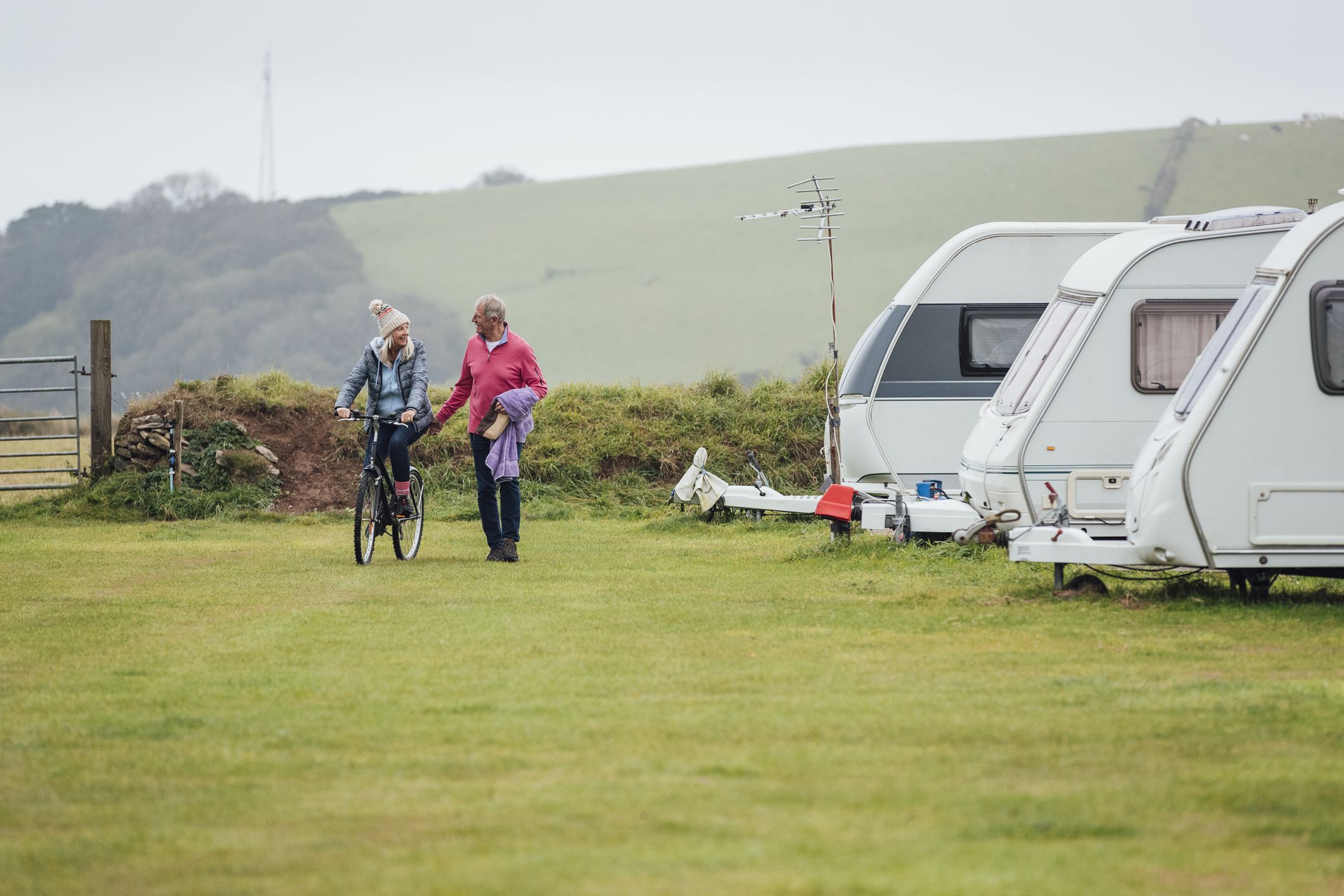
Retire on the Road
Ever daydreamed about hitting the road in a recreational vehicle for your retirement? If so, you’re not alone. An estimated 1 million Americans have chosen to retire in an RV, spending at least part of the year on the road. It’s not just baby boomer retirees doing this, either; millennials, some with kids, are also embracing life on the road and living a minimalist lifestyle. Cheapism consulted several RVers, many of whom live on the road-year round, and asked them what advice they’d give to someone considering retirement in an RV.
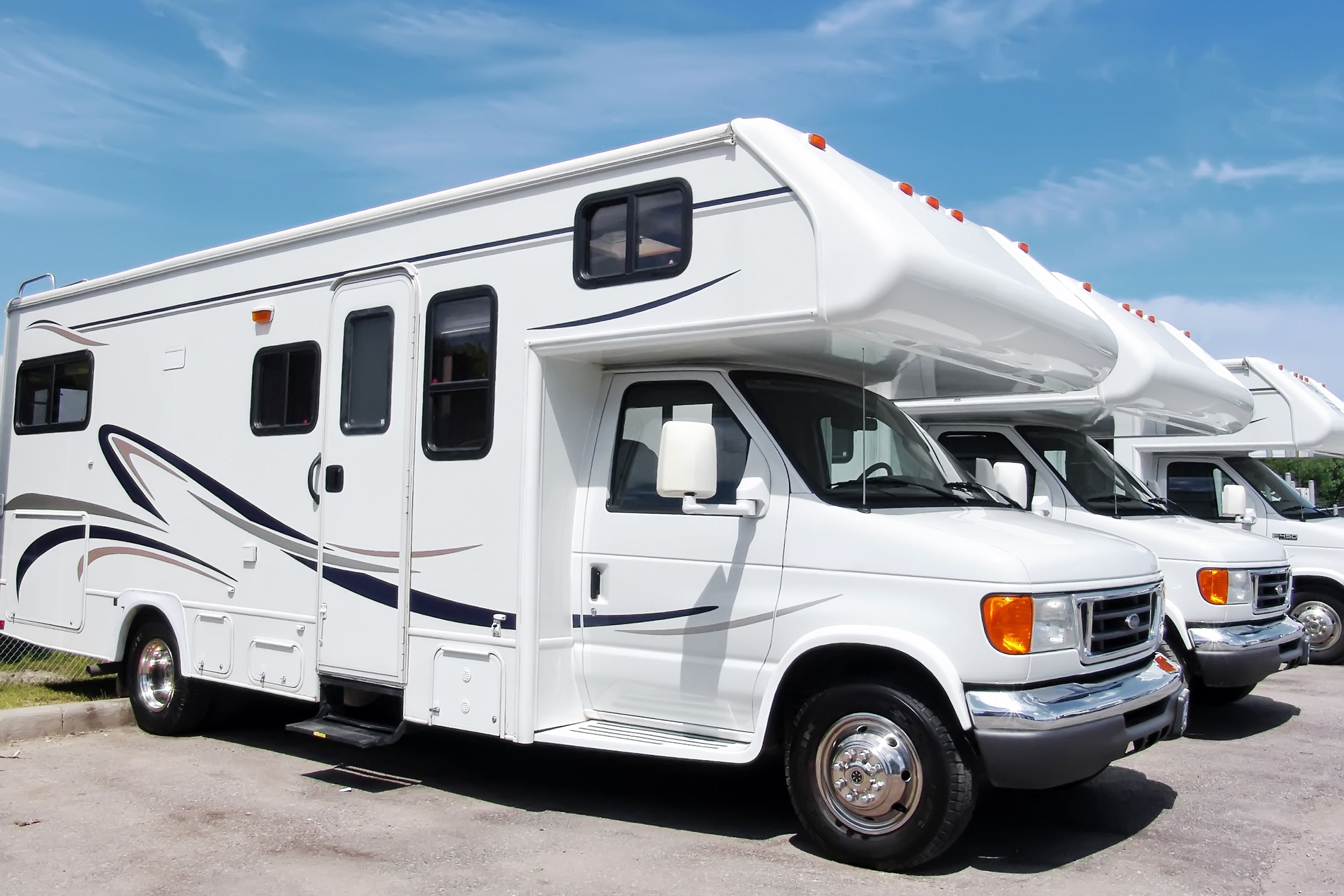
Pick Your RV Wisely
Not surprisingly, the biggest initial expense of RV living is the RV itself. The largest RVs, Class A motorhomes, range in length from 29 to 40 feet or more. They resemble tour busses and have price tags to match, ranging from $250,000 to $1 million, and an average price of $375,000. Class B motorhomes, which are factory-modified cargo vans 18 to 24 feet long, range from $80,000 to $300,000 and up with an average price of $100,000 . Class C motorhomes also ride on a cargo van platform, but are longer (around 30 to 33 feet) and have a more traditional camper form with a sleeping nook above the cab. Retail prices are similar to Class B motorhomes.
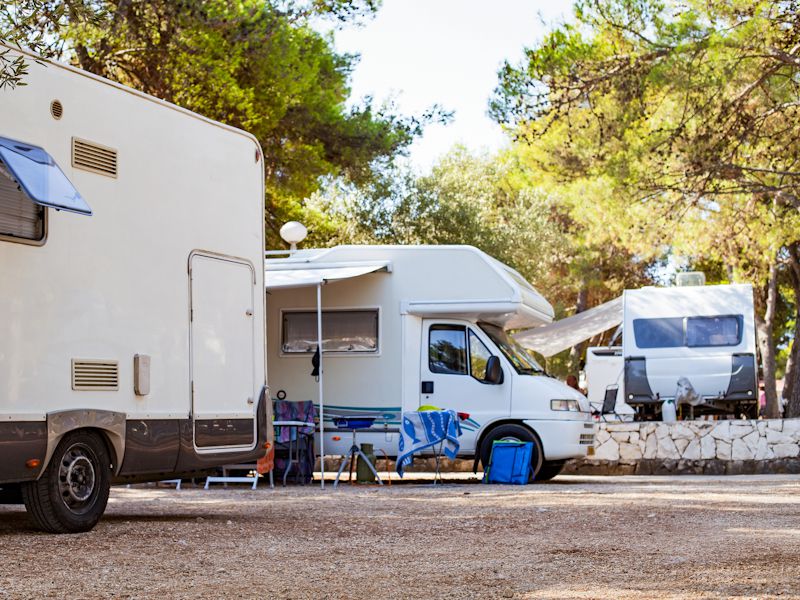
Know Your Needs
There are several accounts from people such as writer Jan Wesner Childs , who said in her blog that her family bought an RV that was too large and later had to downsize. "We thought we couldn’t survive unless we had the maximum space possible," said Childs, who spent a year in an RV after her husband retired from the military. "If you want to travel, stick with 38 feet or under. Anything bigger is hard to tow and won’t fit in older campgrounds like national parks."
Follow us on MSN for more of the content you love.
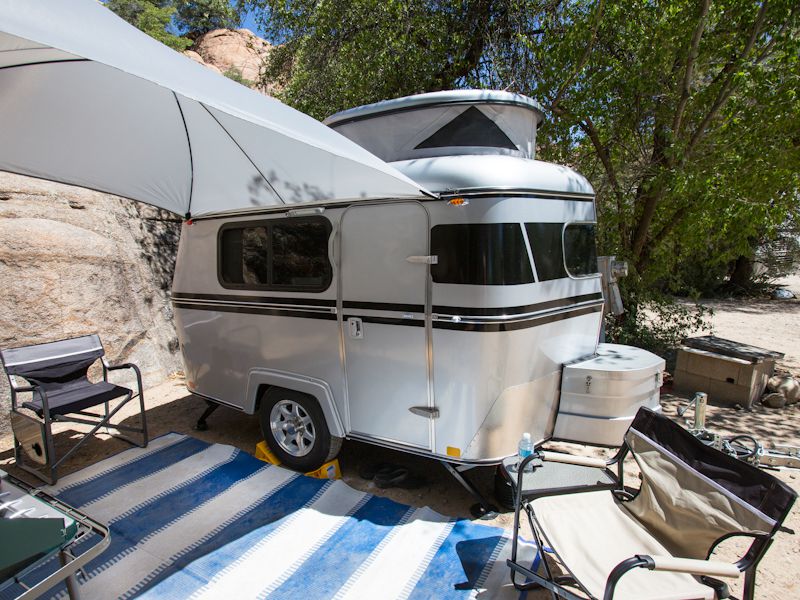
Think Outside the RV Box
Travel trailers are cheaper and smaller than other RVs. A used trailer that can accommodate two people (albeit snugly) can be had for $10,000 or less. While the trailer will spare your budget, you'll still need a vehicle that's powerful enough to tow it, such as a crossover, SUV, or truck. If you choose to go with a motorhome, you'll need secondary transportation as well, unless you want to drive your RV everywhere (including on mundane errands, which no one recommends doing). That could mean towing a car behind an RV, in which case you’ll also need to invest in a towing rig, or commit to bicycling or walking everywhere when you’re camping.
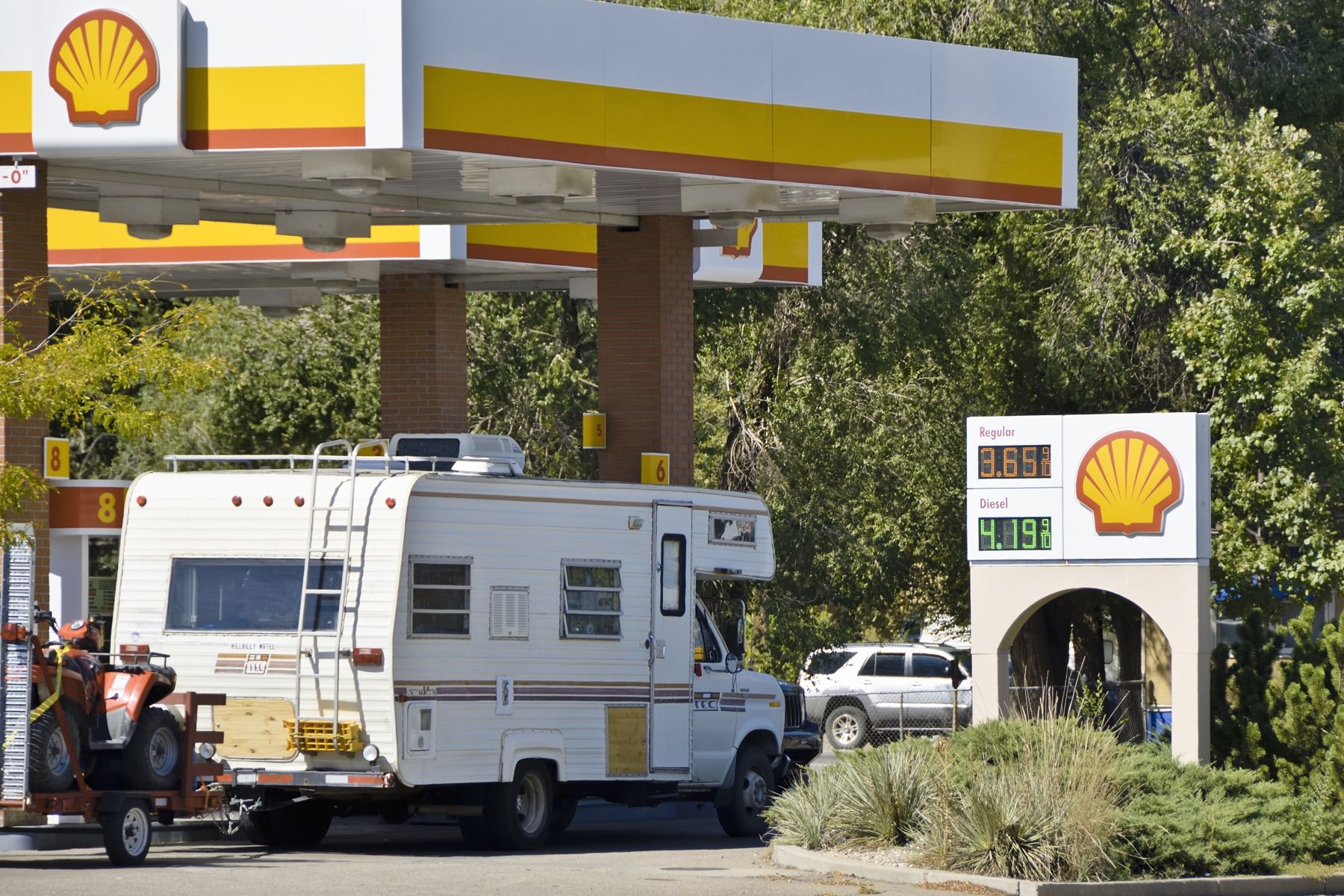
Don't Forget Fuel Costs
Even with diesel (which most larger RVs run on) currently hovering around $4 a gallon, fuel costs can add up quickly. "The RV lifestyle can also negatively impact the environment, which is something we struggle with frequently," said millennial blogger Nathan Hengst . He and his wife, Ashley, were living in Newark, Delaware, when they decided to quit the rat race and hit the road in 2017. His advice? Limit your mileage and choose your RV wisely . "Seriously ask yourself why you're considering full-time RV life, and then after you feel confident in your answer, choose the smallest-wheeled home you think you can tolerate."
For more great RV articles, lifestyle stories, and money-saving tips, please sign up for Cheapism's free newsletters .

Prepare for Living Expenses
Monthly expenses depend on factors including the number of people you're traveling with, where you're staying, food, insurance, and maintenance. Some bloggers boast of spending less than $1,000 per month, while others say they spend three times that or more. (Keep a lid on the food budget with these 30 Amazing 5-Ingredient Recipes for Cooking in a Camper .)

Do Your Research
Retired blogger Jim Morgan says he spent about a year researching the RV lifestyle, getting his personal affairs in order, and selling his home in Oregon before hitting the road in 2004. “Study, read, learn. Join all the RVing groups on the internet and on Facebook and find out what people are having trouble with and how much things cost,” he says. “I had a pretty good idea what it would cost me per month to be on the road with no income long before I started the engine.”

Calculate Income
Regardless of how much you spend, you will need to have some reliable source of income established beforehand, RVers say. For retirees such as Morgan, that means selling the house, cashing in a life insurance policy, and relying on Social Security. Younger people such as Ashley Hengst often have jobs that allow them to work remotely either part- or full-time. Sticking to a budget is essential, many RVers point out.
Related: How to Earn Money Working From Your RV

Have a Nest Egg
Morgan and the Hengsts say having a nest egg set aside before traveling is essential. “We saved a significant portion of our income during our traditional working careers while at the same time choosing to live a relatively frugal lifestyle,” Nathan Hengst says. “Our current daily expenses are covered by the savings we've invested over the years, and we continue to maintain a reasonable level of frugality in our travels.”

Consider Seasonal Jobs
One option some RVers choose to supplement income is seasonal work, whether it’s a temp gig at an Amazon warehouse or the park where they’re staying. “I was up in Fairbanks, Alaska, and made friends with the owners of Ice Alaska RV Park,” Morgan says. “I worked at that park as a camp host and they gave me free rent all year-round.”
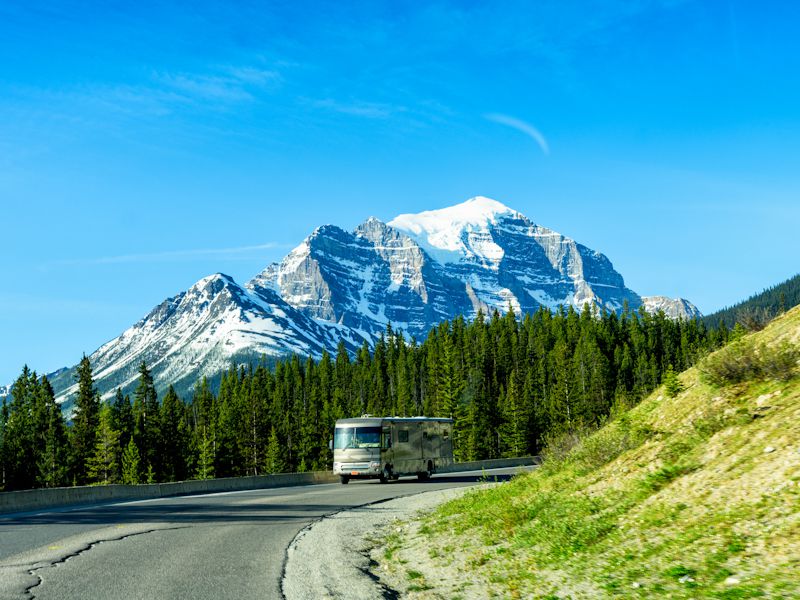
Enjoy Your Freedom
Once you’ve got your ducks in a row, it’s time to hit the road. Some advantages are obvious, such as having no home or yard maintenance to do. There’s also the freedom to pick and and go whenever you please. “Don't like the neighbors? I just move onto the next park. Don't like the RV park? Just move to another one. Big-ass storm heading my way? Just move on,” Morgan says.
Related: The Best Spring RV Destinations
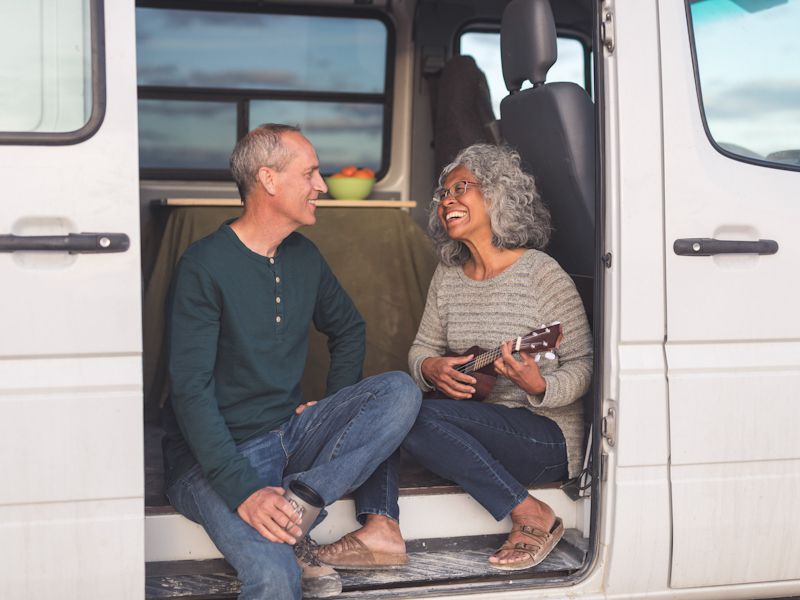
Another benefit of living in an RV is being forced to downsize. “Living out of an RV full-time forces you to get rid of excess material things that tend to accumulate in a more sedentary lifestyle,” Nathan Hengst says. “After spending days to weeks on end without reliable cellphone or internet service this past summer, we focused on how to fill our days with meaningful activities and personal improvement.”
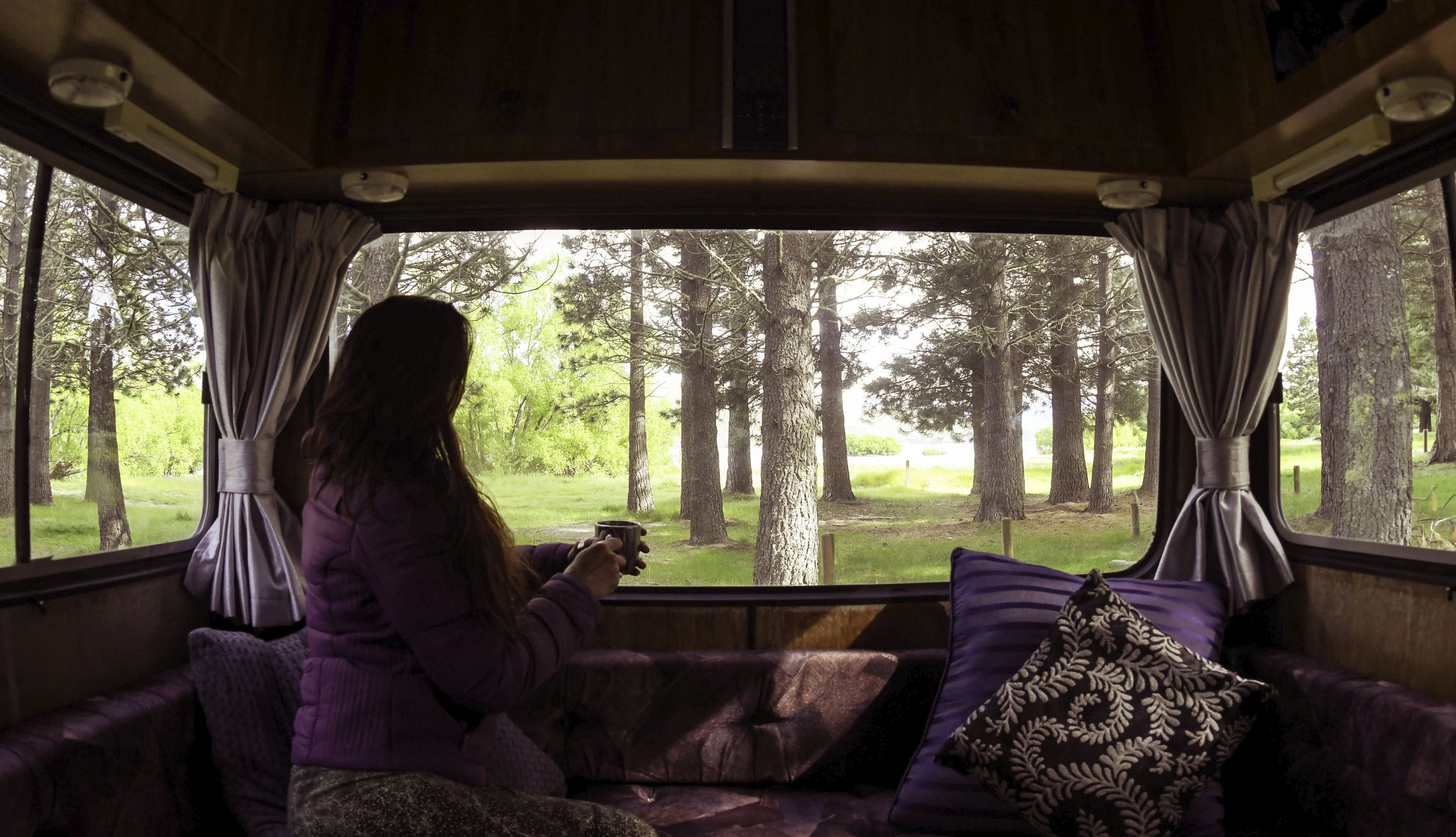
Consider Community
Living in an RV and traveling means your social life will change. “We've discovered in our travels that we desire a fixed community, something constant travel can't provide,” Nathan Hengst says. “While a digital online community is certainly helpful and something other full-time travelers love, it doesn't serve as a legitimate replacement to a physical neighborhood for either of us.”

Be Ready to Dump
While it may seem like a minor inconvenience, using the toilet when you’re living in an RV is no longer as easy as just flushing. Emptying holding tanks can be a laborious process and must be done with care to avoid pathogens and unpleasant spills.
Related: You Won't Believe These 25 RV Horror Stories
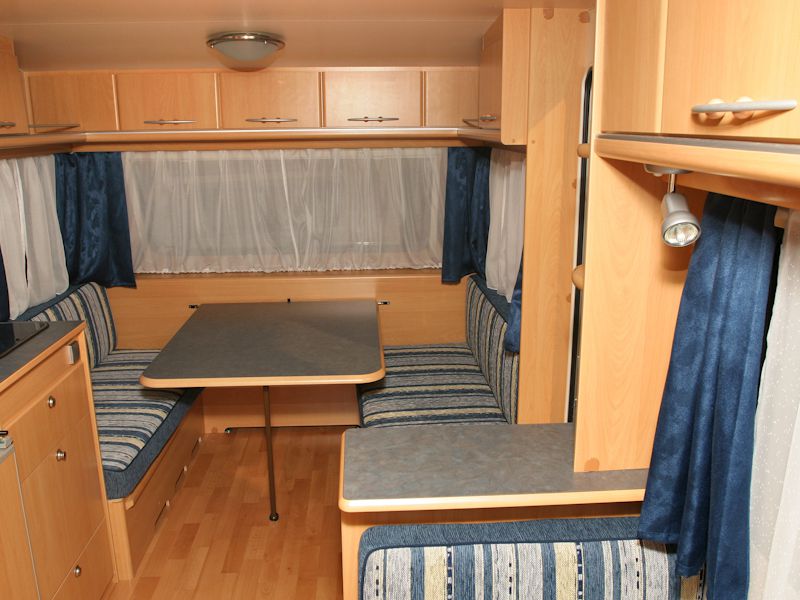
Think About Storage Needs
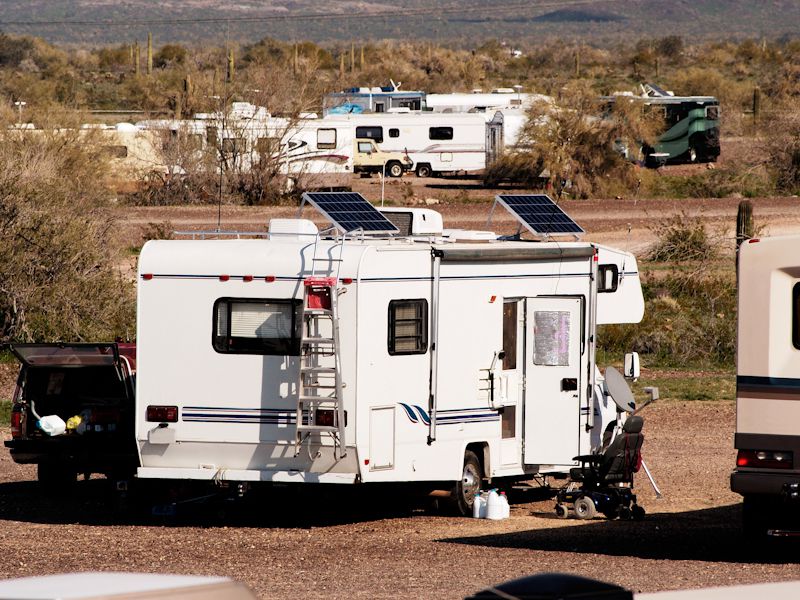
Stock up on Emergency Supplies and Other Essentials
While many RV parks now have Wi-Fi, it’s possible to go completely low-tech. If you want to live off the grid ( something RVers call boondocking ), a gas-powered generator or solar panels are essential, as are manual appliances such as a can opener, and — if you really want to rough it — a solar-powered water heater for showers. Don’t forget to stock up on emergency roadside supplies as well.
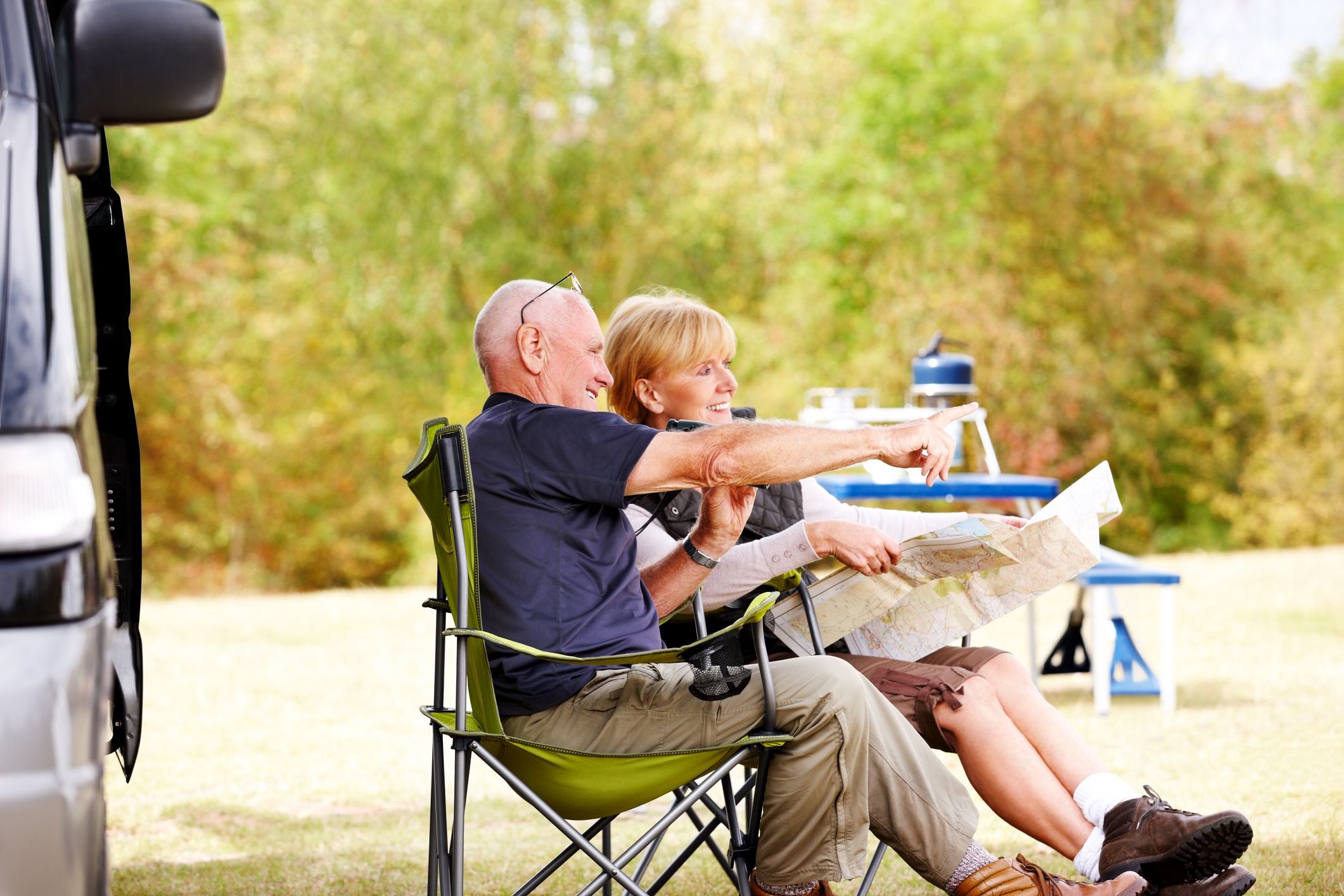
Is It Right for You?
Few current or former RVers say they regret choosing to retire on the road, but even staunch RV advocates say this isn’t a lifestyle for everyone. Experts recommend getting a taste of life on the road by renting an RV for a week or longer. Expect to spend at least $1,000 for a one-week rental, plus several hundred to $1,000 or more for fuel, campground rental, food, and miscellaneous expenses. It’s pricey, but you may just get hooked. “It does wear on you, maintaining this big box on wheels,” Morgan says, “but I get so much enjoyment doing it, that it's hard to just give it up.”
Related: 26 Vacation Spots to Visit in an RV and Save
This article was originally published on Cheapism
More From Cheapism
- Cheapest Oil Change: Jiffy Lube vs. Valvoline vs. Walmart and More
- U.S. Presidents' Net Worth, Before and After Taking Office
- Is Spirit Airlines Safe, and Why Is It So Cheap?
- These Are the 7 Cheapest Fast-Food Joints To Try Right Now
- Cheap, Easy, Healthy: 9 Best Bang-for-Your-Buck Foods at Costco
Like Cheapism's content? Be sure to follow us .
More for You
California Residents Outraged After State Approves Millions in Reparations While Battling $47 Billion State Deficit
“It’s not up to me”: James Cameron Said His ‘White Privilege’ is Why He Won’t Even Defend Himself after Avatar 2 Racism Controversy
Fact Check: The Facts About Giant Centipede Supposedly Found in Australia
Carnival takes a clear stand on huge main dining room controversy
Carpenter's Easy Trick for Keeping Screws Separate Is Nothing Short of Brilliant
25 human foods you should never give your dog—and 25 you can
Thought Lost in WW2, Records Discovery Reveals Secrets of Ancient People
Re/Max co-founder: Floodgates will open even when rates drop 1%
Scientists unveil revolutionary heat pump that doesn't use air: 'At the heart of it is the same technology'
Coach Brian Daboll Reveals Outrageous 40-Yard Dash Claim: Buffalo Bills Tracker
The salary a single person needs to make ends meet in every U.S. state
Is There Such A Thing As Eating Too Much Salmon?
Woman finds 50 vintage cars hidden in a crumbling barn in the middle of a forest
25 Extremely Rad (or Impossibly Lame) Celebrity-Endorsed Products
5 Canadian Cities Where You Can Buy Luxury Homes For $100,000 or Less
The 3,000-Foot-Tall Tsunami that Could Reach America’s East Coast
You’re not a hoarder, so why do you have so much clutter?
What Happens to Your Body When You Eat Grapes Every Day
A grim trend among Americans without college degrees exposes an enormous failure
When to Wash Your Hair After Coloring to Prevent Fading, According to Pros

New tool will help campers in Ontario who don't really know how to camp
Latest Videos
If you've been thinking about camping but aren't fully confident in your skills to survive the great outdoors, a new helpline is perfect for you.
Scouts Canada has launched its Camptastic Helpline to help Canadians experiencing camping conundrums.
Starting Monday, expert advice will be available for free, 24/7, when calling the helpline at 1-844-SCOUT101 or 1-844-SCOUT10 (dropping the second 1) for Bell Canada users.
Scouts Canada says the call-in line is designed for campers caught in a pinch, already at campsites and struggling with common camping concerns.
"The great Canadian outdoors are calling this summer camping season, but that doesn't mean that everyone is 100 per cent ready to take the call," said Kaelem Moniz, a youth volunteer of eight years with Scouts Canada.
"The Camptastic Helpline is all about giving Canadians 24/7 Camping confidence on call to get out in the wild with wonder, not worry."
View this post on Instagram A post shared by Scouts Canada (@scoutscanada)
How the camping helpline works
Not sure about how to properly go to the bathroom in the outdoors? Or what to do if you encounter wildlife?
These are just some questions that will be answered when you call the Camptastic Helpline.
All you have to do is call the number and use simple number selections that will direct you to pre-recorded solutions from real Scouts and volunteer Scouters.
In addition to the 1-844-SCOUT101 helpline, campers with internet access on-site or while preparing for their trip can access helpful resources, guides and videos here .
There, you can find tips about how to avoid attracting unwanted wildlife and getting eaten alive by bugs, as well as outdoor options for bathroom breaks.
Are Canadians competent campers?
The Canadian scouting association also surveyed 1,000 random Canadians about their camping skills.
It found that people in the True North are "kind of" competent when it comes to surviving in the outdoors.
According to the survey, 82.5 per cent of Canadians are okay going to the bathroom outdoors, while 10.8 per cent say "they can do outhouses — but draw the line at that."
Nearly half of Canadians (47.7 per cent) say that they would use a cat hole (dig a hole to use do the number two outdoors), but a combined 40.8 per cent would not and say they would "basically do anything to avoid using a cat hole."
As for bear basics, Canadians failed the test when asked what they would do if they encountered a black bear in the woods. A combined 54.2 per cent would do the wrong thing like play dead or run away. Scouts Canada says the correct answer is slowly backing away and maintaining eye contact.
It's clear that this helpline is much needed.
Paul Chambers /Unsplash
Join the conversation Load comments
Latest in Travel

You can visit Ontario provincial parks for free this summer and here's when

It's so hot in Toronto right now that your luggage might be delayed at the airport

You can rent Doug Ford's family cottage in Ontario on Airbnb

My friends and I just swam all 5 Great Lakes and here's how you can do it too

5 beaches in Ontario that aren't as packed as Sandbanks

Wildlife area near Toronto has old abandoned cars in it

Nature area in Ontario is famous for its boardwalks and wetlands
What It's Really Like to Have an RV in Retirement
It's a nomadic life that takes some planning, but some are drawn to the freedom and variety of the open highway
- Newsletter sign up Newsletter
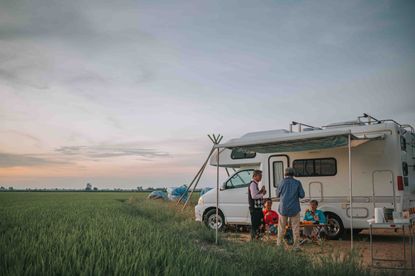
Retirees Kay and Steve Parish have taken downsizing to the extreme.
Earlier this year, they sold their 1,575-square-foot house and moved full-time into an Airstream trailer one-eighth that size. They then set off to explore the country, with Steve driving a Ford pick-up that towed their new home behind them.
That marked the couple’s second full-time RVing adventure in six years. From 2018 to 2020, they traveled thousands of miles across the United States and Canada in a slightly larger Airstream, visiting Niagara Falls, Yellowstone National Park, St. Augustine, Fla., and points far and wide — until the pandemic thwarted their plans.
Subscribe to Kiplinger’s Personal Finance
Be a smarter, better informed investor.

Sign up for Kiplinger’s Free E-Newsletters
Profit and prosper with the best of expert advice on investing, taxes, retirement, personal finance and more - straight to your e-mail.
Profit and prosper with the best of expert advice - straight to your e-mail.
The Parishes stopped traveling and bought a home in Santa Fe. Then decided to sell the house and, in May, they got back on the road, deeming full-time RVing the ultimate retirement lifestyle.
“You’re home, yet you get to open the door to a different place every few weeks,” says Steve, 72. “Once you get tired of where you are, you go somewhere new.”
The couple is among the small yet passionate population of retirees who have embraced the nomadic life. These wanderers don’t have to deal with the hassles of buying airline tickets, booking hotels or cramming clothes into a suitcase. Instead, they have flexibility, freedom — and their favorite belongings — as they seek new adventures.
Comfort, convenience and karaoke
Kim and Larry Fine, retirees who set out full-time RVing in 2021, have a 36-foot-long Super C motorhome complete with a king-size bed, full residential-size refrigerator, three-burner stove and a good-sized dining area.
They also “tow a big trailer behind us because we couldn’t give up all our toys,” says Larry, 61. Among other items, that 24-foot-long trailer carries a Ford Bronco, a 16-foot motorboat, a motorcycle, a scooter, electric bikes and garment bags filled with some of their nicer clothing.
The couple makes good use of their home on wheels, traveling through the United States, as well as into Canada and Mexico. And they continue to stay active, even when their rig is stationary. This past winter, they spent four months at the posh Llano Grande Resort in Mercedes, Texas, where spots cost from $929 to $1,018 a month, plus electricity.
“It had four swimming pools, four hot tubs, a recreation center, 12 pickleball courts, a library, a computer room, a quilting room, different nightly card games and a little bar where they’d have karaoke or bring in a band,” says Kim, 59. “They also had a farmer’s market each Tuesday with fresh produce.”
The Fines, who had spent their earlier life entirely in western Pennsylvania, decided retirement was the ideal time to journey across North America.
“We have a lot of friends that think we’re absolutely crazy for doing this,” says Larry. “But for us, it makes sense. We could have kept the house, retired and taken some week-long or two-week-long trips, but it still wouldn’t have been the same as going someplace new, spending a month or longer there, and seeing everything in that area.”
Tech advances simplify full-time travel
RVing has long been popular among retirees, with this demographic comprising a third of owners, according to the RV Industry Association .
Yet only a tiny fraction of all RV owners, retirees included, embrace the nomadic life. A record 11.2 million households own RVs, but just 1.5% — about 400,000 people — travel full-time. But thanks to technological advances and the proliferation of online community groups offering inspiration and advice, this lifestyle is attracting more people. For instance, full-time RVers are one of the fastest-growing membership segments of the Escapees RV Club , an RVer support organization.
Thanks to satellite internet and solar power systems, travelers now have more reliable connectivity and electric charging even when off the grid. Advanced navigation tools let them cruise along scenic routes while avoiding low bridges or sharp turns. And with a few taps on an app, RVers can find restaurants, banks, gas stations, grocery stores and overnight parking options.
Online retailers like Amazon enable these travelers to order anything from shampoo to warmer clothes and have it delivered directly to their RV. “If we’re going to be someplace for a week, we can usually rely on getting a delivery wherever we are,” says Steve Parish.
A wide range of expenses
Yet, not everything about RV life is idyllic. It also brings its share of complications and costs.
“Traveling in an RV full time is not inexpensive,” says Laura Lynch, a financial planner in New Mexico and founder of the Tiny House Adviser , a financial service firm that specializes in helping people plan for nomadic lifestyles.
While rig prices can vary depending on size, layout and features, the ones well-suited for full-time travel can come with a hefty price tag. For instance, towable Airstream travel trailers range from $46,900 to $191,500, and Airstream’s drivable touring coaches span from $147,570 to $312,900.
Adding extra features and amenities can also raise those prices. The costs for even higher-end coaches from other manufacturers can climb into the mid and high hundreds of thousands, with some custom-crafted models exceeding $3 million.
As Lynch notes, full-time RVers not only need to factor in the purchase of the rig itself, but also other expenses such as gas, maintenance, campground fees, insurance, tolls and parking fees.
Jim and Carmen Beaubeaux, who previously lived in Coronado, Calif., and started RVing in 2016, are well aware of those costs. Jim, 69, keeps detailed notes on their expenditures, which include the highest to lowest overnight nightly parking costs—$5 to $153 — and the average monthly price of diesel fuel, which was $508 from July 2022 to July 2023. In addition to keeping an eye on costs, they also budget for the unexpected, such as a $6,600 repair for the Ram truck that tows their 30-foot-long Airstream.
“Some years are more expensive than others,” says Carmen, 67. “We focus on proactive maintenance and plan for those expenses in addition to always setting aside funds for inevitable repairs.”
Their least expensive year was 2021 where they spent $78,000, followed by $88,000 in 2023. Their most costly year was 2022, with expenses reaching $122,000. That year, they invested in upgrades to prepare for a trip to Alaska and had to repair some damage to their rig that occurred during that journey.
“Our current lifestyle, living and traveling in an Airstream, is not about saving money,” says Jim, noting that they enjoy high-quality food and staying at resorts. “After 41 years of homeownership we wanted a complete change so we could concentrate all of our energies to full-time travel.”
Tackling logistical issues
Of course, some challenges go well beyond money.
There’s no local barber, dentist, doctor, electrician, plumber or mechanic to rely on. These explorers need to be able to make basic RV repairs, keep track of water and propane levels, and manage the sewer tank. Full-timers must also plan for voting, paying taxes and receiving mail.
Like many others, the Fines established a domicile address, a legal address used for voting and filing taxes. RV support groups, such as Escapees RV Club, help full-timers with these logistics.
Some businesses and support groups provide RVers with a physical street address they can use, such as one linked to a physical building with mail facilities. Often, the addresses are in states without income tax, such as Texas, Florida, and South Dakota. Rules vary by state, but full-timers can typically vote in person if they’re in their domicile or vote absentee or by mail.
Like many others, the Fines use a mail service that receives their mail, scans it, and sends them digital copies of what’s come in, which they can check on an app. They can then instruct the service to shred the mail, open it, scan and share the content, or forward it to another address. The domicile address and the mail service address can be the same.
However, as Kim notes, there’s not much need for physical mail in today’s world. “Our financial statements are all digital. Our insurance is digital. Even renewing the registration for our cars and motorcycles is all online,” she says.
Adopting an RV-friendly attitude
For their part, the Parishes are well-acquainted with all the nuisances that can come with full-time RVing. Soon after they began their latest adventure, one of their air conditioners broke down in hot and humid Texas.
Kay, 71, admits that this lifestyle isn’t for everyone but adds, “If you’ve ever wanted to feel freer, lighter and less bound down by everyday life, then this is a great life to shoot for.”
After the air conditioner stopped working, the couple arranged for a repair at an Airstream dealer in the area they were heading next. In the meantime, they made the most of their time in Texas by sightseeing and dining on local food. Then they were off to travel to new states, stopping off to see friends and family along the way.
“Like most things in life, a lot of it is adjusting your attitude and managing expectations,” says Steve. “You have to go into this knowing that some things are going to be hard and not get discouraged. Because in the end, it’s all worth it.”
Note: This item first appeared in Kiplinger Retirement Report, our popular monthly periodical that covers key concerns of affluent older Americans who are retired or preparing for retirement. Subscribe for retirement advice that’s right on the money.
Related Content
- Reasons You Will Regret an RV in Retirement
- Great Places to Retire in the Midwest
- Reasons You Should Retire in California
To continue reading this article please register for free
This is different from signing in to your print subscription
Why am I seeing this? Find out more here
Get Kiplinger Today newsletter — free
Profit and prosper with the best of Kiplinger's advice on investing, taxes, retirement, personal finance and much more. Delivered daily. Enter your email in the box and click Sign Me Up.
Kiplinger contributor Laura Petrecca is a business journalist who has worked at major media organizations such as Gannett, News Corp, and Crain Communications. Prior to launching her own writing business, she held leadership roles such as USA Today’s New York City bureau chief, special projects editor, and business section editor.
In addition to Kiplinger, her writing has appeared in USA Today, Real Simple, Men’s Health, Prevention, Crain’s New York Business, Advertising Age, and AARP Bulletin. Laura also hosts livestream videos and has offered commentary on TV programs such as the Today show, Good Morning America, Inside Edition, Access Hollywood, and CNN.
She earned a master’s degree in journalism and a certificate in economics and business journalism from Columbia University and a bachelor's degree in journalism from the University of Maryland.

Hurricane Beryl is breaking records as the first hurricane of the season. Do you have the insurance you need?
By Erin Bendig Published 8 July 24

Stocks wavered on light volume ahead of a busy week for economic news and corporate earnings.
By Dan Burrows Published 8 July 24

A guide to organizing your financial paperwork so heirs have any easier time getting affairs in order.
By Ella Vincent Published 5 July 24

These affordable warm-weather cities for snowbirds offer plenty of housing options, abundant activities for retirees and access to good health care.
By Sandra Block Published 4 July 24

Find out why higher interest rates benefit some annuities more than others.
By David Rodeck Published 1 July 24

Predictable income can provide stability and peace of mind. Here’s how to decide whether an annuity is right for you — and sort through the options.
By David Rodeck Published 30 June 24

If you’re expecting a pension when you retire, your decisions on how it’s distributed could have long-term effects on your financial security.
By Sandra Block Published 27 June 24

Widows discuss what helped - and would have helped - with finances and documents after their spouses' deaths.
By Janet Bodnar Published 26 June 24

The older you are, the more likely you are to lose close friends and face what some refer to as "disenfranchised grief."
By Alina Tugend Published 25 June 24

Understanding the best way to tap your IRAs and other accounts can help you preserve your savings and lower your tax bill.
By Sandra Block Published 19 June 24
- Contact Future's experts
- Terms and Conditions
- Privacy Policy
- Cookie Policy
- Advertise with us
Kiplinger is part of Future plc, an international media group and leading digital publisher. Visit our corporate site . © Future US, Inc. Full 7th Floor, 130 West 42nd Street, New York, NY 10036.
Can You Stay at Jonathan Knight's Camp from 'Farmhouse Fixer'?
Jon's husband addressed the popular fan question.

Jon took on the project for nostalgic reasons: He has fond memories of spending summers at the lake with his grandparents and wants to create a space for families to have the same experience. The series has been filled with dramatic moments, from unexpected expenses to rodent infestations to falling trees. But the resulting designs have been beautiful and definitely worthy of a visit. Jon had plans of opening the camp for rentals this summer, but his upcoming NKOTB tour and construction delays have made that goal extra challenging.

In the show's third episode, Jon has a serious conversation with his brother Jordan about the camp's future. Jordan says, "You gotta know that you can still make a profit: How much a night for each cabin can you charge? How many days a week do you think they'll be filled?" He points out that Jon will need a general manager, a staff, a logo, and a website before the property can open. It's clear there's still a lot of work to do, aside from renovating the cabins.
Jon admits, "I look like a real dumbass right now. I don't know what I've spent to date... I think I'm in over my head." He says, "I don't even own a computer."
Jon finally comes to terms with the fact that all of the cabins won't be open in time for summer. He says, "Reality is, I'm not going to get 10 cabins done in such a short period of time. Sometimes you can't be an overachiever. Sometimes you have to go at the pace that you're going, and I'm okay with that. I can still open with three cabins, and at least I'll have some money coming in while I work on finishing the rest."
He breaks the news to his family, and says, "That was a very sad moment. Still very disappointed."
Still, fans are wondering when they can join in the summer camp fun with a stay at Waters Edge. On a recent HGTV instagram post about the show, a fan asked, "Will you be renting out these cabins? Do you have a web site?"
Jon's husband, Harley Rodriguez , chimed in the comments section and answered. He said, "will be rentals but not until the rest of the 7 cabins are completed."
The final episode of Farmhouse Fixer: Camp Revamp airs on HGTV on Tuesday, July 9.
Katie Bowlby is Digital Director at Country Living, where she covers gift guides, product reviews, crafts, and TV shows like Yellowstone. She’s currently stitching up a cross-stitch pattern for the magazine’s next issue
.css-xccn36:before{margin-bottom:0;margin-right:-0.9375rem;width:3.125rem;height:0.819rem;content:'';-webkit-background-size:contain;background-size:contain;background-repeat:no-repeat;}@media(max-width: 48rem){.css-xccn36:before{display:none;}}@media(min-width: 40.625rem){.css-xccn36:before{display:inline-block;}}.loaded .css-xccn36:before{background-image:url('/_assets/design-tokens/countryliving/static/images/arrow.svg');} Best of TV 2024 .css-mvgs28:before{width:3.125rem;height:0.819rem;margin:0.7rem auto 0.9375rem;content:'';-webkit-background-size:contain;background-size:contain;background-repeat:no-repeat;}@media(max-width: 48rem){.css-mvgs28:before{display:block;}}@media(min-width: 40.625rem){.css-mvgs28:before{display:none;}}.loaded .css-mvgs28:before{background-image:url('/_assets/design-tokens/countryliving/static/images/arrow.svg');}

Is 'Married to Real Estate' Coming Back to HGTV?

All About HGTV's 'Scariest House in America'

Donnie Wahlberg Posts from Last Day on Blue Bloods

See Donnie Wahlberg's "Bittersweet" Video from Set

Is a 'Blue Bloods' Spinoff Happening?

Netflix Shares News about 'Virgin River'

Ted Danson Reveals Morning Routine with Wife

When Does 'Blue Bloods' Return to CBS?

Here's How Joe Mantegna Met His Wife

NBC Shared the First Clip of Reba's New Sitcom

Reba Announces New Sitcom—Here's What We Know

IMAGES
VIDEO
COMMENTS
Hilfe bei der Entscheidungsfindung beim Kauf eines Wohnmobils oder Kastenwagens.Freistehen in der Schweiz, Kastenwagen Videos, Reiseblog.Alles rund um das Thema Kastenwagen.
Finanziert wird alles über YouTube Videos, Partnerschaften, meinen Blog und harte und viel Arbeit. Wir reisen hauptsächlich, produzieren Reisevideos und besuchen Camping Messen wie die CMT und ...
Ten of the Best 2022 RV Blogs to Follow Include: Follow these ten RV blogs as they travel full-time and post their tips, stories, and beautiful travel photos. 1. Getaway Couple. Jason and Rae Miller, also known as the Getaway Couple, travel full-time with their dog in a Grand Design fifth wheel. The couple blogs about destinations they've ...
A family of four living and traveling full time in an RV. Checkout our blog for favorite places and all our top tips from the last 4 years! ... Blog - RV Living Tips. Get Paid To Travel. Follow On Instagram. [email protected]. Hours. RV Focus Group - Join Mailing List
About Joe &Kait. Traveling together since 2005 and RVing since 2015, we share tips and tales from the road on this blog, aiming to inspire your unforgettable journey. Check out our RV Living travel blogs. We're the Russos features our exciting camper life and overlanding adventures across the US and around the world.
These blogs talk about what life is like on the road and give advice to readers on how they could start living in an RV as well. 1. Drivin & Vibin. Drivin & Vibin is a blog hosted by a former full-time RVing couple who have traveled in a variety of RV trailers. This blog attracts hundreds of thousands of readers.
It's given us motivation and purpose and passion. Whether you want to live in a RV full time or just experience more freedom or control over your life, creating a super clear vision is imperative to living out your dream life. Hailey and John say: Choose a rig and go from there.
Since 2018 we have lived full-time in our RV following our dreams of creating a lasting impact through living a nomadic lifestyle. Our site is intended to provide you with inspirational storytelling and great information to equip you to experience Abundant Life out on the road!. We constantly overcome adversity - from traveling with Crohn's ...
11. Believe In Magic & Lead With Your Heart. I don't believe in scarcity; rather, I believe in abundance. Living on this earth, I sense its boundless magic enveloping us. Our purpose is to embrace life without fear and to pursue wanderlust unrestrained. If your heart tells you to live in an RV full-time, trust it.
The major expenses of full-time RV life are campsite fees, fuel, RV and vehicle payments, and activities as you travel. Don't forget to account for maintenance, repairs, groceries, mobile phones, WiFi, insurance, and other daily costs like food and supplies. You can make decisions to control most of these costs by choosing the kind of RV ...
Day 1: Tips for Traveling Full-time. Day 2: How to save money on camping fees. Day 3: How we save money on food. Day 4: Cheap luxuries we love on the road. Day 5: Our actual expenses from our first year on the road. Day 6: 10 questions to ask before buying an RV. Day 7: Seven ways we've made money while traveling.
Some must-have parts for full-time RV living include furnace parts, assorted nuts, bolts, screws, washers, varied sizes of hose clamps, and extra lug nuts for both your rig and tow/towed vehicle. 2. Fuel. If you carry a generator or outdoor toys like motorcycles or ATVs, plan to carry additional fuel.
Let's explore the world of RV living and create lasting memories. RVing isn't just travel—it's a lifestyle. Our blog serves up insights and advice for navigating this unique life. Whether newbie or seasoned, our goal is to make your journey as smooth and enjoyable as possible. Starting the RV lifestyle might feel overwhelming.
7) Is full time RV living worth it. While this is something you may not fully be able to answer until you starting traveling, it is something you should ponder. You're going to be giving up things like extra storage space, in house laundry and your go to Mexican restaurant.
Cooking and eating in your RV. Eating on the road can be easy and healthy. Stick to one-pot meals for simple cleanup and choose lots of fruits and veggies to help you feel your best on your extended RV trip. As we mentioned earlier, cooking meals in your RV can help you save money and time for other fun activities.
3.12 Take Advantage of Travel Time. 4 The (Literal) Cost of RV Living Full Time. 4.1 RV Life Isn't Cheap. 4.2 Budgets Should be Planned Annually. 4.3 Traveling Slower Equals Traveling Cheaper. 4.4 Monthly Rates Can Save You Money. 4.5 Eating In is Tough, but Key to Saving.
As you embark on your trial runs, consider extending your stays gradually. This will provide a more realistic experience of full-time RV living. Start with shorter stays of 3-5 days, then gradually increase to 3-5 weeks, and eventually 3-5 months. This gradual progression will help you adjust and prepare for the transition from your typical ...
General RV essentials. These must-have items will keep your stress levels down when you're full time RVing. RV drinking water hose. Sewer kit. Power management system/surge protector. Tire pressure gauge. Fire extinguishers. Extra fluids. Jumper cables + battery jump pack.
99 things we have learned about RV living over the last 7+ years of full time RV living with 4 kids while traveling around North America. Travel news Crazy Family Adventure
Before you start your engines, here are 16 pro tips for becoming a full-time RVer: 1. RV Life Is Slower Paced. As you set out to pursue the RV life, you may want to go non stop and see as much as you can as soon as you can. The RV lifestyle, however, requires a different mindset. Being go, go, go all the time is not healthy or fun.
Recurring Costs of RV & Van Living. Recurring costs are a major part of budgeting for RV or van living. These costs include fuel, maintenance, camping fees, utilities, and insurance. Fuel/Gas . Fuel costs are a significant recurring expense in RV and van living. They depend heavily on the size of your vehicle and your travel habits.
Encouraging Curiosity and Learning When RV Camping with Kids. You can also use your smartphone to record your trip. Let your kids take photos and videos and then encourage them to use them to create a digital scrapbook or a blog about your adventures. This is an excellent learning opportunity and can be a lot of fun!
Length: 43'10" Dry Weight: 15,135 pounds Sleeping Capacity: Up to 8 Favorite Feature: Huge Master Ensuite My favorite feature of the North Point 382FLRB is the huge master ensuite. If you're looking for luxurious amenities while camping, you'll love the spacious L-shaped double vanity, LED-backlit medicine cabinet, toe-kick nightlights, and walk-in shower with a teak seat.
A little van 'life' update and a top tip when booking campsites in the UK. Midweek camping deals happen more often than you think, we recently saved 40%...
Your RV's refrigerator is an essential appliance for comfortable RV living, and when things go wrong, it's sure to throw a major wrench in your travel plans. If your fridge stops working properly, you can end up with spoiled food and costly repair bills, both of which are unwelcome expenses when you'd rather be focusing on your travels.
Living in an RV and traveling means your social life will change. "We've discovered in our travels that we desire a fixed community, something constant travel can't provide," Nathan Hengst says.
"The great Canadian outdoors are calling this summer camping season, but that doesn't mean that everyone is 100 per cent ready to take the call," said Kaelem Moniz, a youth volunteer of eight ...
Having an RV in retirement is a nomadic life that takes some planning, but it provides freedom and variety to many. ... towable Airstream travel trailers range from $46,900 to $191,500, and ...
HGTV fans have felt like members of Jonathan Knight's family, thanks to his new spinoff, Farmhouse Fixer: Camp Revamp. The New Kids on the Block frontman has been renovating a 12-acre, 10-cabin property in New Hampshire, with help from his husband, parents, sisters, and brother (and NKOTB bandmate) Jordan Knight.
Likino-Dulyovo Tourism: Tripadvisor has 61 reviews of Likino-Dulyovo Hotels, Attractions, and Restaurants making it your best Likino-Dulyovo resource.